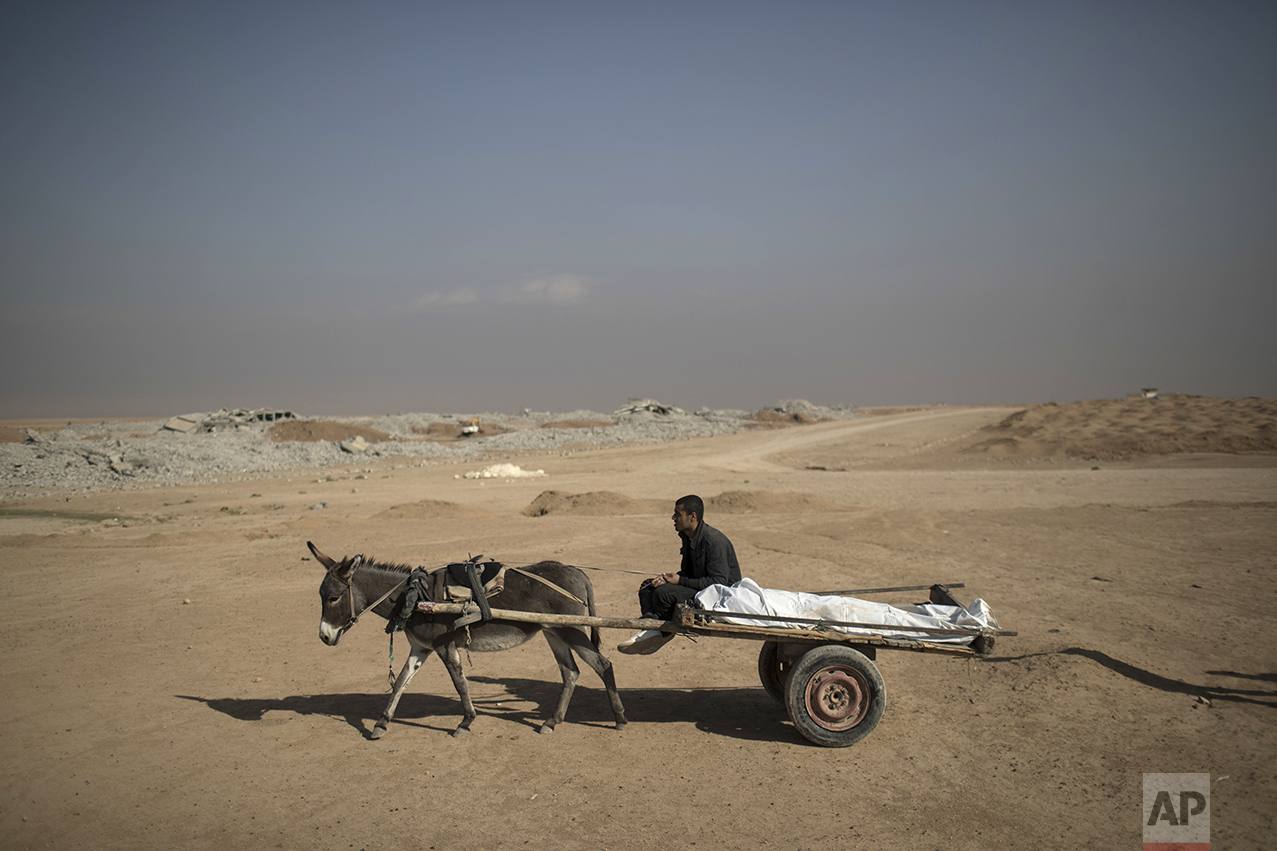Felipe Dana wins NPPA 2016 NY/International Regional Clip Photographer of the Year

NY | International Region | February 2016 | 1st Place Photo Story | Essay
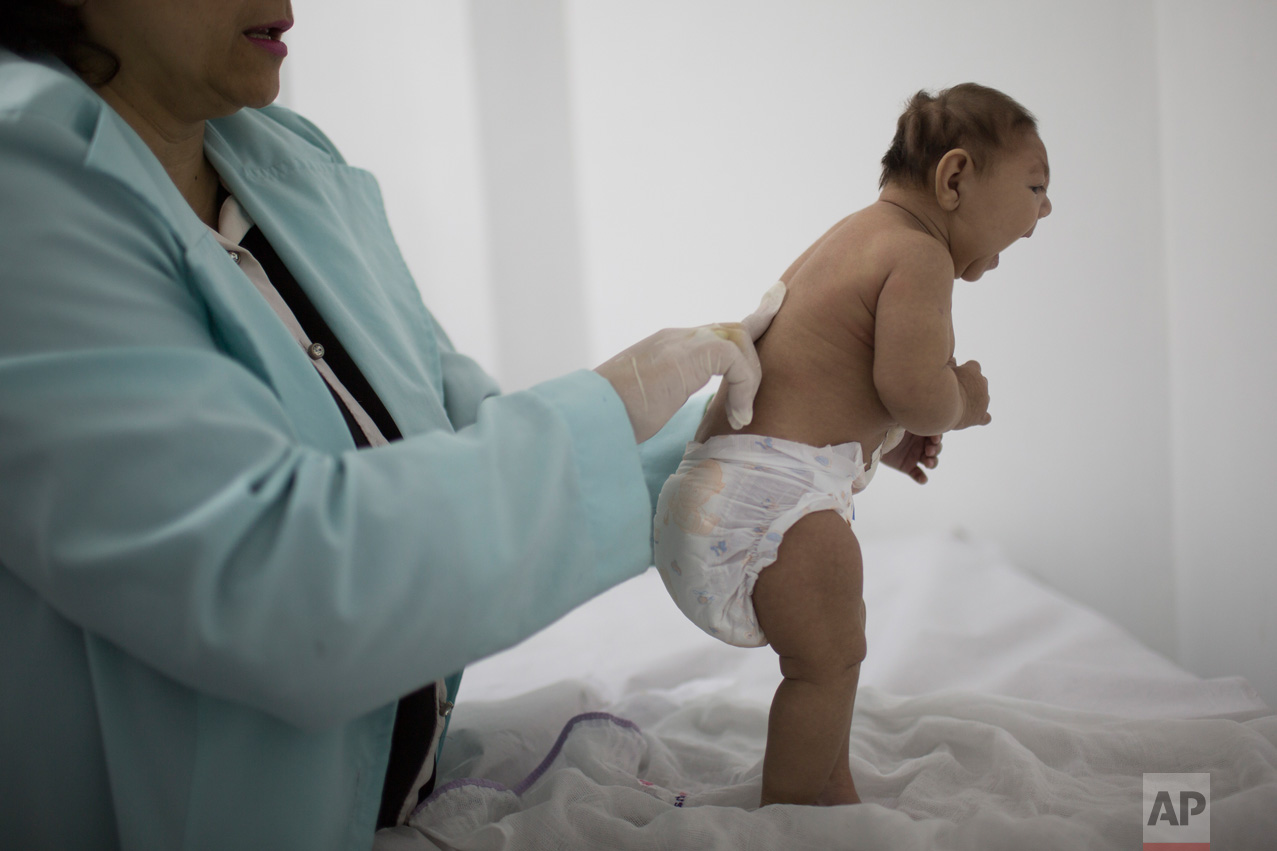
Lara, who is less then three months old and was born with microcephaly, is examined by a neurologist at the Pedro I hospital in Campina Grande, Paraiba state, Brazil, Friday, Feb. 12, 2016. Alarm in recent months over the Zika virus, which many researchers believe can cause microcephaly in the fetuses of pregnant women, has prompted calls, both inside and outside Brazil, to loosen a near-ban on abortion in the world’s most populous Catholic country. But the pro-choice push is creating a backlash, particularly among the families of disabled children. (AP Photo/Felipe Dana)
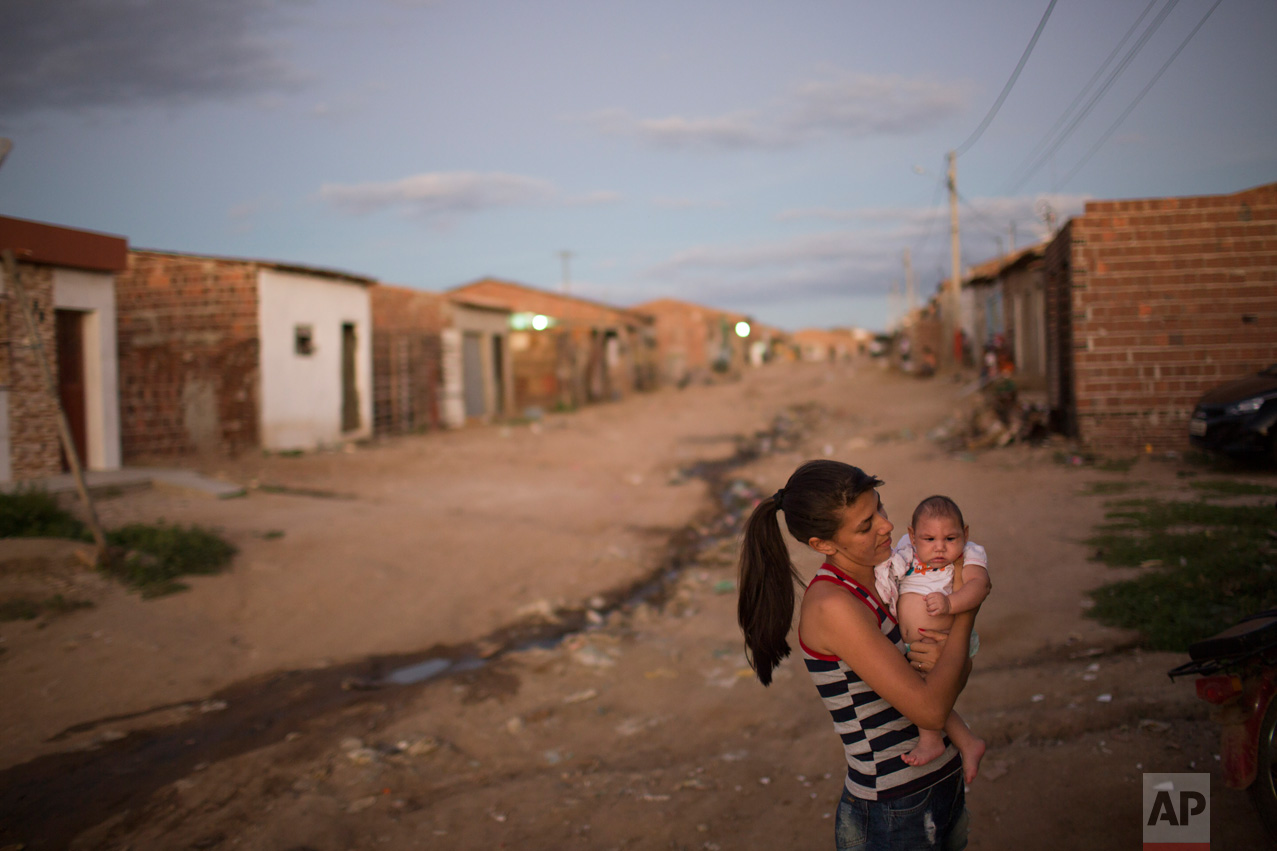
Angelica Pereira holds her daughter Luiza, who was born with microcephaly, outside her house in Santa Cruz do Capibaribe, Pernambuco state, Brazil, Saturday, Feb. 6, 2016. The Zika virus, spread by the Aedes aegypti mosquito, thrives in people's homes and can breed in even a bottle cap's-worth of stagnant water. The virus is suspected to be linked with occurrences of microcephaly in new born babies, but no link has been proven yet. (AP Photo/Felipe Dana)
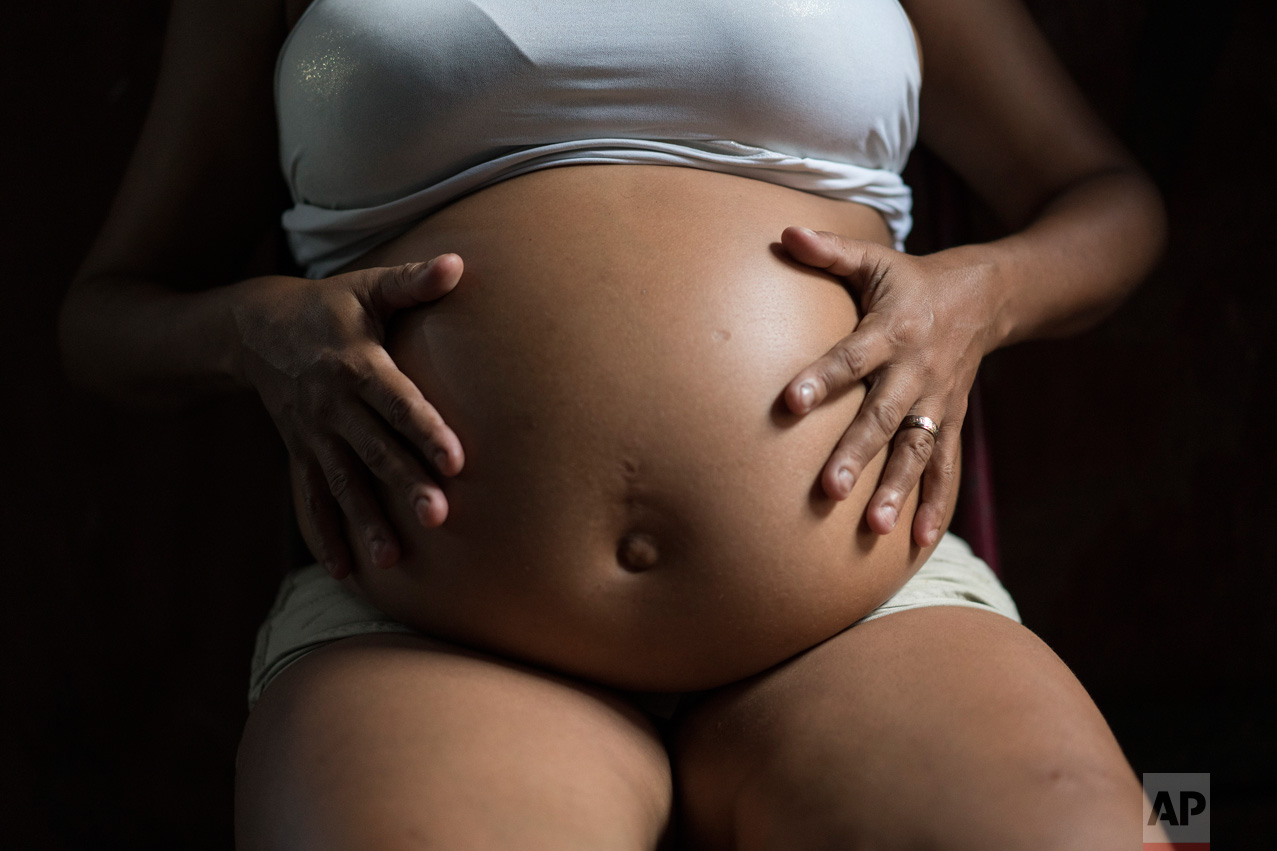
In this Feb. 5, 2016 photo, Daniele da Silva, who is seven months pregnant, poses for a photo as she sits inside her home in a slum of Recife, Brazil. Da Silva said she had Chikungunya a couple of months ago and her ultrasound scan and other exams of her baby are normal. In Zika-struck Brazil, a debate over whether to loosen the country’s strict abortion laws has sparked a backlash from the mothers of children with birth defects. (AP Photo/Felipe Dana)
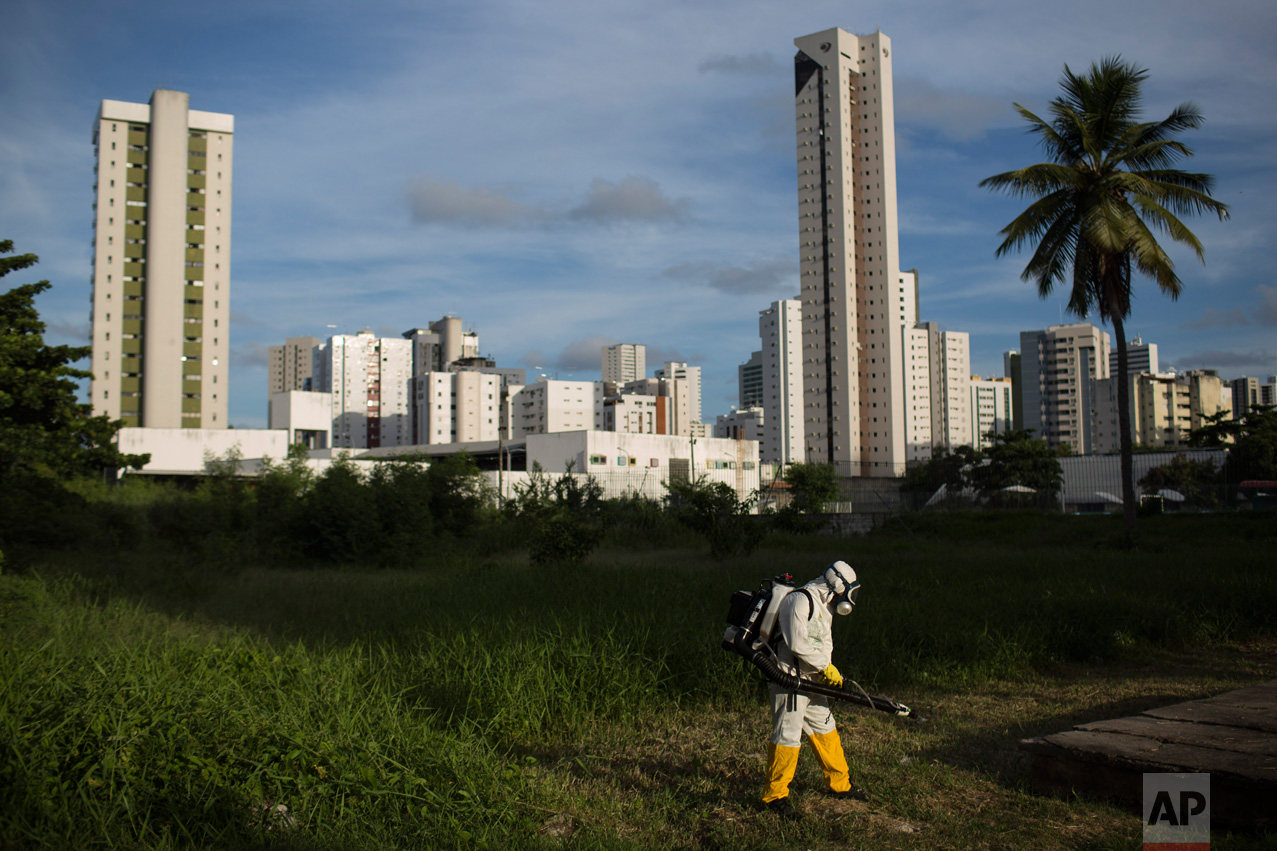
A municipal health worker sprays insecticide in an open area of a sports facility, to combat the Aedes aegypti mosquito that transmits the Zika virus, in Recife, Pernambuco state, Brazil, Thursday, Feb. 4, 2016. With no hope for a vaccine to prevent Zika in the near future, authorities are focusing on the most effective way to combat the virus: killing the mosquito that carries it. (AP Photo/Felipe Dana)
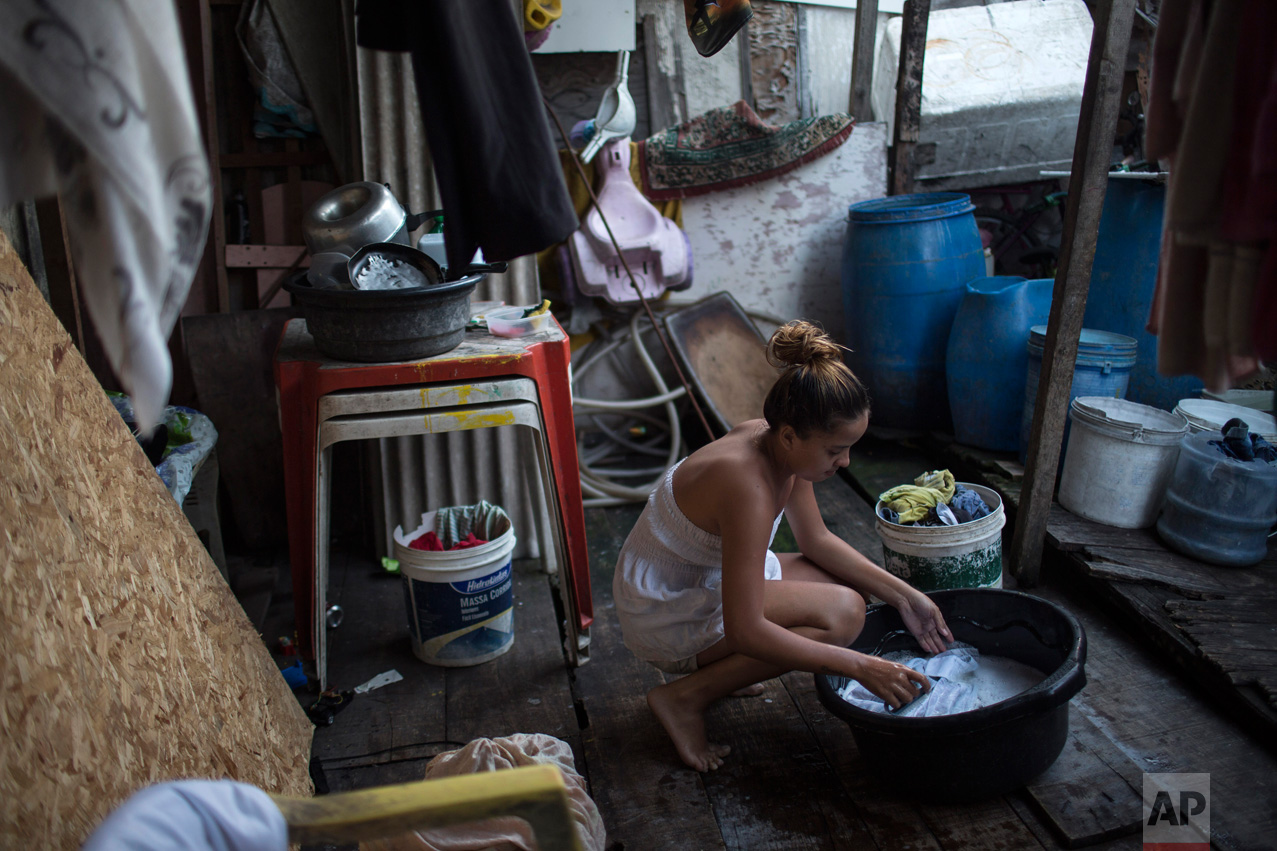
Marilia da Silva, 14, washes clothes near water storage containers, potential mosquito breeding sites, outside her house in a slum of Recife, Brazil, Friday, Feb. 5, 2016. The Zika virus, spread by the Aedes aegypti mosquito, thrives in people's homes and can breed in even a bottle cap's-worth of stagnant water. Public health experts agree that the poor are more vulnerable because they often lack amenities that help diminish the risk. (AP Photo/Felipe Dana)
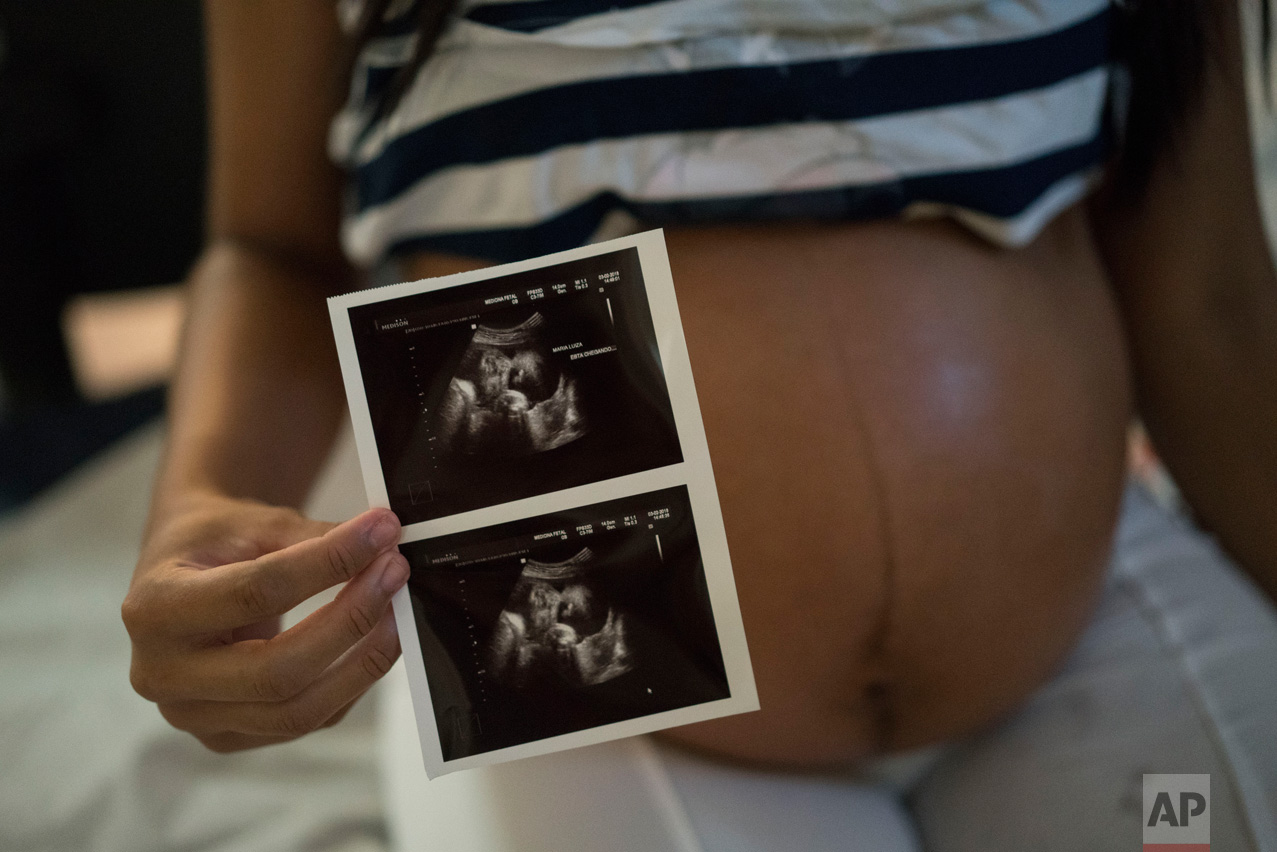
Isabela Cristina, 18, who is six months pregnant, shows a photo of her ultrasound at the IMIP hospital in Recife, Pernambuco state, Brazil, Wednesday, Feb. 3, 2016. Isabela Cristina was struck with Zika and was worried about the health of her bay, but her baby's ultrasound scan and other exams turned up normal. Brazil is in the midst of a Zika virus outbreak, spread by the Aedes aegypti mosquito, which is well-adapted to humans, thrives in people's homes and can breed in even a bottle cap's-worth of stagnant water. The virus is suspected to be linked with occurrences of microcephaly in new born babies. (AP Photo/Felipe Dana)
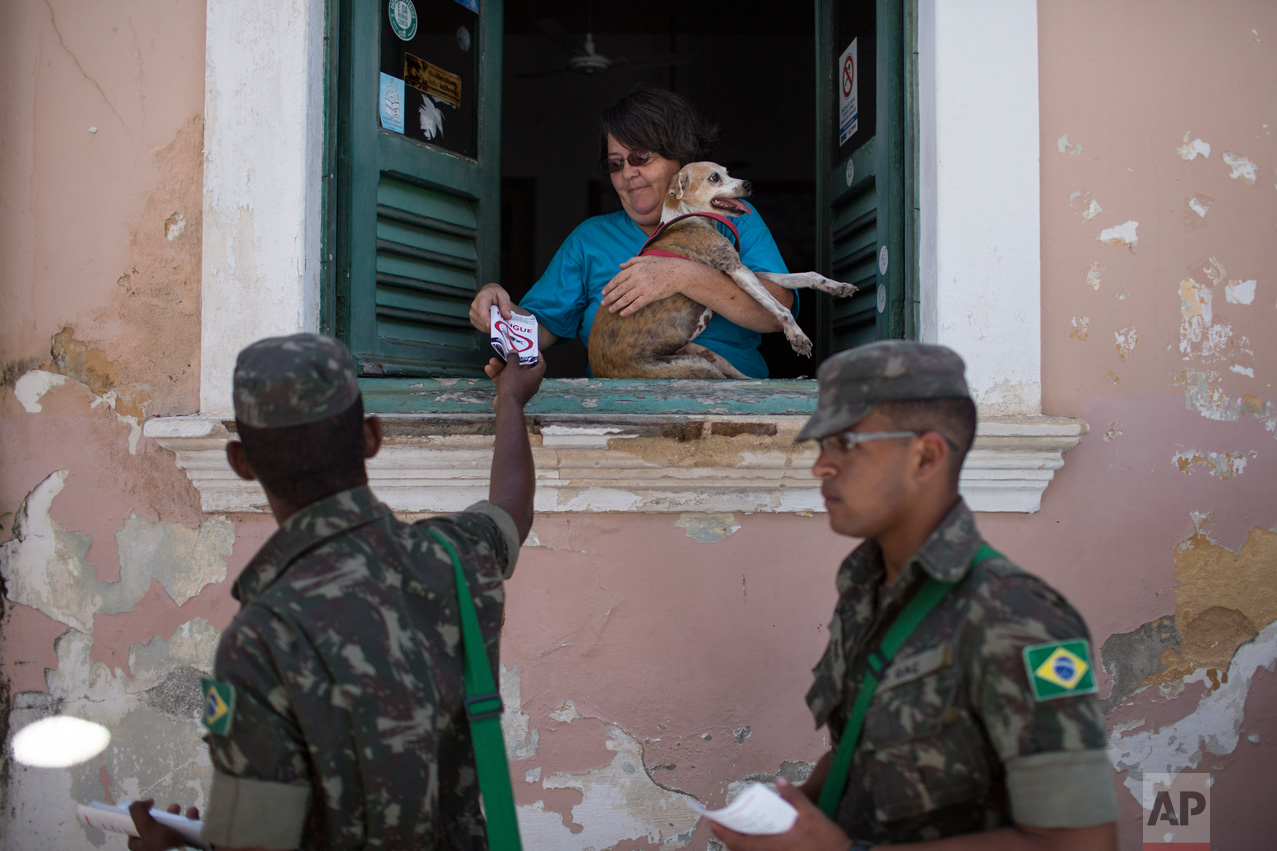
Brazilian Army soldiers distribute flyers with information on how to combat the Aedes aegypti during the "Burial of the Mosquito" carnival block parade in Olinda, Pernambuco state, Brazil, Friday, Feb. 5, 2016. The parade that happens every year during carnival informs residents and tourists about the dangers of the Aedes aegypti and teaches them how to combat the mosquitoes. (AP Photo/Felipe Dana)
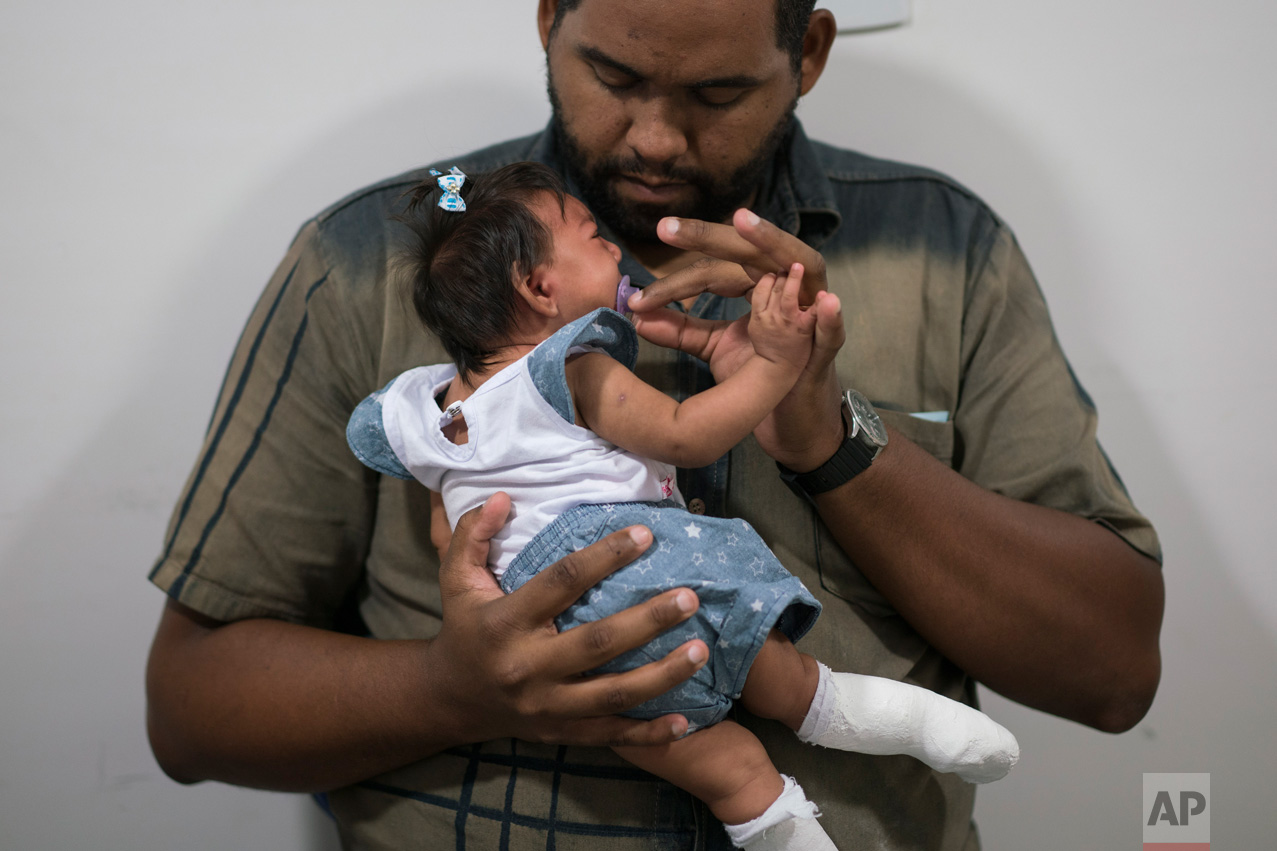
Laurinaldo Alves adjusts the pacifier of his daughter Luana Vitoria, who suffers from microcephaly, during a physical stimulation session at the Altino Ventura foundation, a treatment center that provides free health care, in Recife, Pernambuco state, Brazil, Thursday, Feb. 4, 2016. Brazil is in the midst of a Zika outbreak and authorities say they have also detected a spike in cases of microcephaly in newborn children, but the link between Zika and microcephaly is as yet unproven. (AP Photo/Felipe Dana)
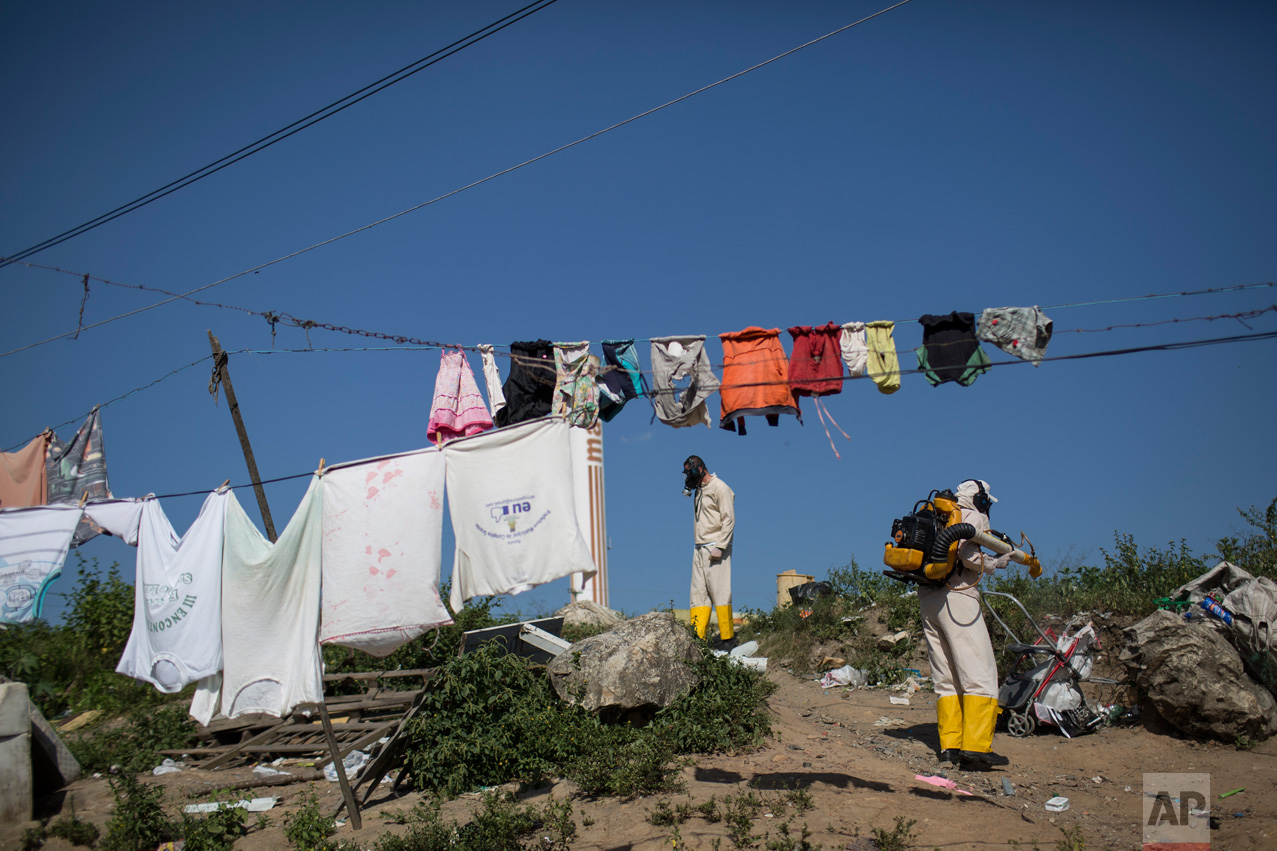
A municipal health worker sprays insecticide to combat the Aedes aegypti mosquito that transmits the Zika virus, in Campina Grande, Paraiba state, Brazil, Friday, Feb. 12, 2016. The Zika virus, spread by the Aedes aegypti mosquito, thrives in people's homes and can breed in even a bottle cap's-worth of stagnant water. The virus is suspected to be linked with occurrences of microcephaly in new born babies, but no link has been proven yet. (AP Photo/Felipe Dana)









"A very well done look that is encompassing of this heartbreaking story." - NPAA Judges
Judges: Kathy Plonka/Spokesman-Review, Liz Kishimoto/Spokesman-Review, Brian Plonka/brianplonka.com
NY | International Region | May 2016 | 1st Place Photo Story | Essay
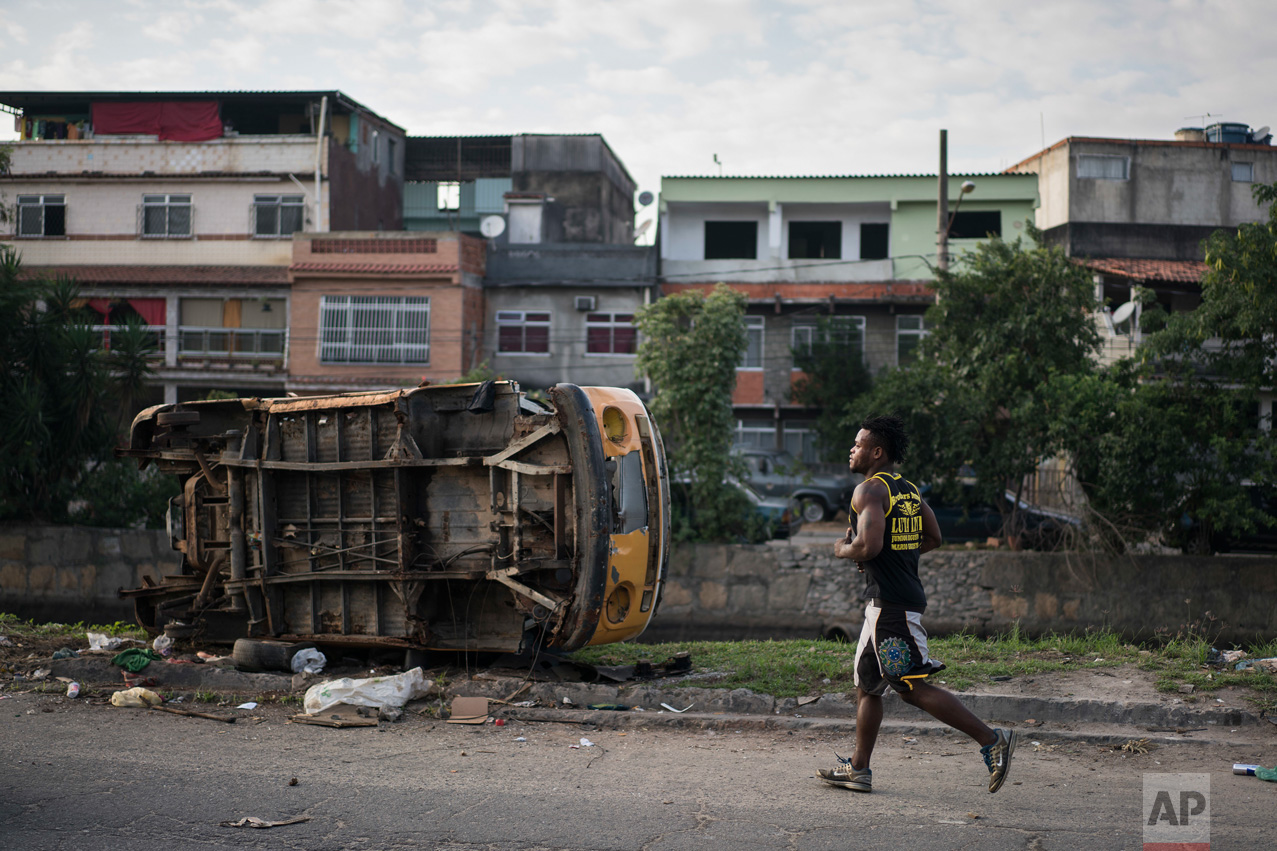
In this May 27, 2016 photo, Popole Misenga, a refugee and judo athlete from the Democratic Republic of Congo, jogs near his home in Rio de Janeiro, Brazil, as he trains in hopes of making the cut for the first Olympic team of refugee athletes. Misenga is one of two judo athletes from Congo who say the chance to be part of history feels like a form of vindication, a collective recognition of both the suffering and aspirations of refugees everywhere. (AP Photo/Felipe Dana)
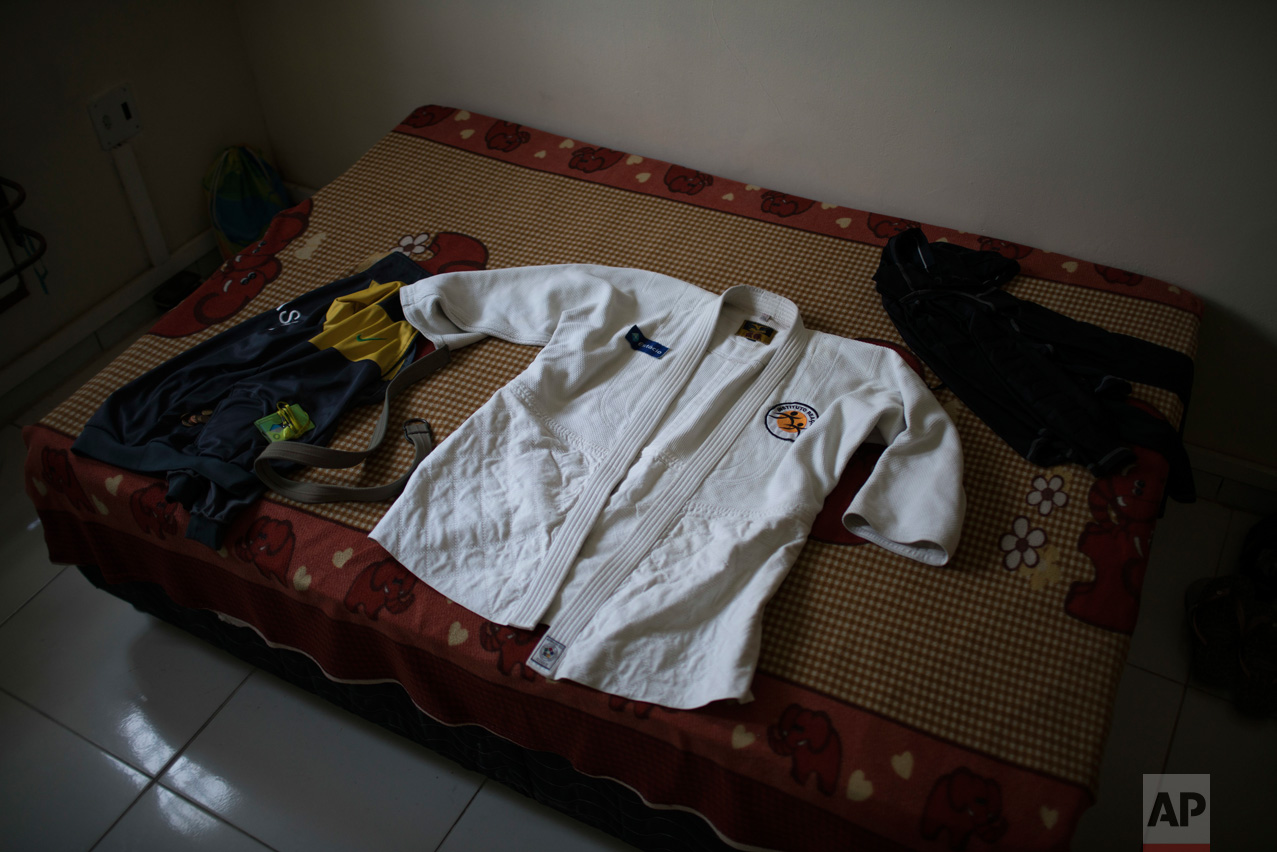
In this May 28, 2016 photo, the judo gi of Yolande Mabika, a refugee from the Democratic Republic of Congo, sits on her bed after she cleaned it at her newly rented apartment in Rio de Janeiro, Brazil. Mabika is hopeful that she will be part of the first ever team competing in the Olympic Games under the Olympic flag, instead of any one country. This week, the two hopefuls will find out whether they made the cut. (AP Photo/Felipe Dana)
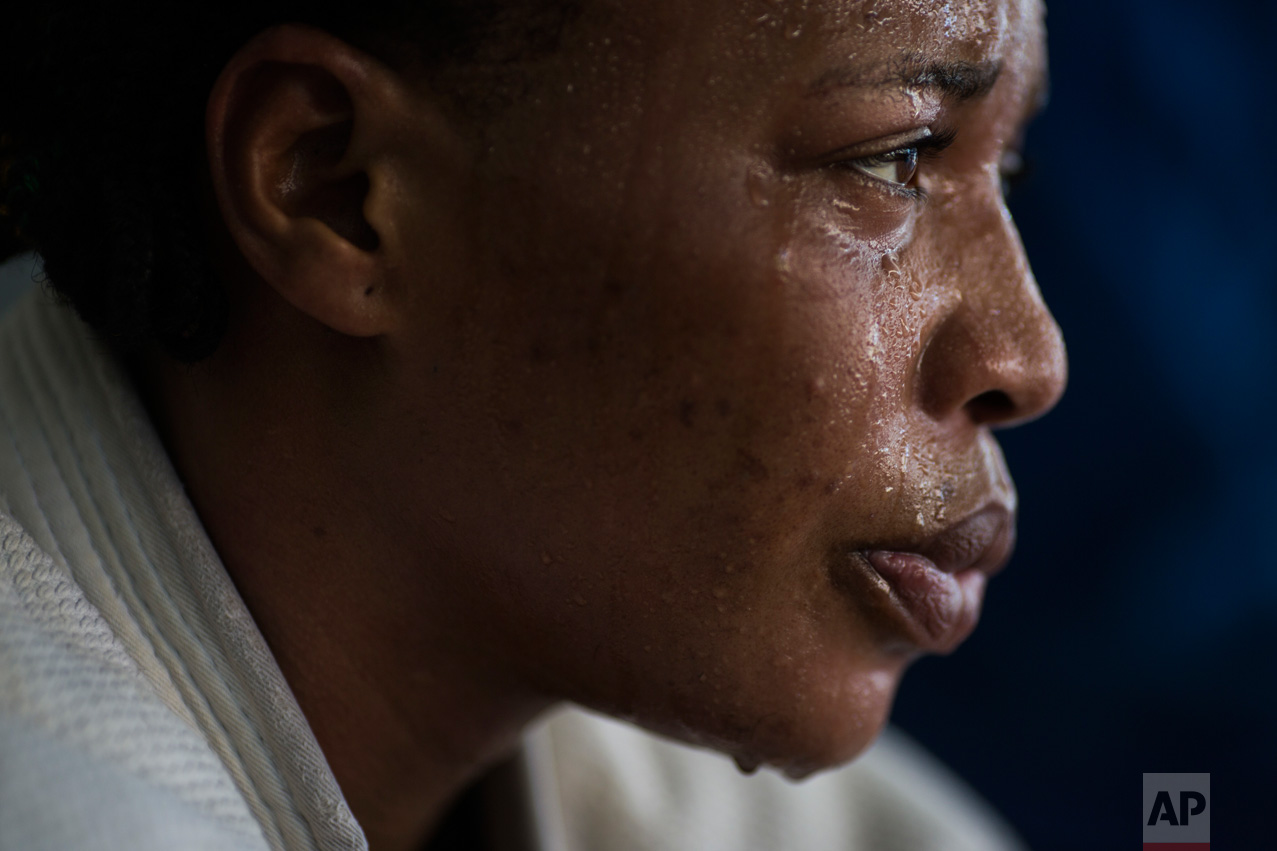
In this May 26, 2016 photo, Yolande Mabika, a refugee from the Democratic Republic of Congo, takes a break during Judo training at the Reacao Institute in Rio de Janeiro, Brazil, as she trains in hopes of making the cut for the first Olympic team of refugee athletes. In 2013, Mabika and another judo athlete from Congo traveled to Brazil with the team to compete at the World Judo Championships. They say officials left them at their downtown Rio hotel for three days prior to the competition without food, money or passports. (AP Photo/Felipe Dana)
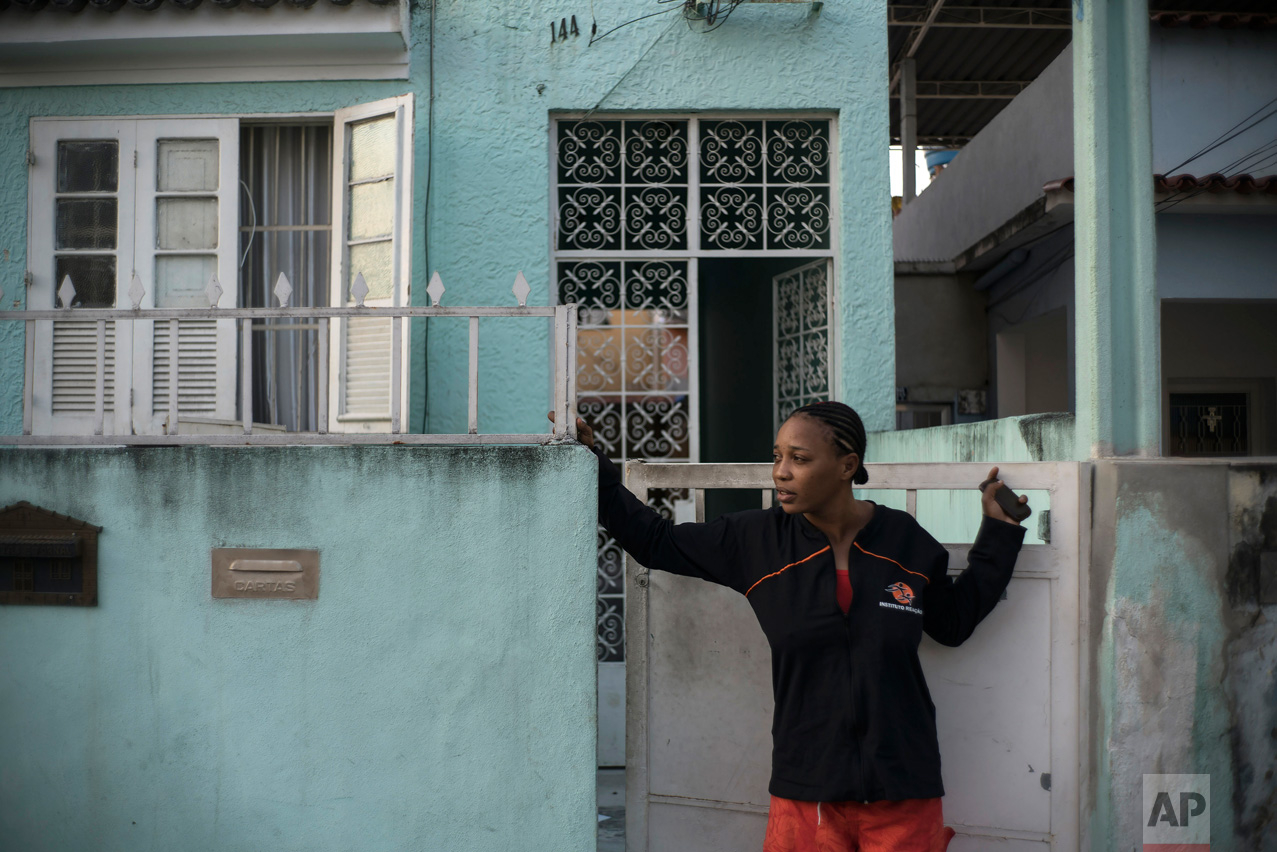
In this May 28, 2016 photo, Yolande Mabika, a refugee and judo athlete from the Democratic Republic of Congo who hopes to join the first Olympic team of refugee athletes, stands at the entrance of her newly rented apartment in Rio de Janeiro, Brazil. A member of Congo's national judo federation, Mabika says that training was harsh and failure to win medals meant punishments, including stints inside a cell with little food or water for days. (AP Photo/Felipe Dana)
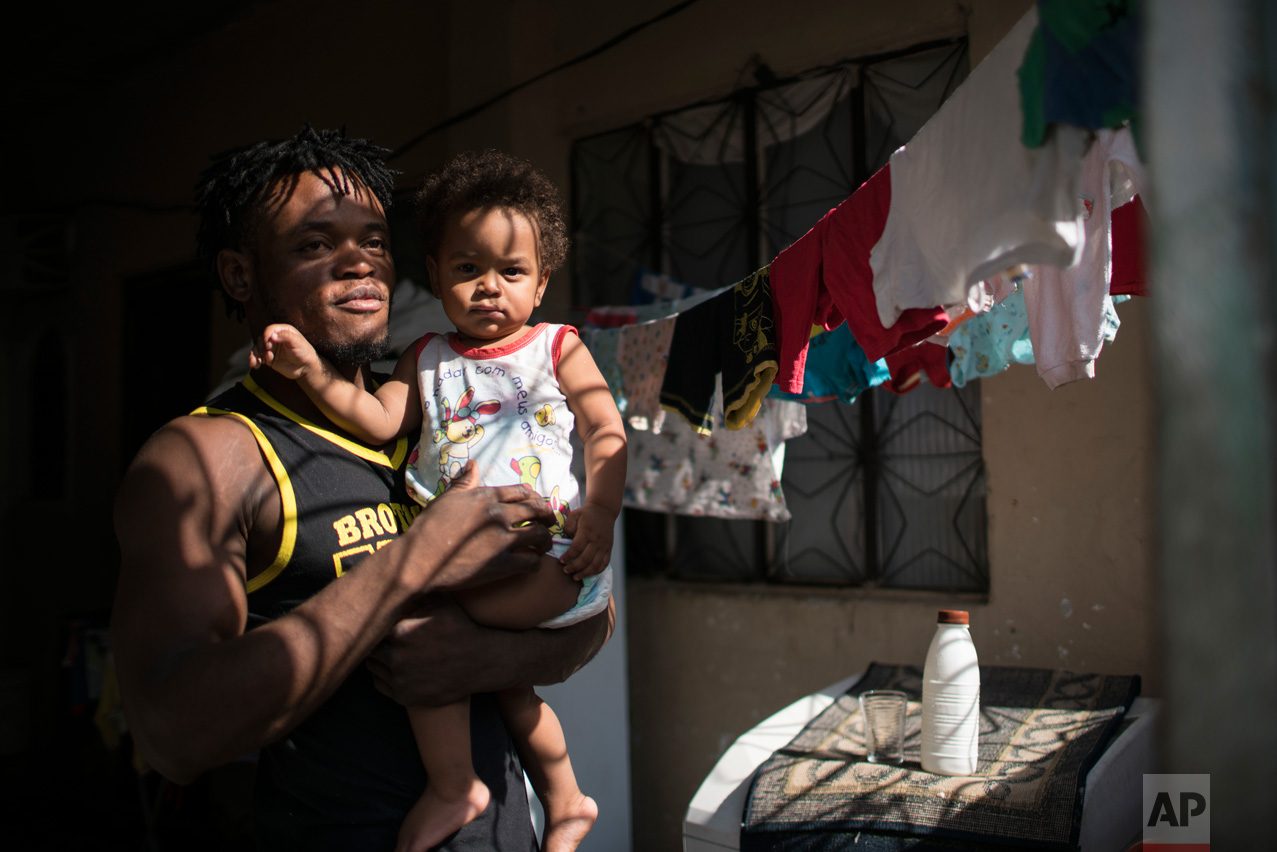
In this May 27, 2016 photo, Popole Misenga, a refugee and judo athlete from the Democratic Republic of Congo who hopes to make the cut for the first Olympic team of refugee athletes, holds his one-year-old son Elias at their home in Rio de Janeiro, Brazil. Misenga fled his war-torn hometowns as a child. Civil strife in the central African nation has caused the deaths of several million people since the mid-1990s. (AP Photo/Felipe Dana)
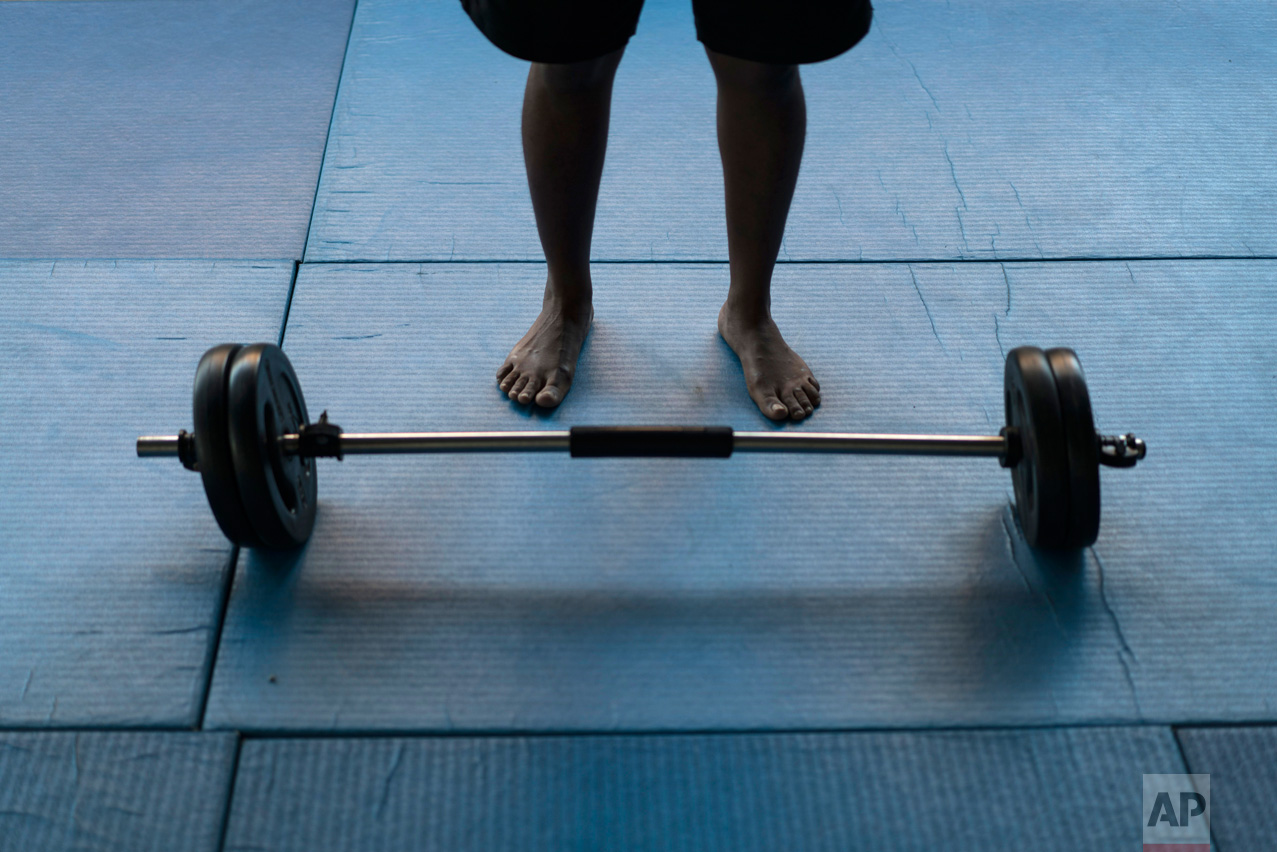
In this May 27, 2016 photo, Yolande Mabika, a refugee and judo athlete from the Democratic Republic of Congo, prepares to lift weights at the Reacao Institute in Rio de Janeiro, Brazil, as she trains in hopes of making the cut for the first Olympic team of refugees. In 2013 Mabika competed at the World Judo Championships, where she says officials left them at their hotel for three days prior to the competition without food, money or passports, leading her to apply for asylum in Brazil. "A few days before our fight, I was very, very hungry. I almost died," said Mabika, who is 28. (AP Photo/Felipe Dana)
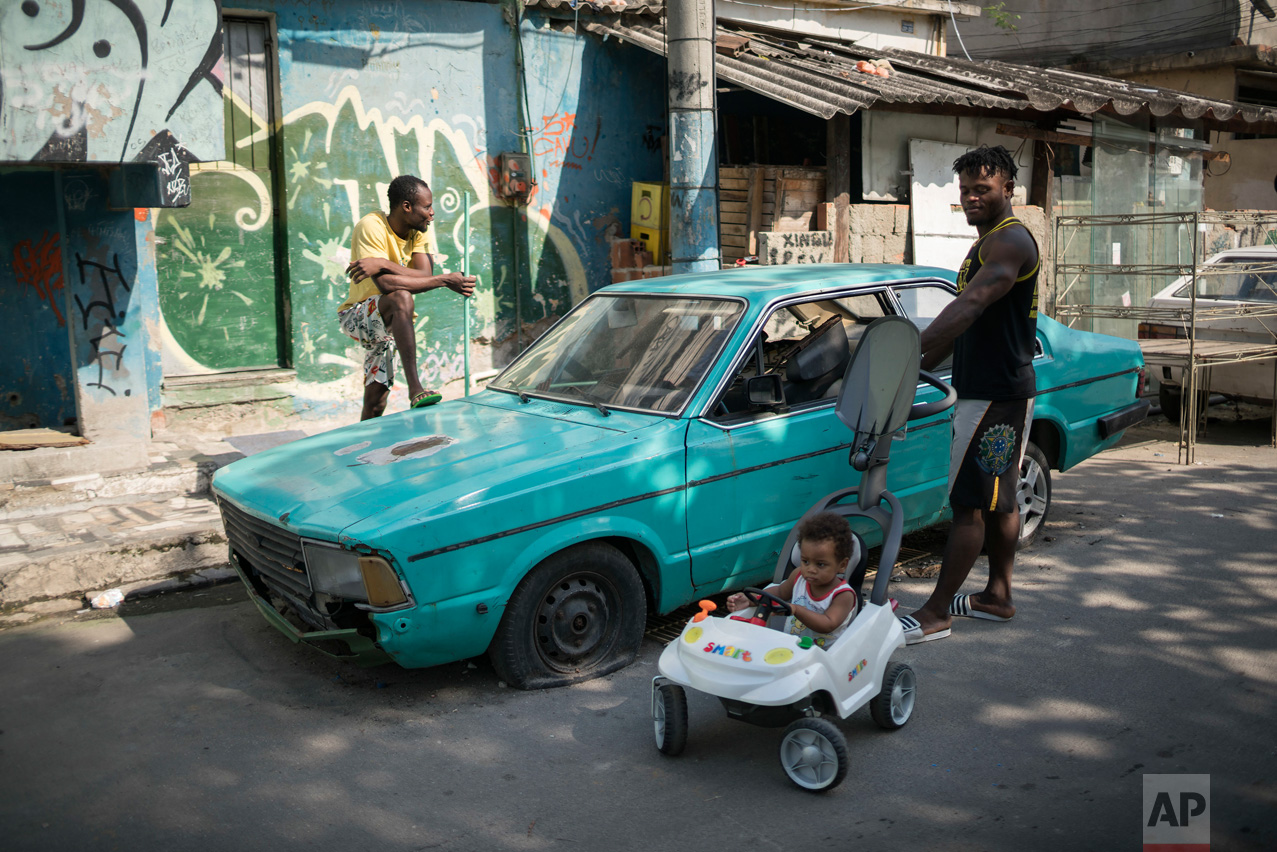
In this May 27, 2016 photo, Popole Misenga, a refugee and judo athlete from the Democratic Republic of Congo who hopes to make the cut for the Olympics first refugee team, talks to a Congolese neighbor as he walks with his one-year-old son Elias in Rio de Janeiro, Brazil. The International Olympic Committee is expected to name members of the Team Refugee Olympic Athletes during its June 1 - 3 meeting. The team will compete under the Olympic flag instead of any one country. (AP Photo/Felipe Dana)
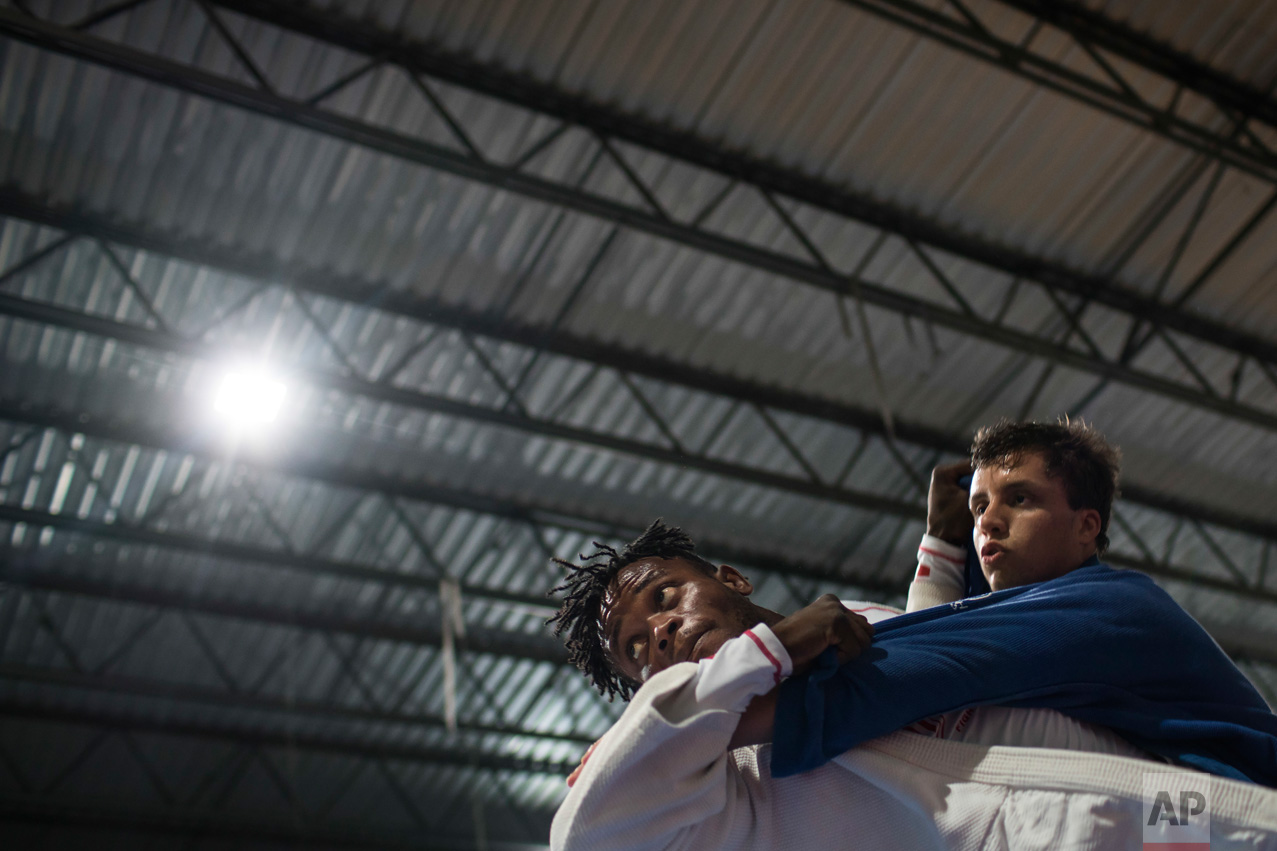
In this May 27, 2016 photo, Popole Misenga, a refugee from the Democratic Republic of Congo, left, practices judo in hopes of making the cut for an Olympic team of refugee athletes, at the Reacao Institute in Rio de Janeiro, Brazil. With the help of the Reacao charity, Misenga has daily judo classes and cross-training just like Brazilian athletes preparing for the Olympics. (AP Photo/Felipe Dana)
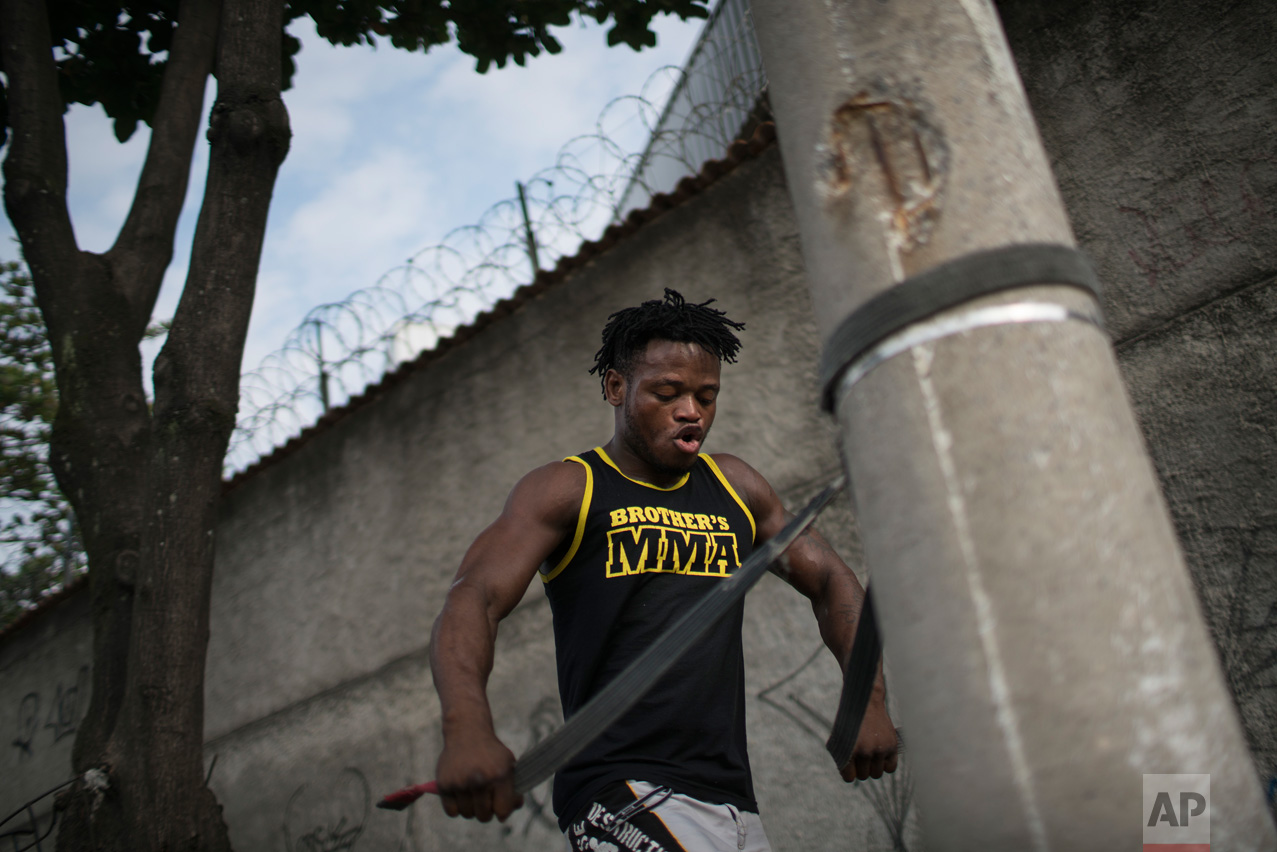
In this May 27, 2016 photo, Popole Misenga, a refugee and judo athlete from the Democratic Republic of Congo, uses a judo black belt attached to a street light pole to trains near his home in Rio de Janeiro, Brazil, in hopes of making the first Olympic refugee team. "For me, this is incredible because a refugee has never participated in the Olympics before," said Misenga, 24. "The whole world will be watching." (AP Photo/Felipe Dana)
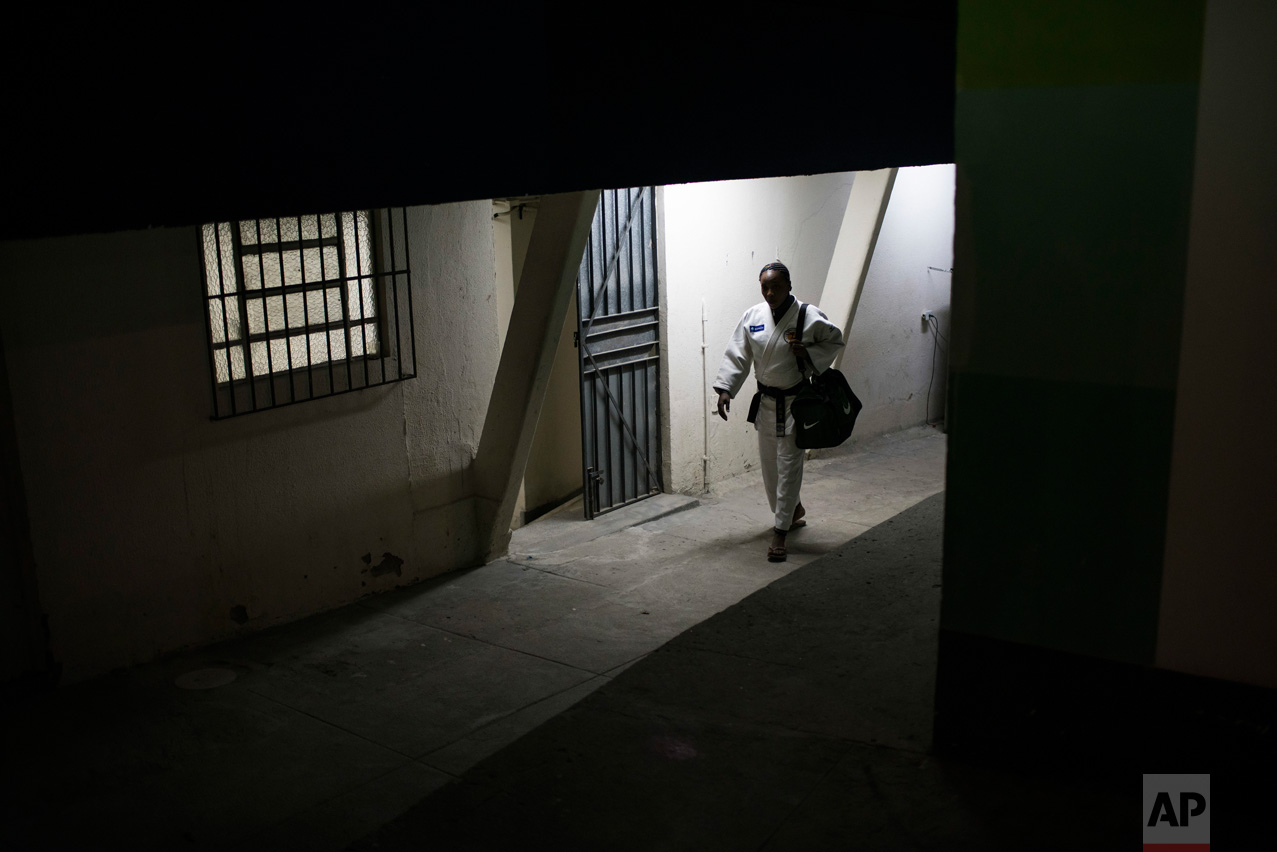
In this May 27, 2016 photo, Yolande Mabika, a refugee from the Democratic Republic of Congo, walks to judo training at the Reacao Institute in Rio de Janeiro, Brazil, in hopes of making the cut for the first Olympic refugee team. Getting to the point of possibly competing in the Summer Games this August in Rio de Janeiro has been a long road. (AP Photo/Felipe Dana)










"Only two entries in this category and both were well shot. First place is a very strong entry." - NPPA Judges
Judges: Jennifer Reynolds, Photography Editor, Stuart Villanueva, Staff Photographer, Kevin M. Cox, Media & Technology Director. Melissa Rivera, Creative Services Manager/The Galveston County Daily News
New York International Region | July 2016 | 2nd Place Spot News
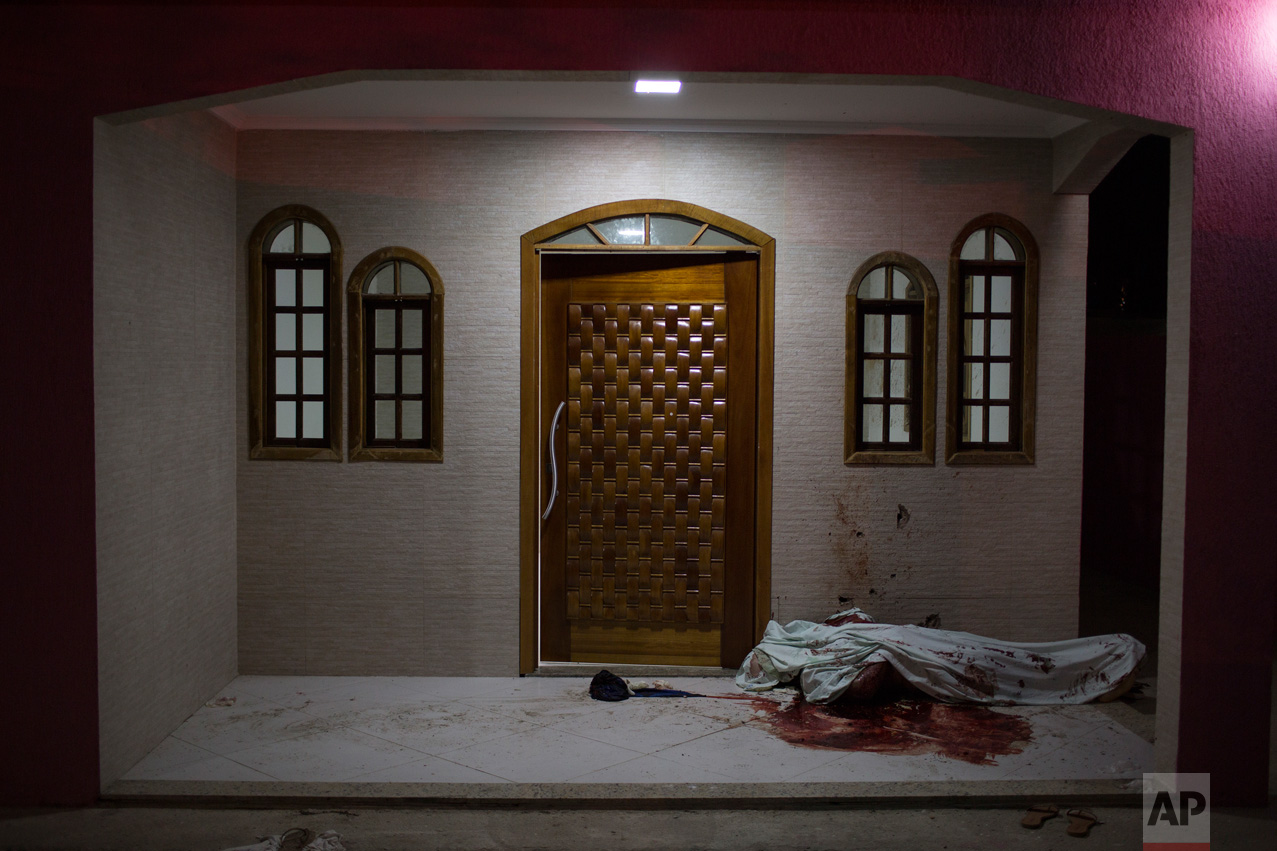
This July 13, 2016 photo shows a crime scene at the entrance of a home in Nova Iguacu, greater Rio de Janeiro, Brazil. The man who lived there with his family was removed by gunmen and killed on the spot. Police believe the killing was a gang hit related to a change of leadership in the area. On the eve of hosting the world's largest sporting event, Rio's decade-long push to curb violence in hundreds of slums appears to be crumbling. Overall murders are on the rise in the first half of 2016. (AP Photo/Felipe Dana)
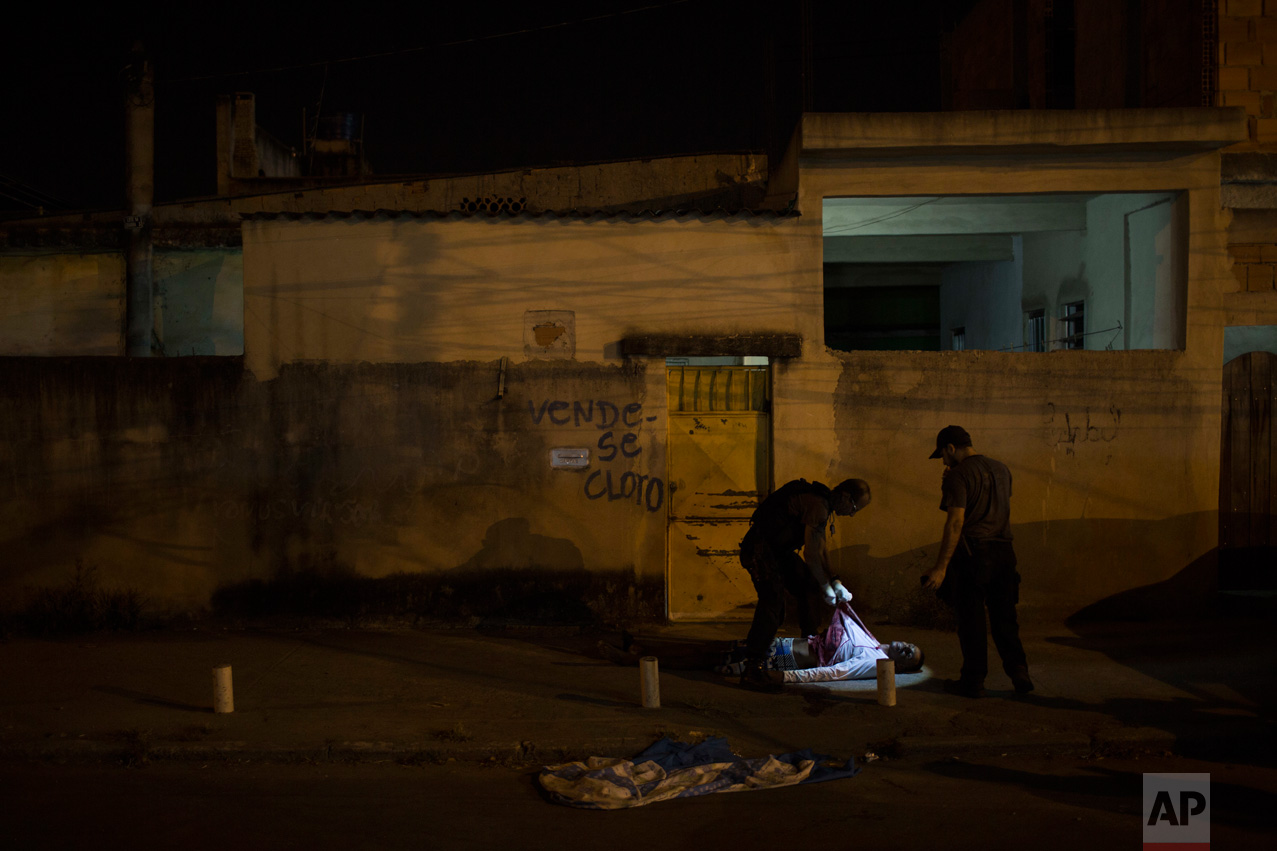
In this July 16, 2016 photo, police responding to a call find the body of a young black man in the middle of a residential street in Caxias, greater Rio de Janeiro, Brazil. Rio's ambitious security push to bring crime down and seize control of certain slums ahead of the 2016 Summer Games is crumbling. Overall slayings are on the rise in 2016, the victims overwhelmingly young, black men. (AP Photo/Felipe Dana)
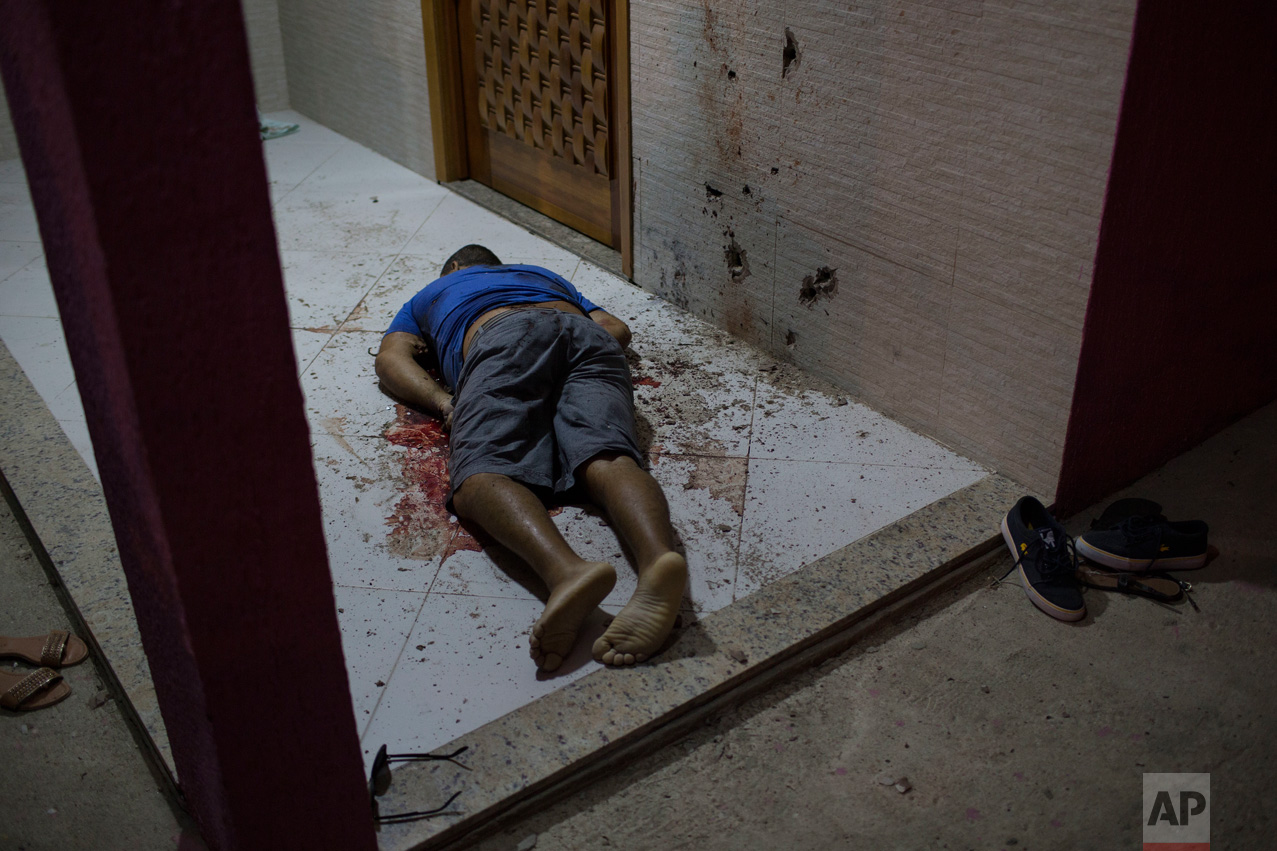
This July 13, 2016 photo shows the body of a man who was taken from the inside of his home and shot dead at the entrance of his home in Nova Iguacu, greater Rio de Janeiro, Brazil. Scenes of impunity and violence play out daily in many of Rio's hundreds of slums, known here as favelas, and other outlying areas. Police believe this homicide was gang-related. (AP Photo/Felipe Dana)
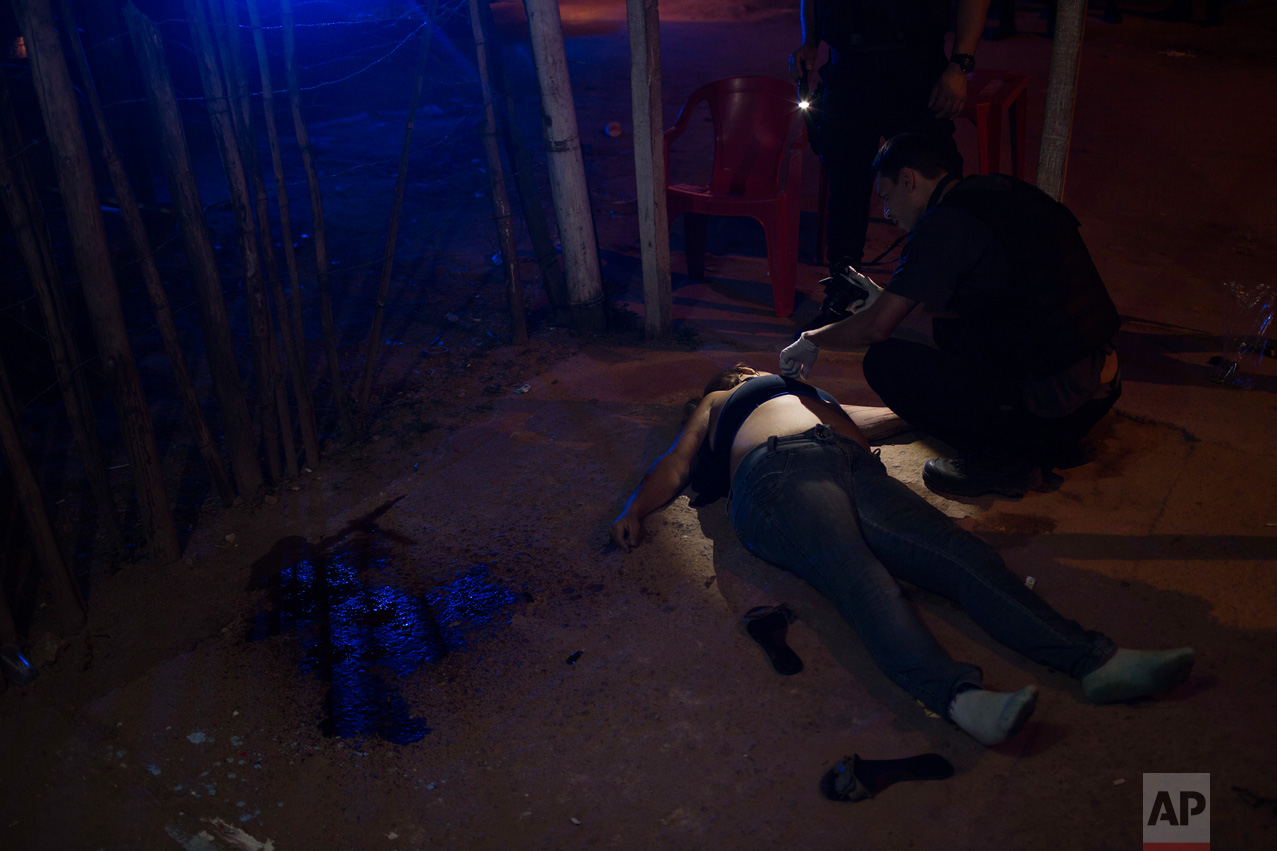
In this July 13, 2016 photo, a police officer photographs the body of homicide victim Aga Lopes Pinheiro, a pre-candidate for local council in Mage, in greater Rio de Janeiro, Brazil. According to local news reports the 49-year-old was shot by four gunmen while in a bar with a friend and her partner. Lopes is the 11th politician murdered in the greater Rio area since November, while police have not been able to determine the motives for the killings. (AP Photo/Felipe Dana)
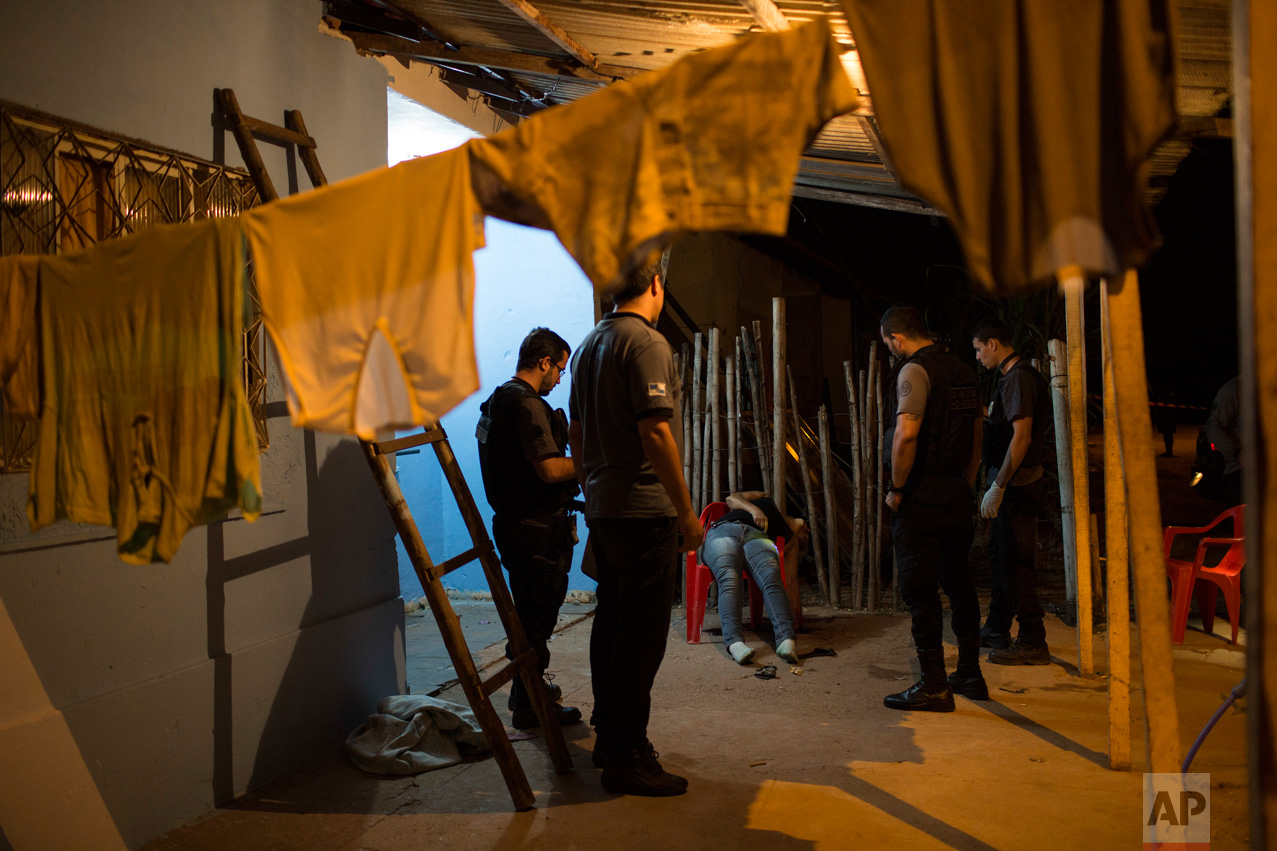
In this July 13, 2016 photo, police investigate the crime scene where Aga Lopes Pinheiro, a pre-candidate for local council, was shot dead in Mage, in greater Rio de Janeiro, Brazil. According to local news reports, the 49-year-old was shot by four gunmen while in a bar with a friend and her partner. Lopes is the 11th politician murdered in the greater Rio area since November. Police have not been able to determine the motives for the killings. (AP Photo/Felipe Dana)
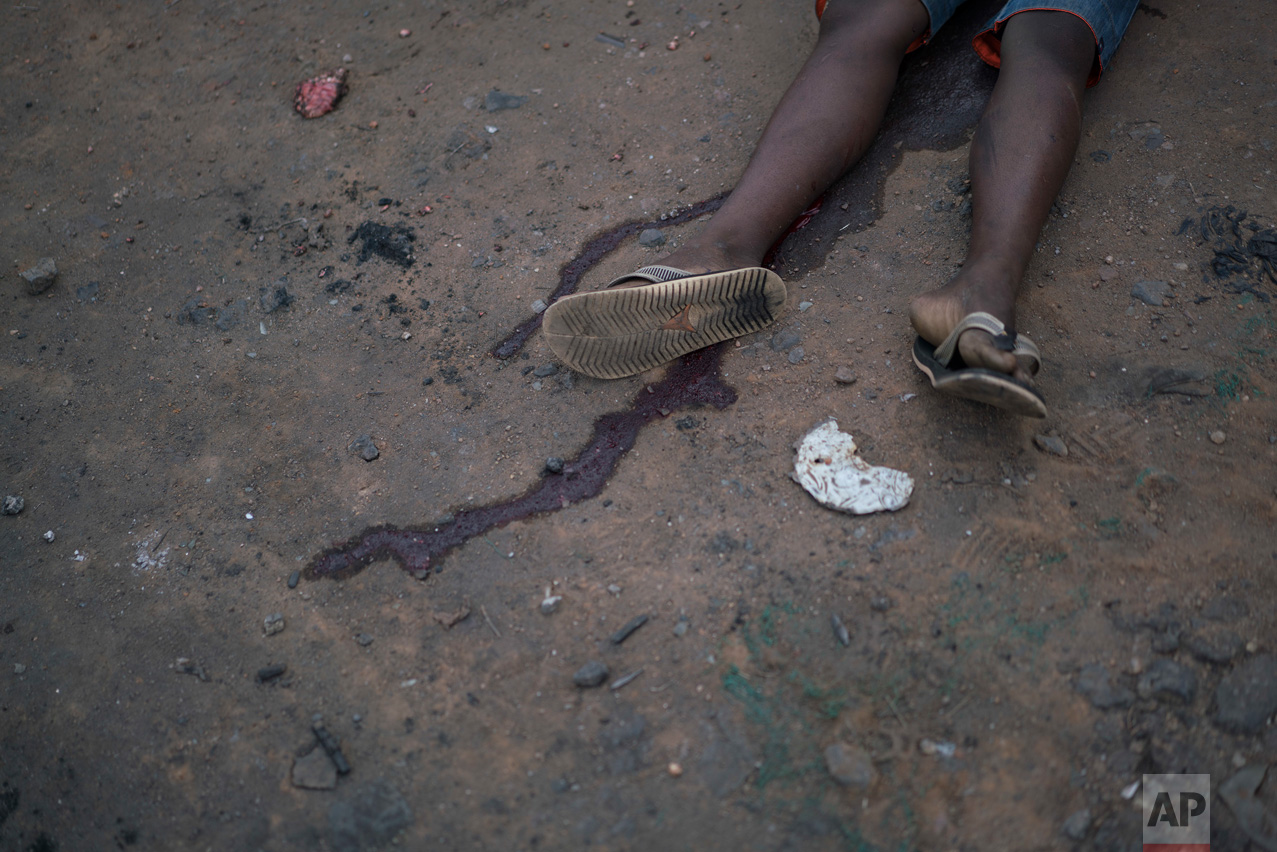
This June 30, 2016 photo shows the body of a teenage boy who was killed while walking outside of his home turf in a gang controlled area of Rio de Janeiro, Brazil. Later in the day, according to residents, the father went to denounce his son's death to the gang and was shot dead. Overall murders are on the rise in the first half of 2016 say officials, and the victims are overwhelmingly young, black men. (AP Photo/Felipe Dana)






Judges: Jeff Gammons, Brandon Walker
New York International Region | August 2016 | 3rd Place Sports Feature
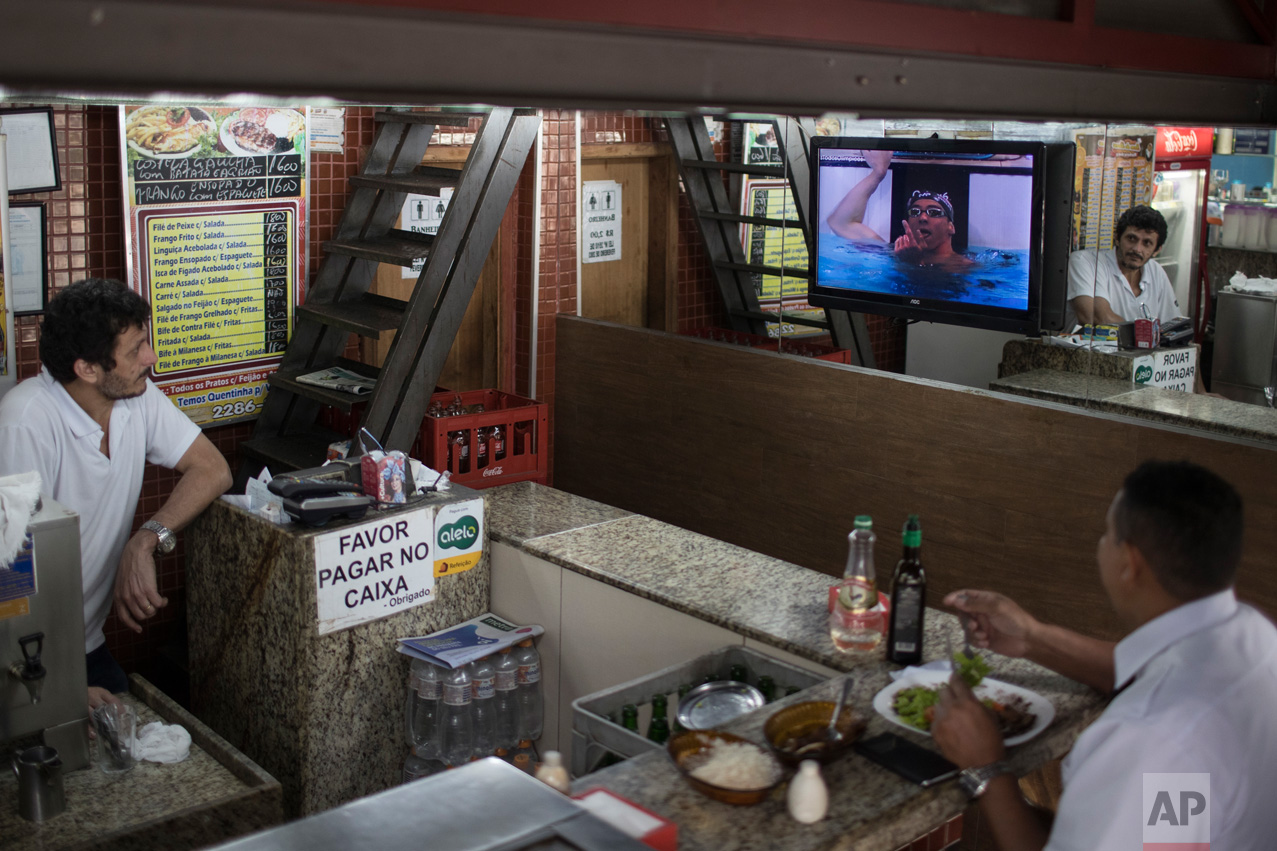
People watch on a television United States' Michael Phelps during the swimming competitions at the 2016 Summer Olympics in Rio de Janeiro, Brazil, Wednesday, Aug. 10, 2016. (AP Photo/Felipe Dana)
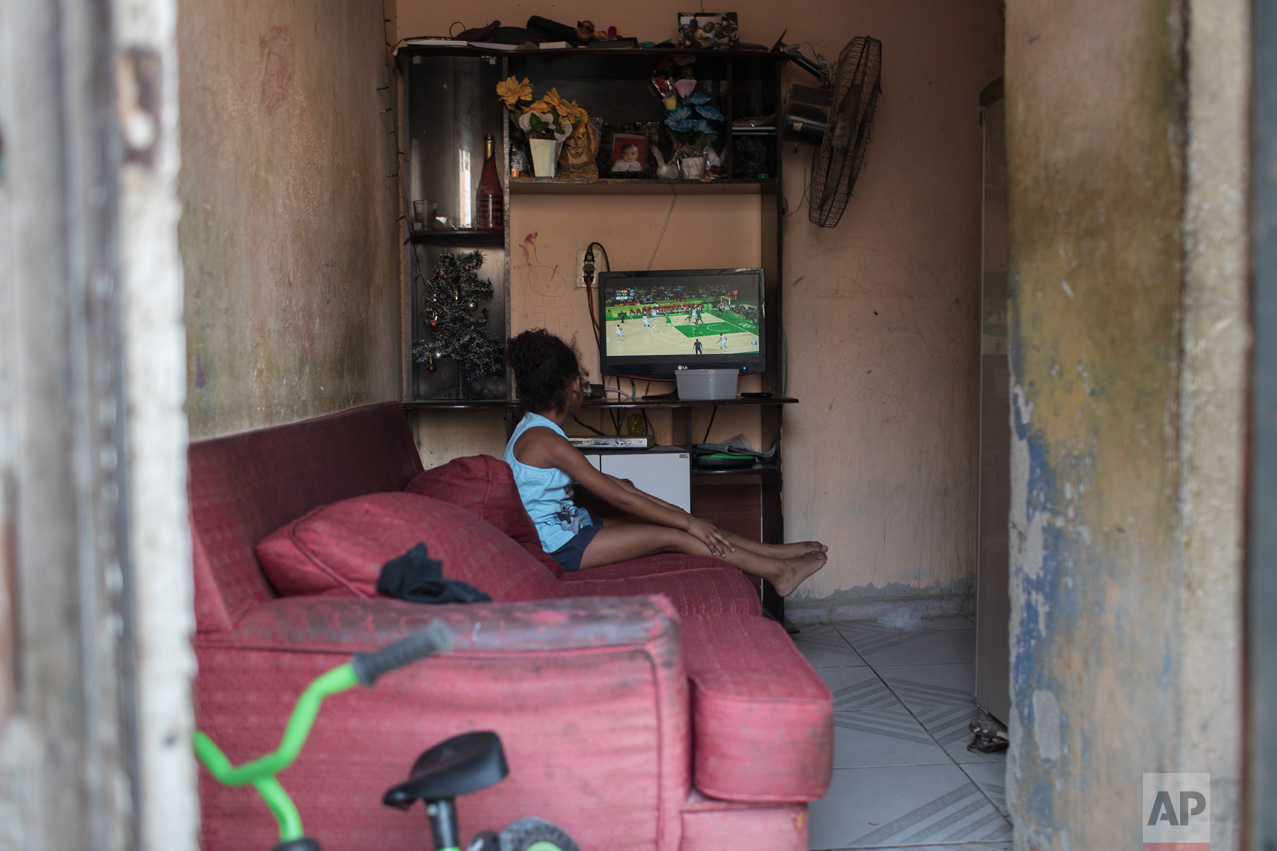
A girl watches on a television the men's basketball game between Brazil and Spain at the 2016 Summer Olympics in Rio de Janeiro, Brazil, Tuesday, Aug. 9, 2016. (AP Photo/Felipe Dana)
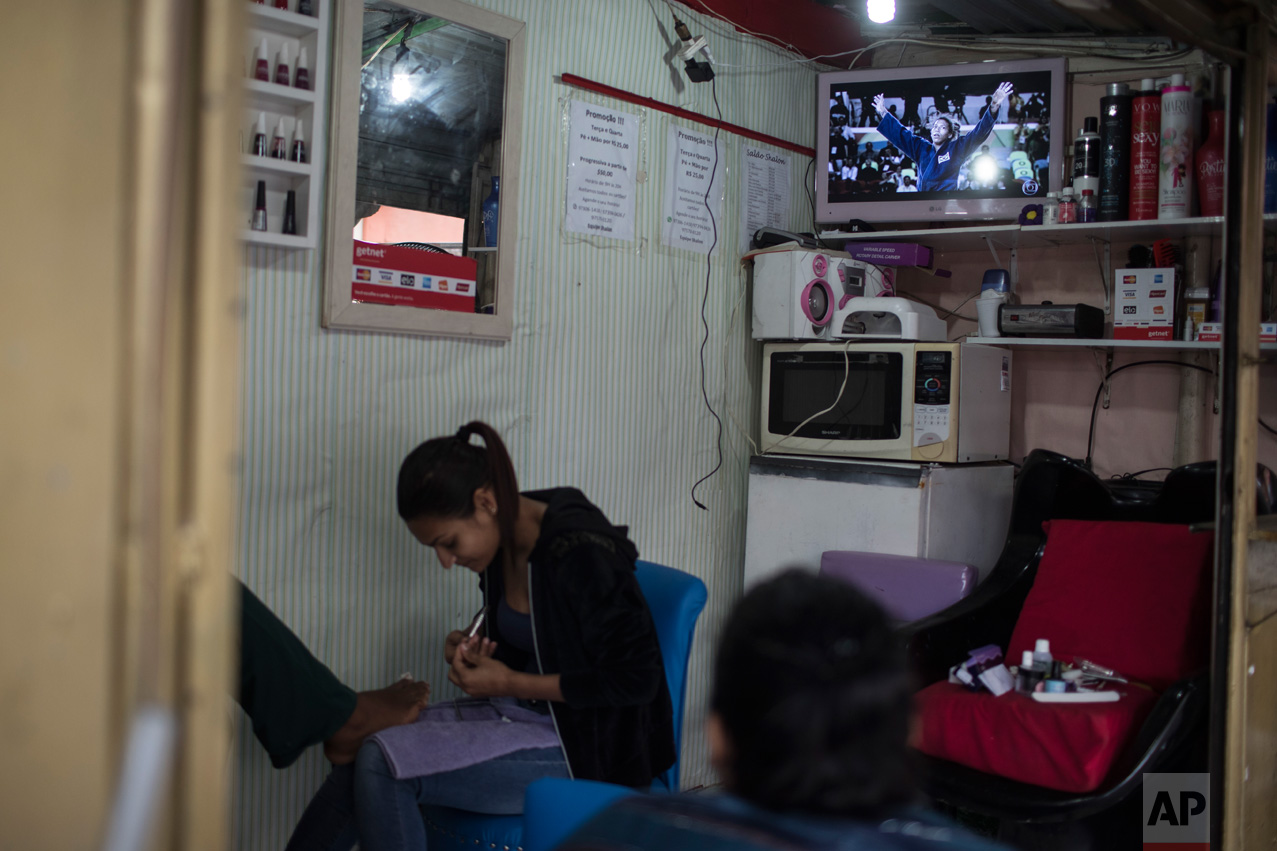
A woman gets her nails done as she watches news about Brazilian judo gold medallist Rafaela Silva during the 2016 Summer Olympics in Rio de Janeiro, Brazil, Wednesday, Aug. 10, 2016. (AP Photo/Felipe Dana)
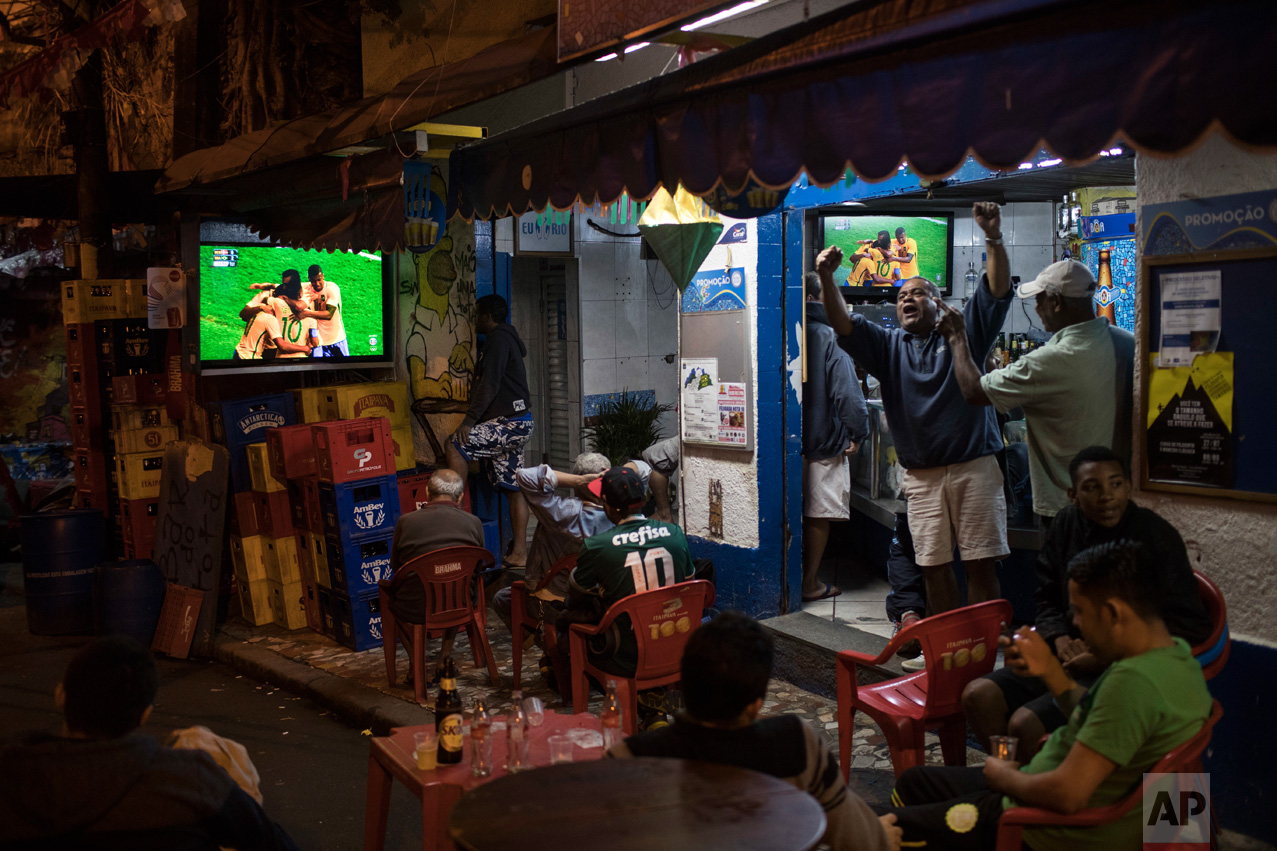
People celebrate after Brazil scored a goal against Denmark during the men's Olympic football tournament at the 2016 Summer Olympics while watching the live transmission at a bar in Rio de Janeiro, Brazil, Wednesday, Aug. 10, 2016. (AP Photo/Felipe Dana)
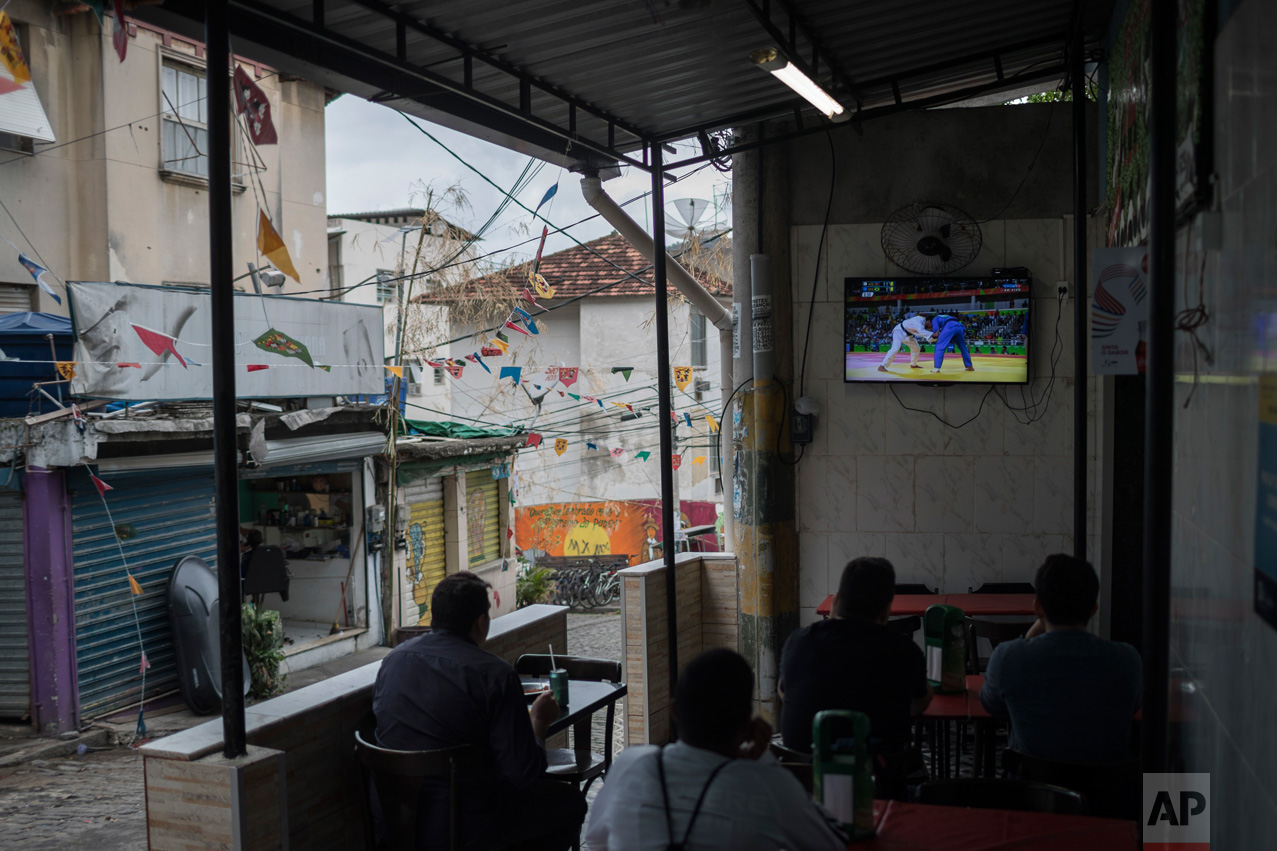
People watch on a television the men's judo competition at at the 2016 Summer Olympics as they sit for lunch at the Dona Marta slum in Rio de Janeiro, Brazil, Wednesday, Aug. 10, 2016. (AP Photo/Felipe Dana)
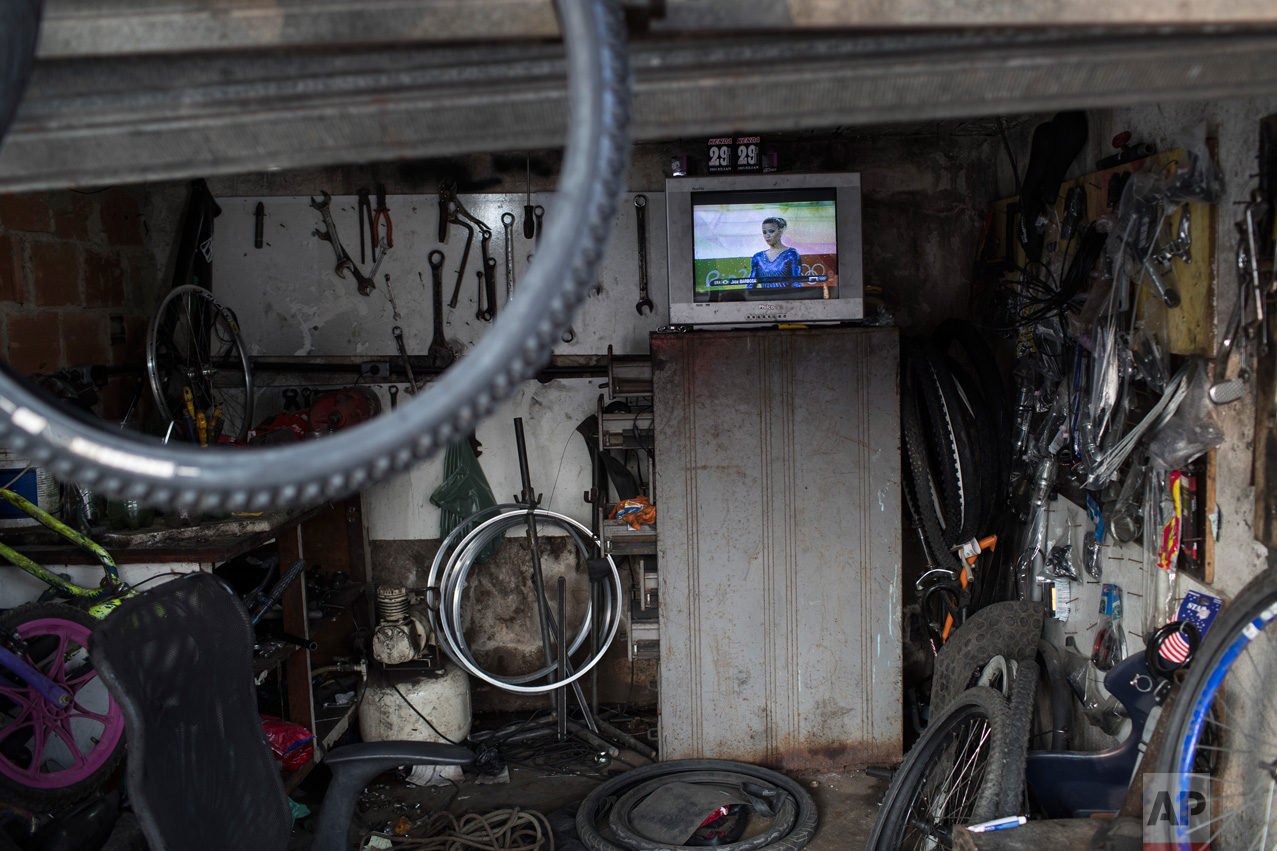
A television inside a bicycle repair shop shows the live transmission of Brazil's Jade Barbosa during the artistic gymnastics at the 2016 Summer Olympics in Rio de Janeiro, Brazil, Tuesday, Aug. 9, 2016. (AP Photo/Felipe Dana)
"The third place winner was a series of images that had an excellent concept. We enjoyed the idea the photographer was trying to execute, but we felt the images didn't go above and beyond what was capable. The series should have been edited into a tighter submission." - NPPA Judges
Judges: Sam Owens/Charleston Gazette-Mail, Christian Tyler Randolph/Charleston Gazette-Mail
New York | International Region | August 2016 | 1st Place Photo Story | Essay
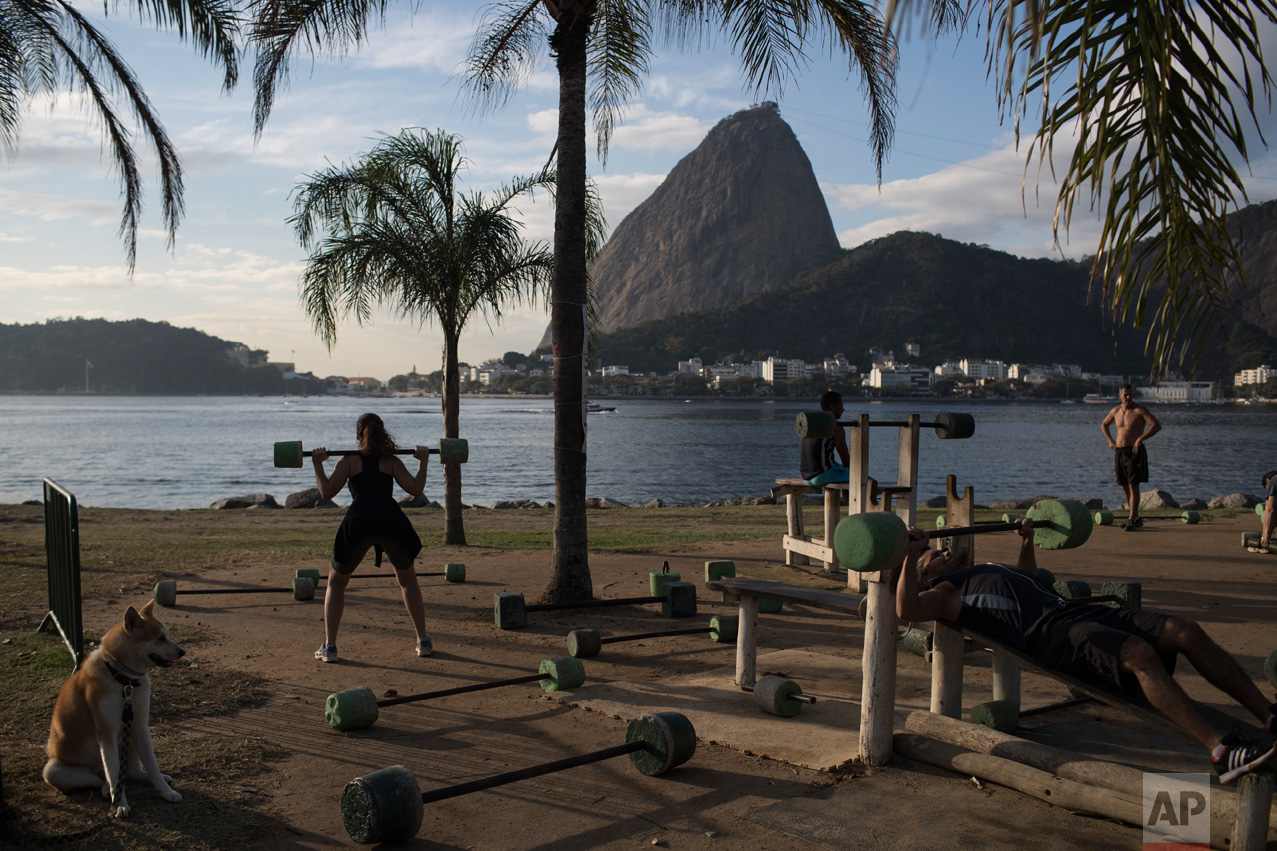
People exercise at an outdoor gym on the shores of Guanabara Bay, where sailing competitions are taking place at the 2016 Summer Olympics in Rio de Janeiro, Brazil, Thursday, Aug. 11, 2016. (AP Photo/Felipe Dana)
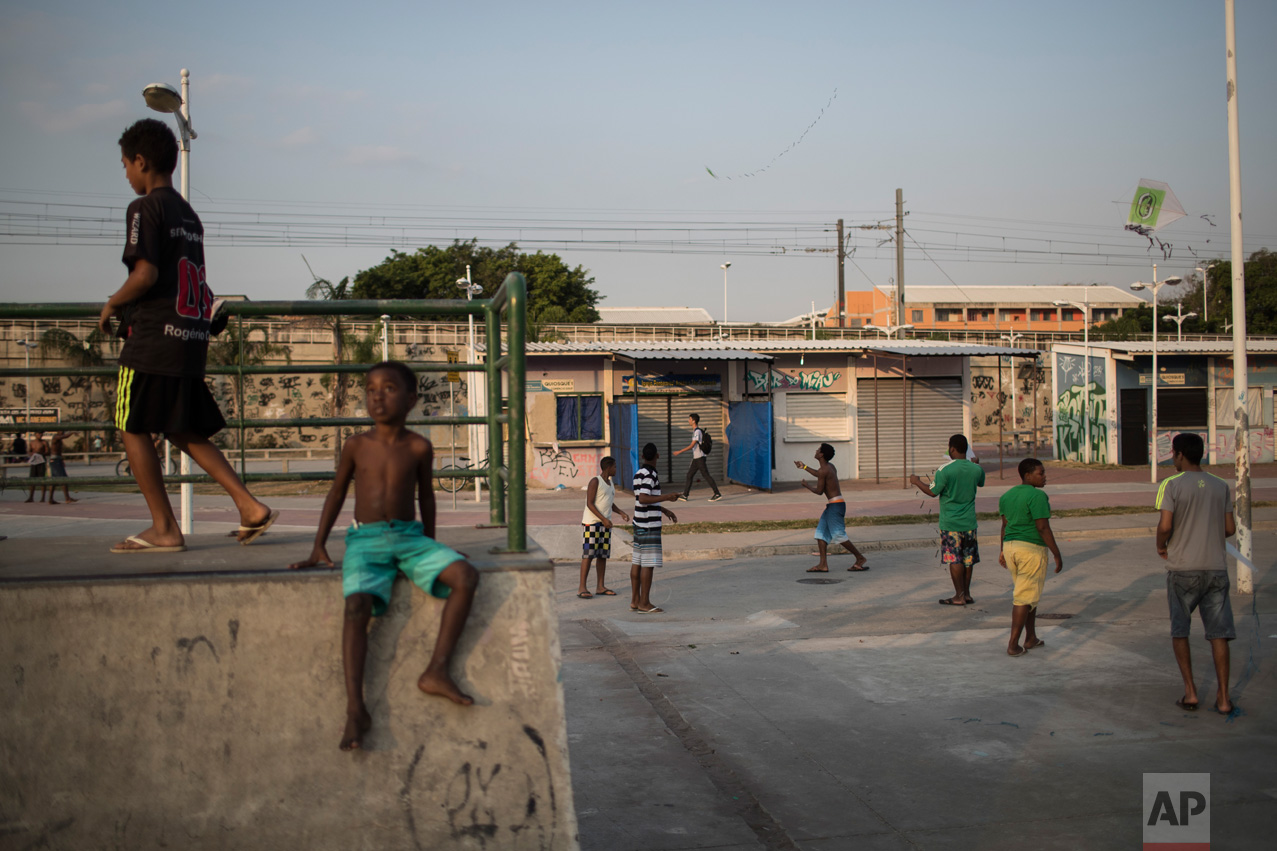
Boys fly kites at the manguinhos slum during the 2016 Summer Olympics in Rio in Rio de Janeiro, Brazil, Tuesday, Aug. 9, 2016. (AP Photo/Felipe Dana)
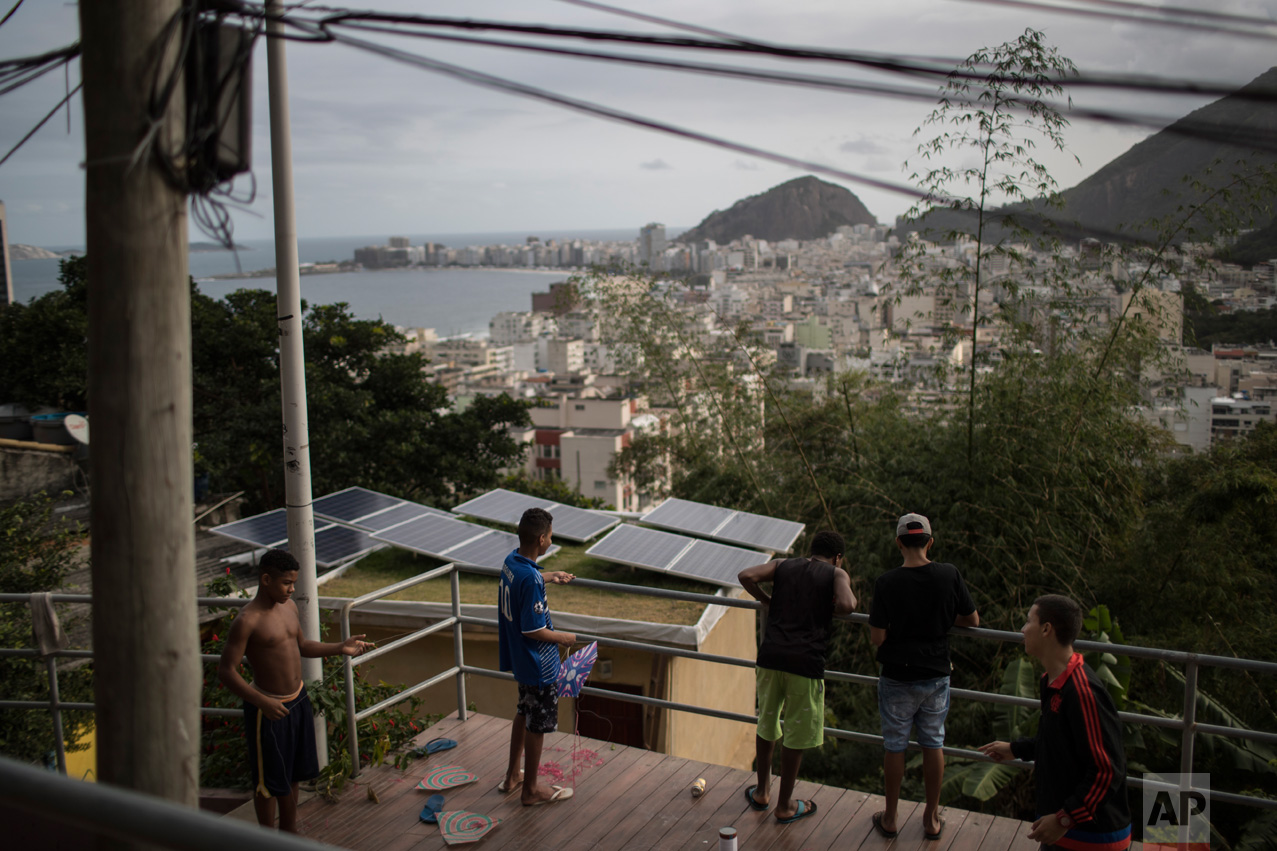
Boys prepare to fly their kites atop the Babilonia slum, overlooking Copacabana beach in Rio de Janeiro, Brazil, Wednesday, Aug. 3, 2016. (AP Photo/Felipe Dana)
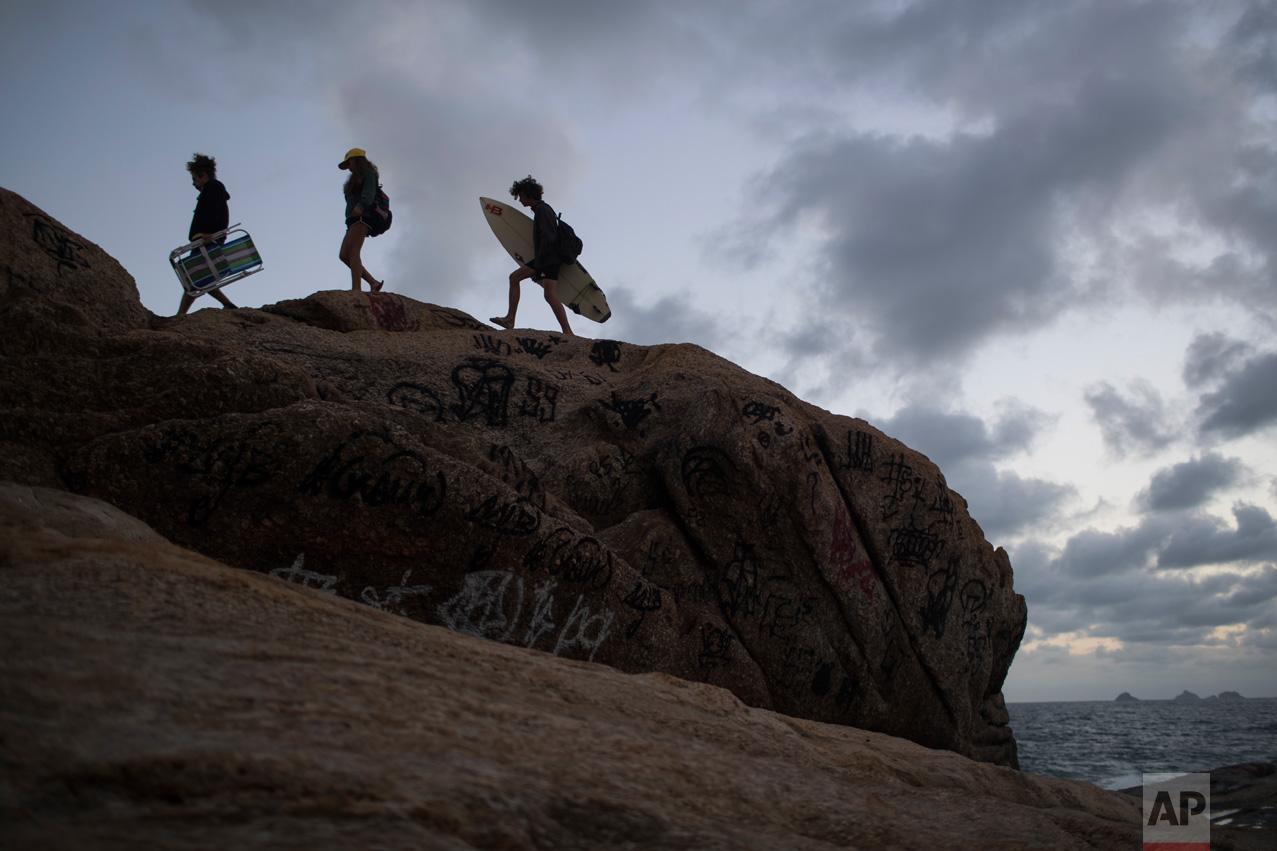
People walk on the rocks of Arpoador beach as the sun sets during the 2016 Summer Olympics in Rio de Janeiro, Brazil, Friday, Aug. 12, 2016. (AP Photo/Felipe Dana)
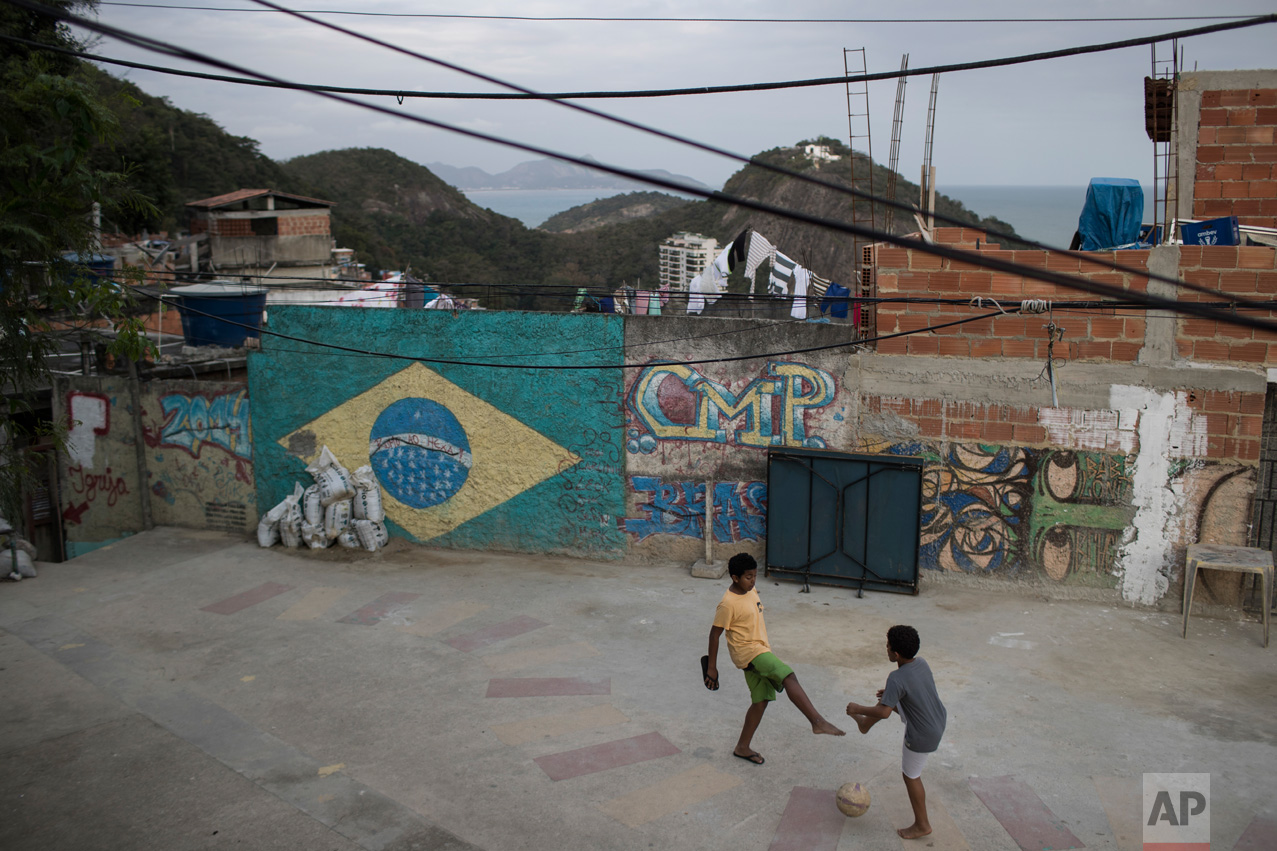
Boys play soccer at the Babilonia slum, overlooking Copacabana beach in Rio de Janeiro, Brazil, Wednesday, Aug. 3, 2016. (AP Photo/Felipe Dana)
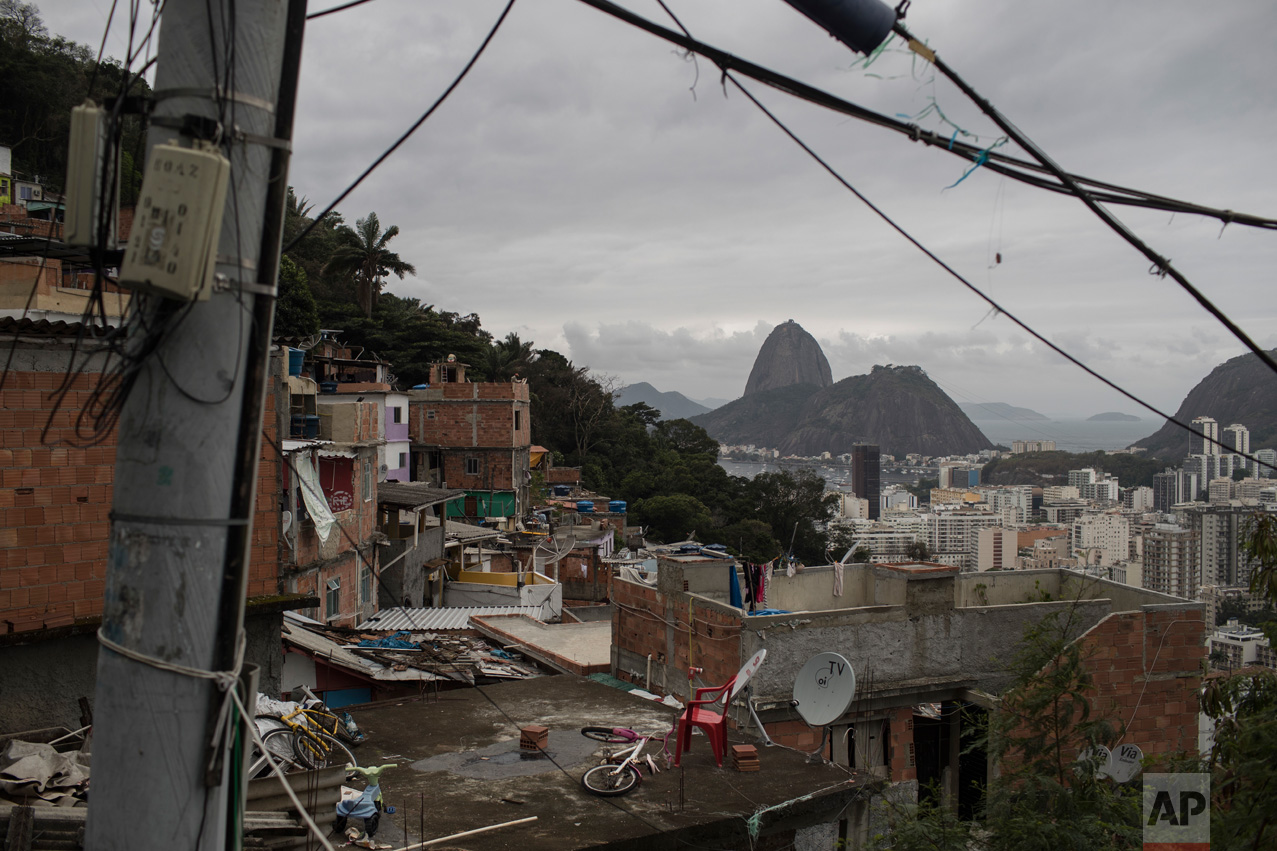
The Sugar Loaf mountain, top right, is pictured from the Dona Marta slum during the 2016 Summer Olympics in Rio de Janeiro, Brazil, Wednesday, Aug. 10, 2016. (AP Photo/Felipe Dana)
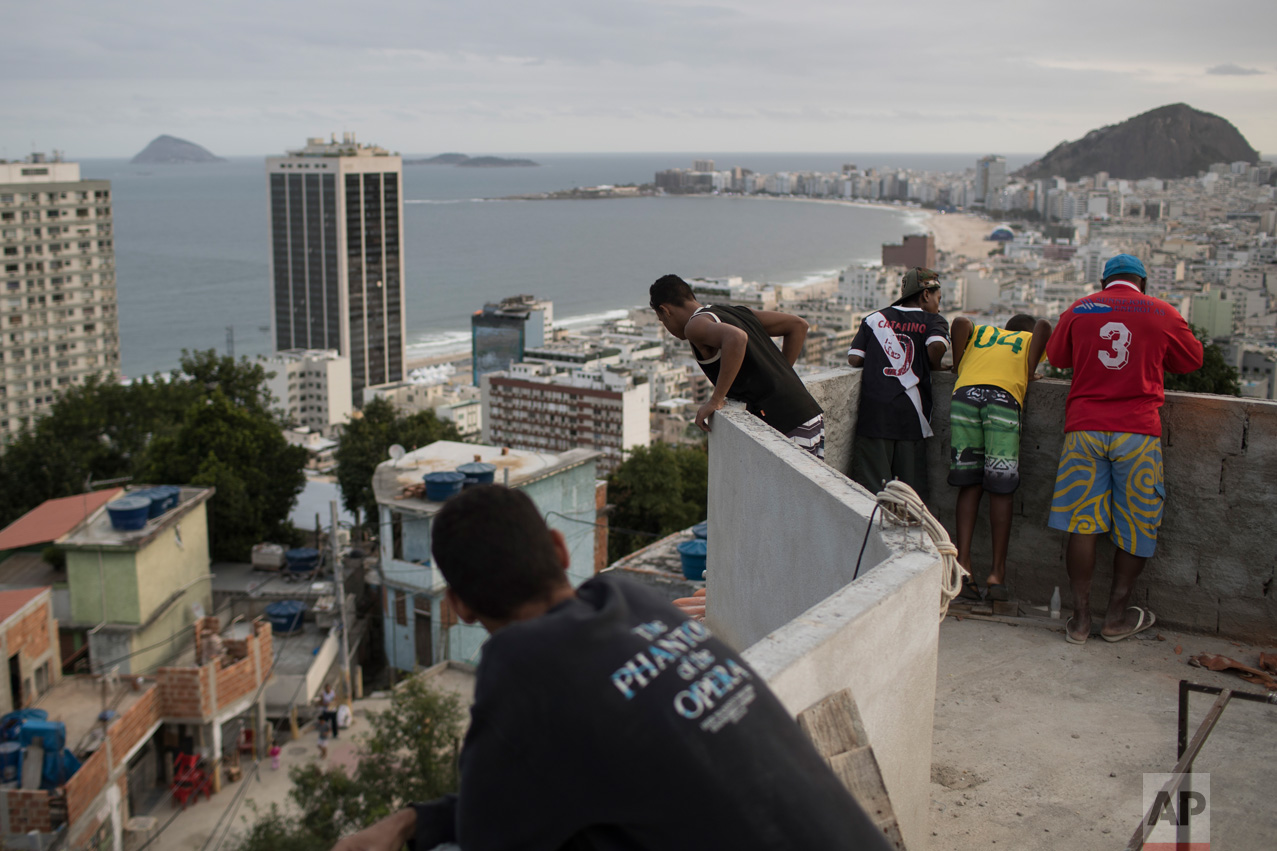
Boys look at kites atop the Babilonia slum, overlooking Copacabana beach in Rio de Janeiro, Brazil, Wednesday, Aug. 3, 2016. (AP Photo/Felipe Dana)
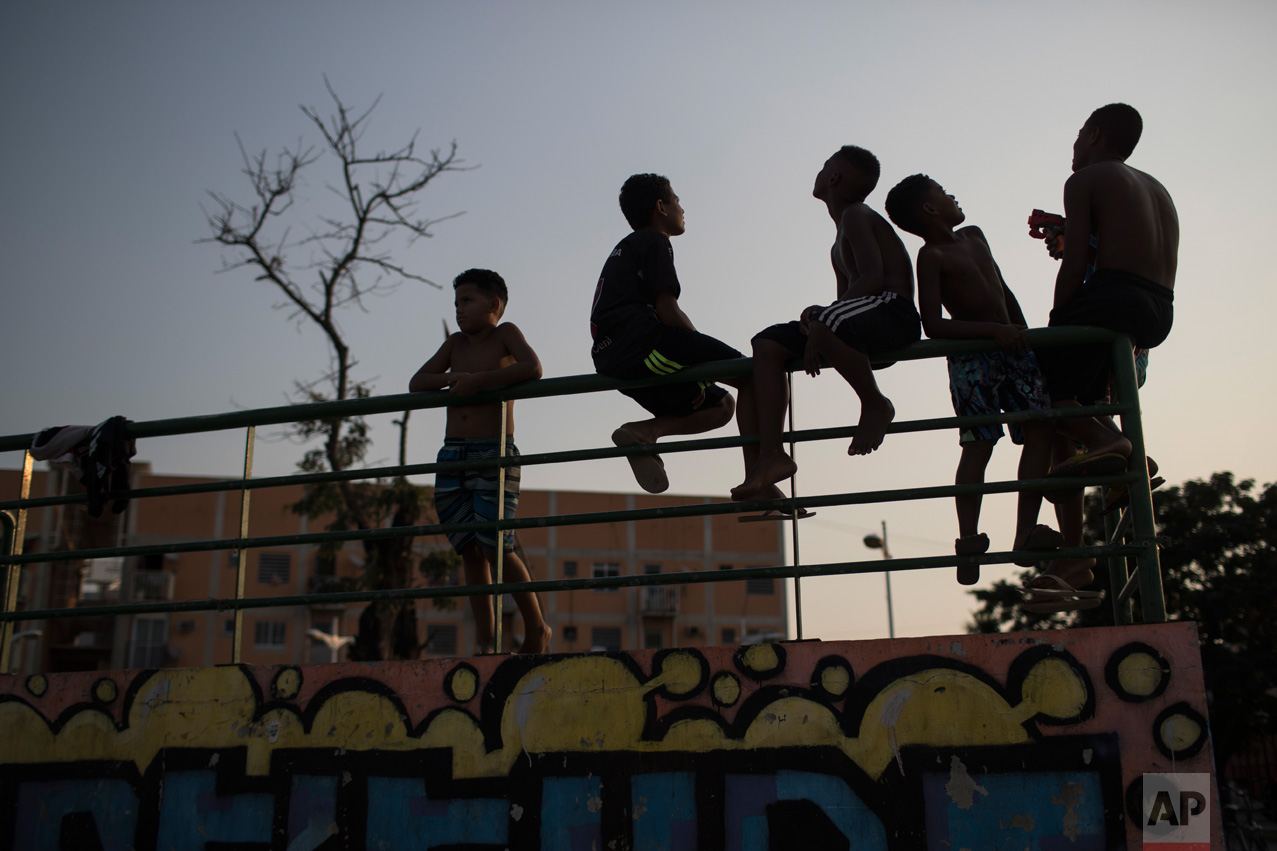
Boys look up at flying kites at the manguinhos slum during the 2016 Summer Olympics in Rio in Rio de Janeiro, Brazil, Tuesday, Aug. 9, 2016. (AP Photo/Felipe Dana)
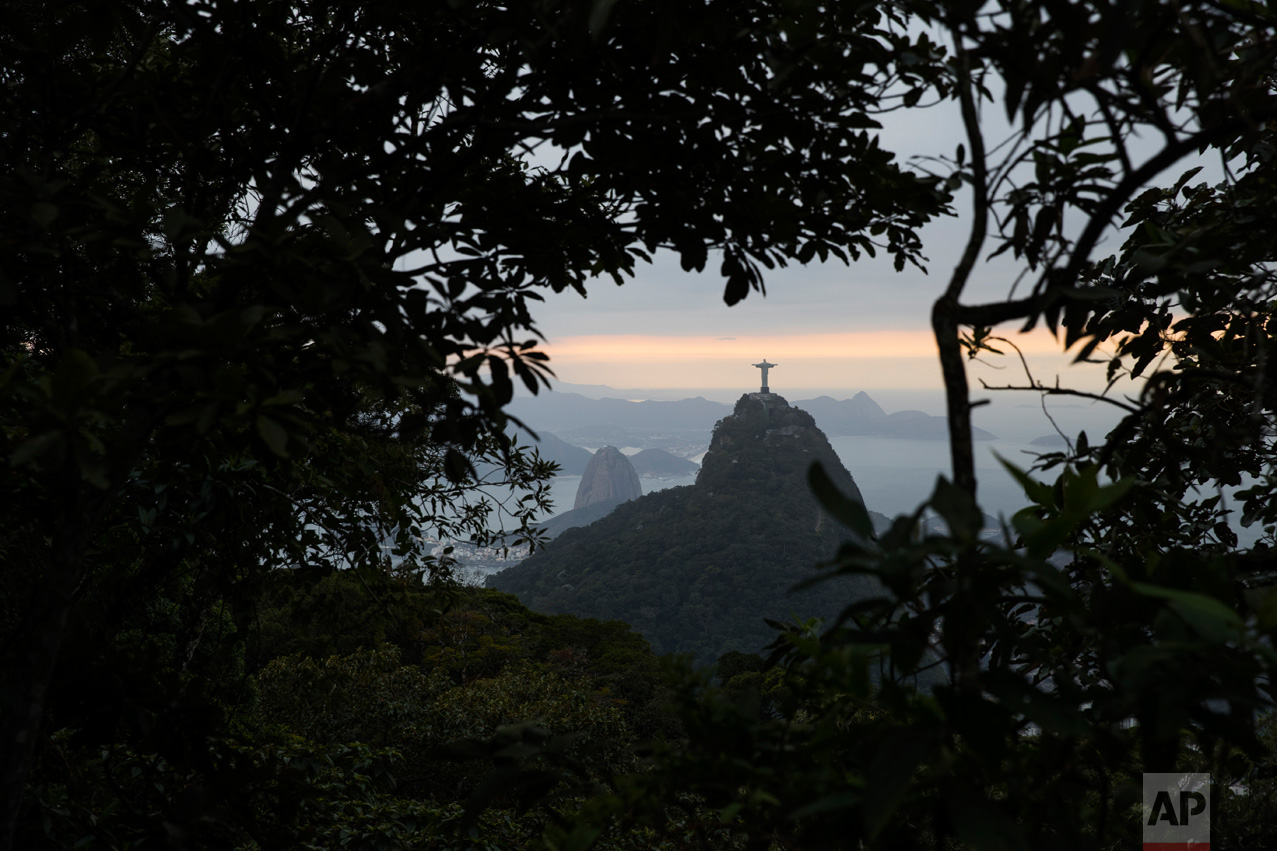
The Christ the Redeemer statue and Sugar Loaf mountain are pictured between trees as the sun rises in Rio de Janeiro, Brazil, Thursday, Aug. 4, 2016. (AP Photo/Felipe Dana)









"The first place winner showed a good sense of place, but we felt that it was generally lacking more active images." - NPPA Judges
Judges: Sam Owens/Charleston Gazette-Mail, Christian Tyler Randolph/Charleston Gazette-Mail
New York | International | October 2016 | 1st Place Portrait | Illustration
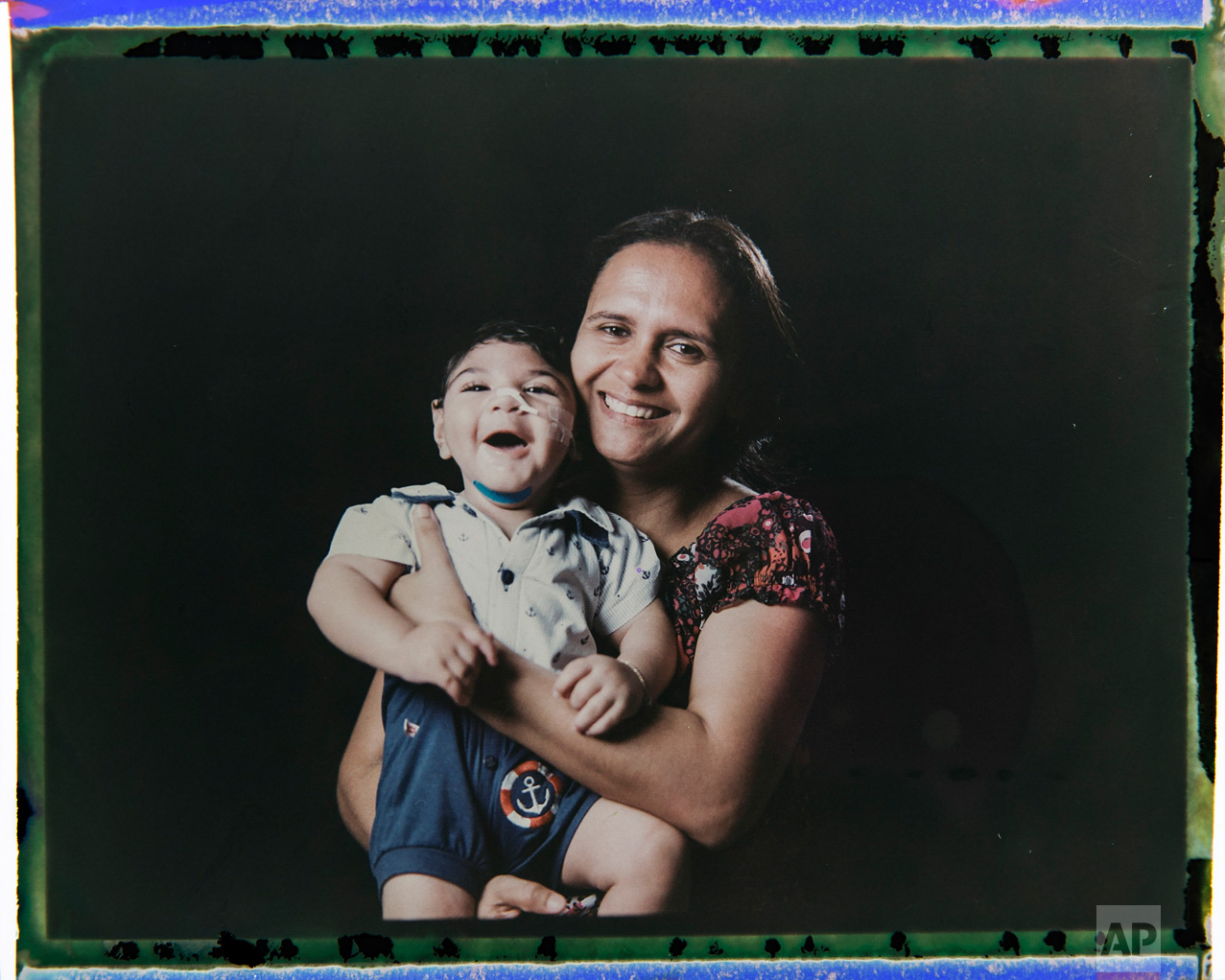
In this Sept. 29, 2016 photo made from a negative recovered from instant film, Rozilene Ferreira poses with her one-year-old son, Arthur Conceicao, who was born with microcephaly, one of many serious medical problems that can be caused by congenital Zika syndrome, in Recife, Pernambuco state, Brazil. A year after a spike in the number of newborns with the defect known as microcephaly, Brazilian doctors and researchers have seen many of the babies develop swallowing difficulties, epileptic seizures and vision and hearing problems. (AP Photo/Felipe Dana)
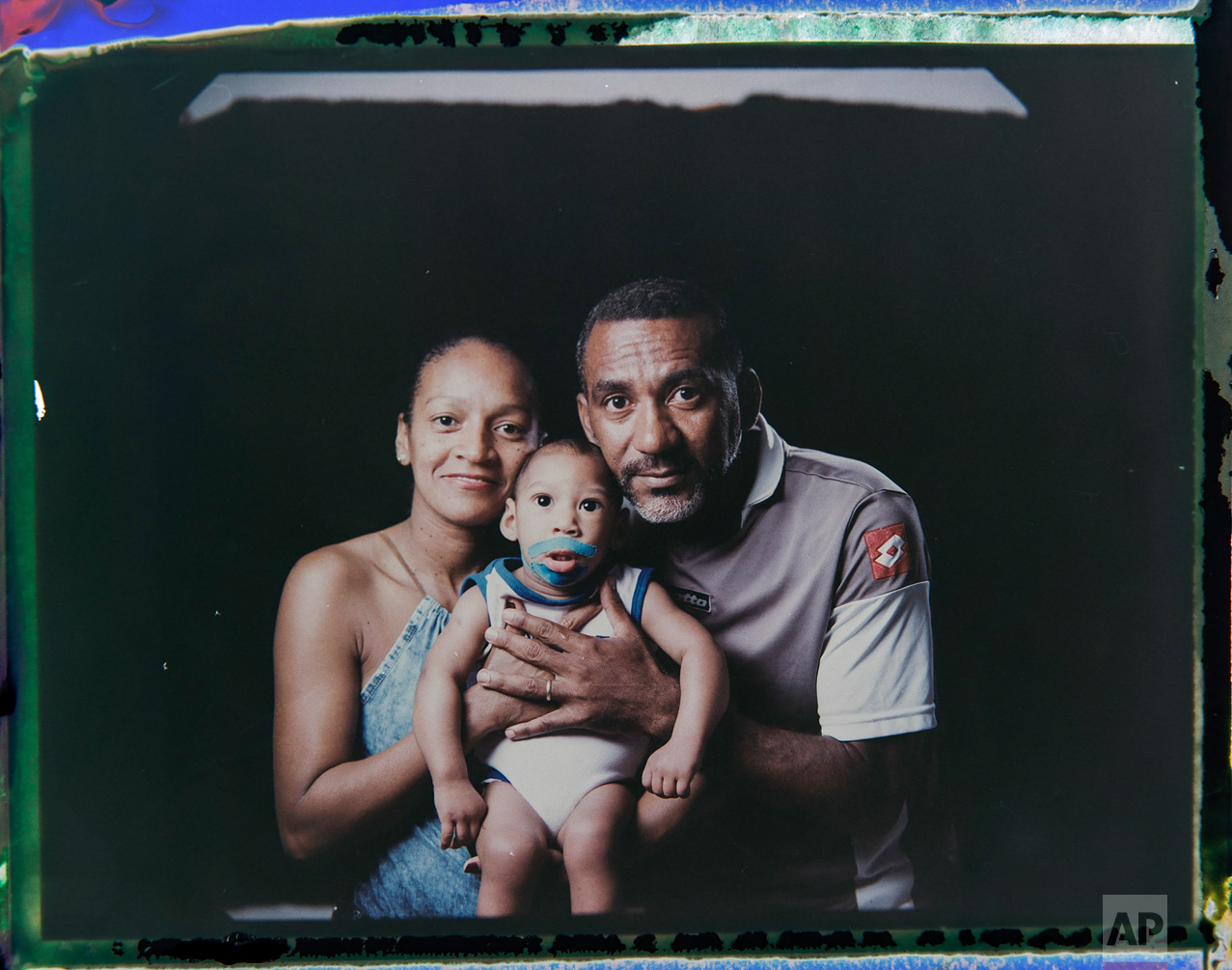
In this Sept. 29, 2016 photo made from a negative recovered from instant film, Diana Felix and Carlos Alberto Dias, pose with their son, Ezequiel, who was born with microcephaly, one of many serious medical problems that can be caused by congenital Zika syndrome, in Recife, Pernambuco state, Brazil. Dias stopped working to help Felix care for their four children. Sometimes he accompanies her to Ezequiel's therapy sessions and medical appointments, which can be as often as five times a week. (AP Photo/Felipe Dana)
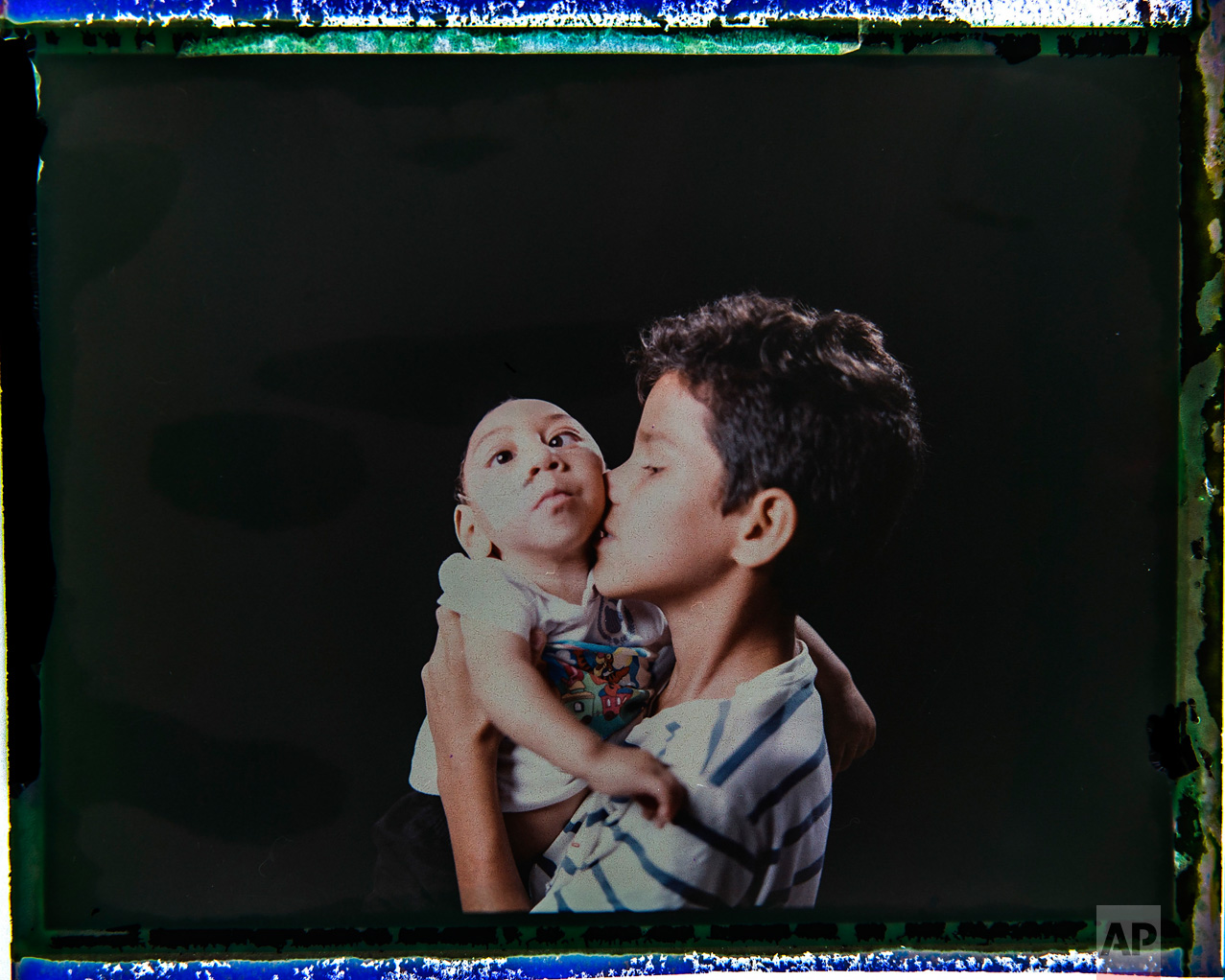
In this Sept. 27, 2016 photo made from a negative recovered from instant film, Elisson Campos poses with his one-year-old brother, Jose Wesley Campos, who was born with microcephaly, one of many serious medical problems that can be caused by congenital Zika syndrome, in Bonito, Pernambuco state, Brazil. Elisson is very close to his baby brother and loves to hold him in his arms. (AP Photo/Felipe Dana)
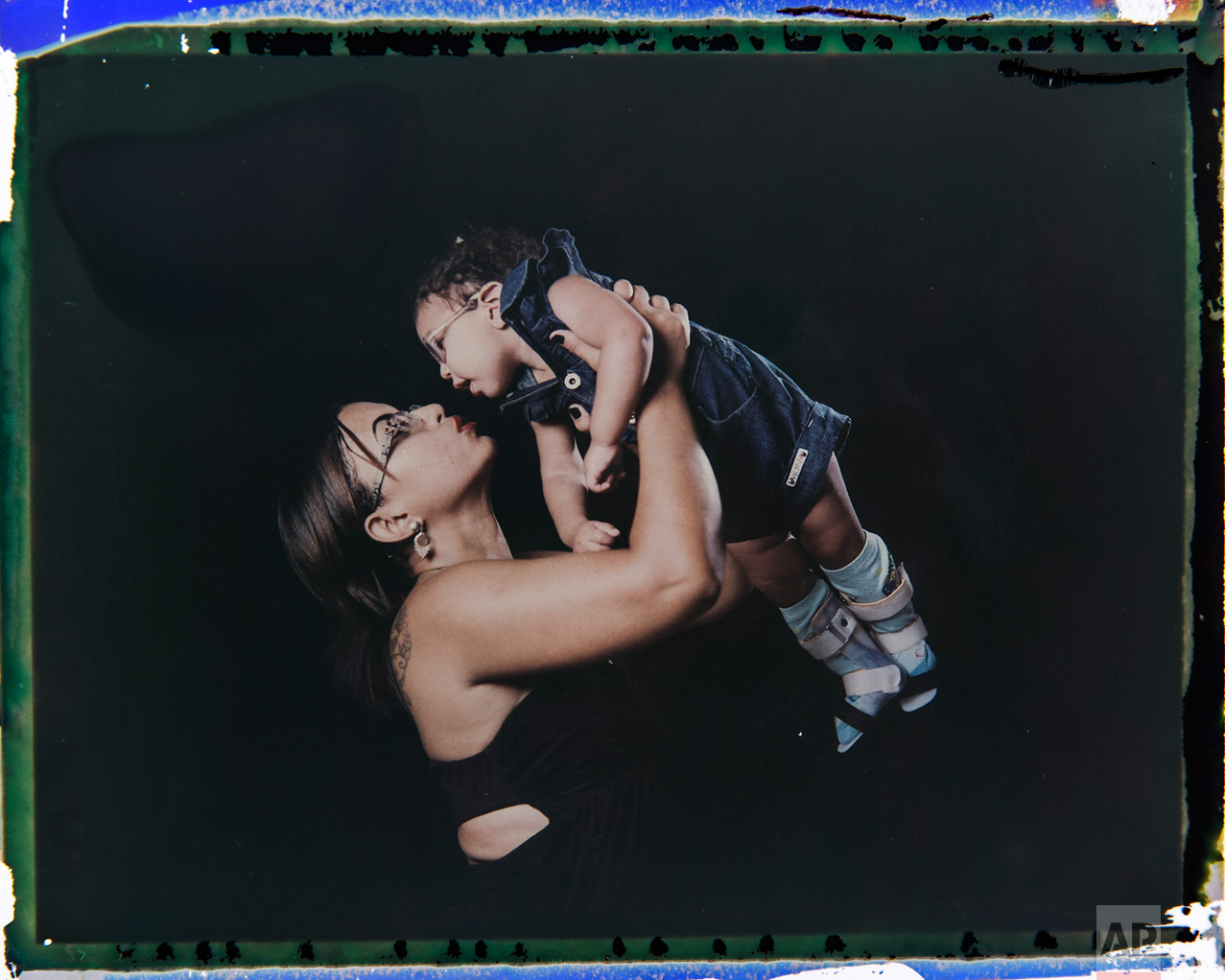
In this Sept. 29, 2016 photo made from a negative recovered from instant film, Rosana Alves holds her daughter Luana, who was born with microcephaly, one of many serious medical problems that can be caused by congenital Zika syndrome, as they pose for a photo in Recife, Pernambuco state, Brazil. Alves has three daughters and has left work to take care of Luana, who is equipped with specially designed leg braces to help position her feet. (AP Photo/Felipe Dana)
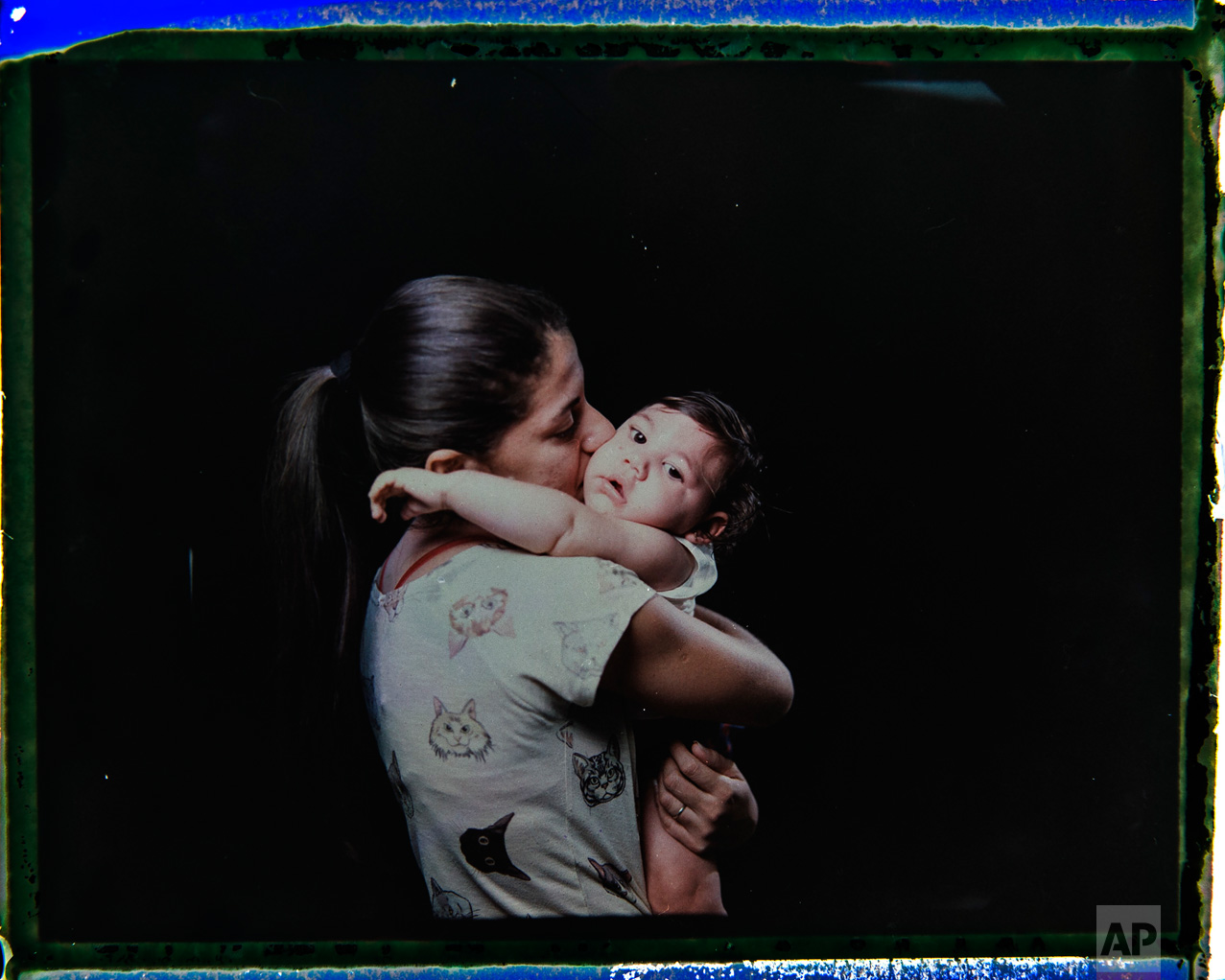
In this Sept. 26, 2016 photo made from a negative recovered from instant film, Angelica Pereira kisses her daughter Luiza, who was born with microcephaly, one of many serious medical problems that can be caused by congenital Zika syndrome, during a portrait session in Santa Cruz do Capibaribe, Pernambuco state, Brazil. "We are always chasing something. We have to drop everything else, all our chores, our homes," said the 21-year-old. "There are so many of us with children with special needs. (The government) is forgetting about that." (AP Photo/Felipe Dana)
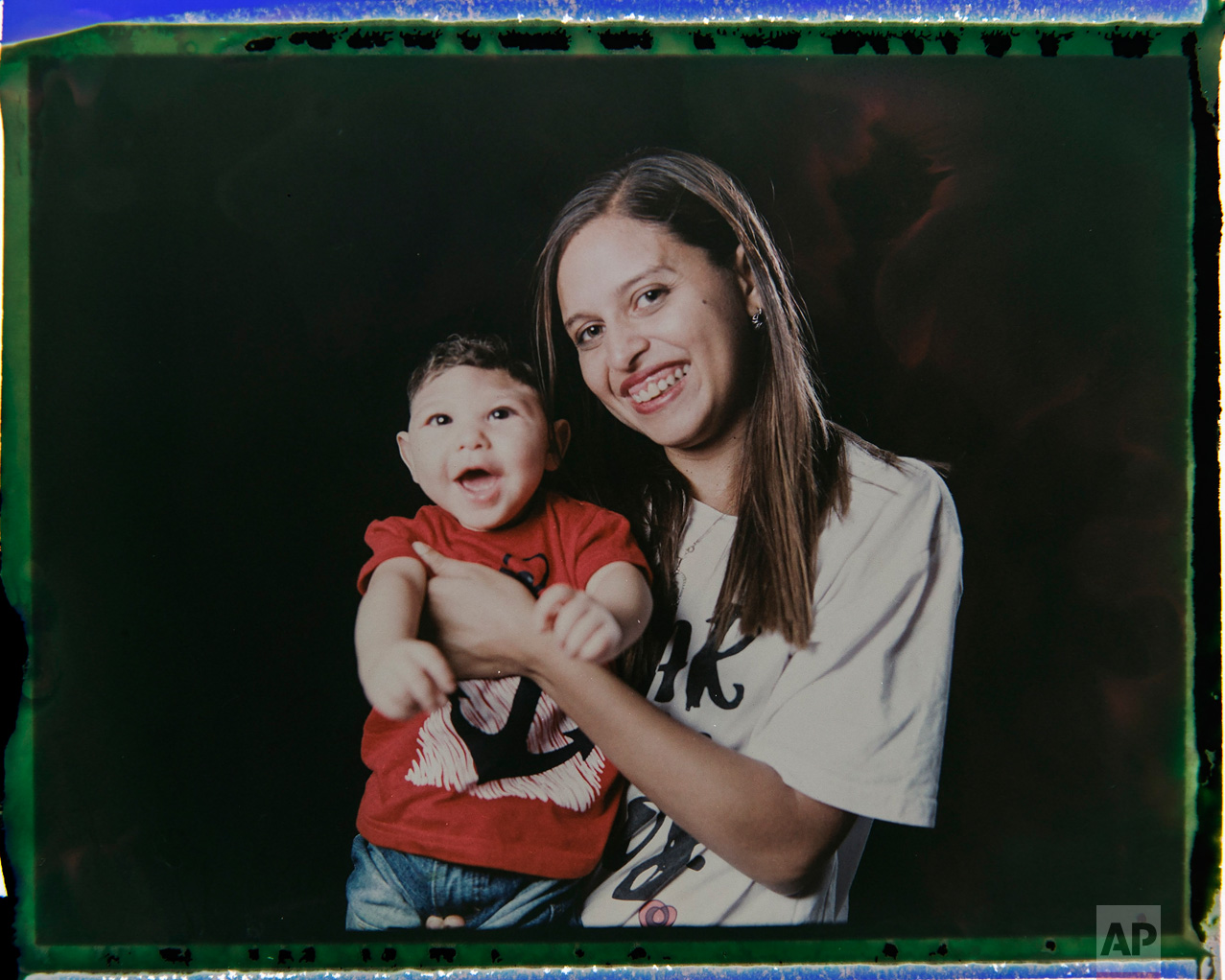
In this Sept. 29, 2016 photo made from a negative recovered from instant film, Daniele Ferreira dos Santos holds her son Juan Pedro, who was born with microcephaly, one of many serious medical problems that can be caused by congenital Zika syndrome, as they pose for a photo in Recife, Pernambuco state, Brazil. Santos is helped by her mother and older daughter, who often take turns caring for Juan Pedro. His father left the house a few weeks after he was born. (AP Photo/Felipe Dana)






"First place a strong series of portraits of children with the zika virus and their families. In addition to the fine photography, judges appreciated the thorough and well-written captions." - NPPA Judges
Judges: Ken McGagh/MetroWest Daily News, Art Illman/MetroWest Daily News, Allan Jung/MetroWest Daily News
New York | International | October 2016 | 1st Place Photo Story | Essay
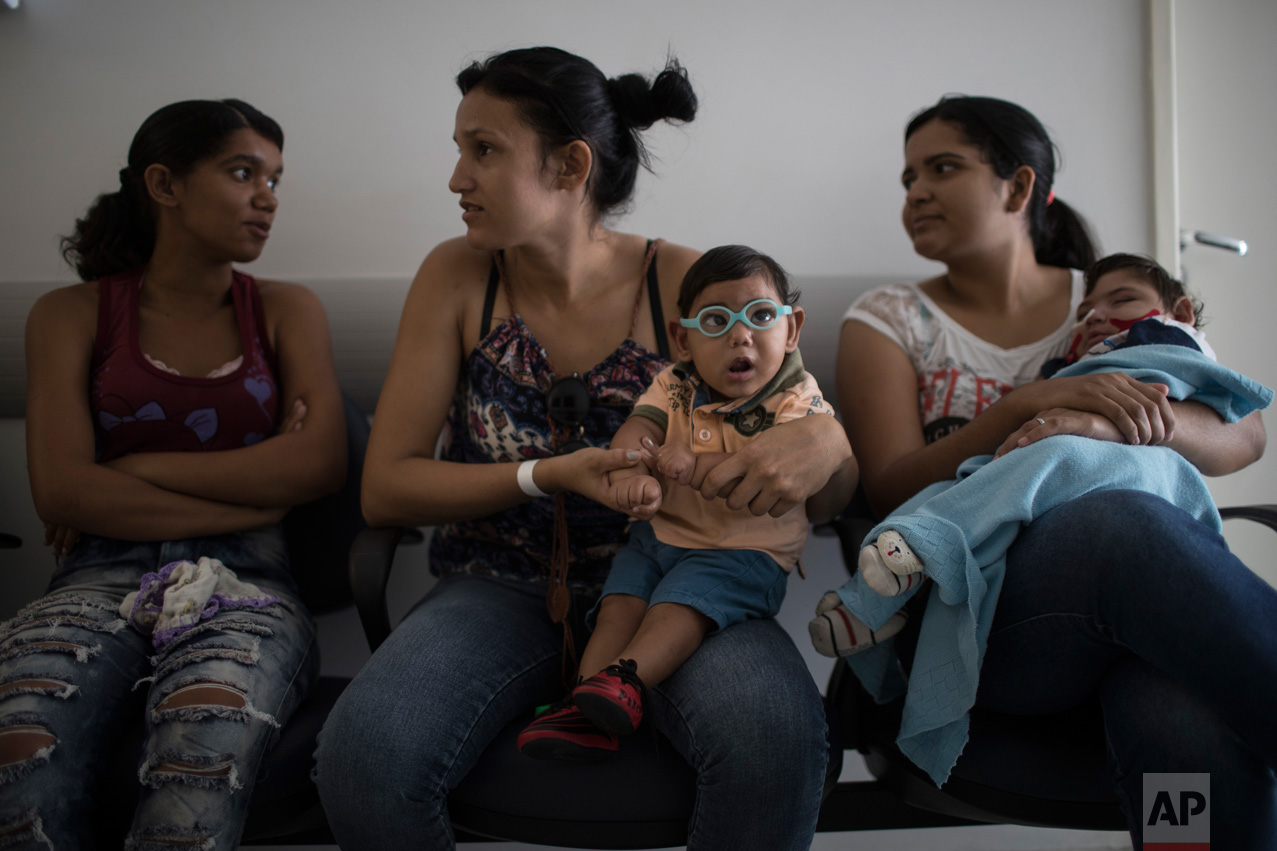
In this Sept. 27, 2016 photo, babies born with microcephaly Alexandro Julio, center, and Pedro Henrique, wait for their physical therapy session at the UPAE hospital in Caruaru, Pernambuco state, Brazil. A year after a spike in the number of newborns with the defect known as microcephaly, doctors and researchers have seen many of the babies develop swallowing difficulties, epileptic seizures and vision and hearing problems. (AP Photo/Felipe Dana)
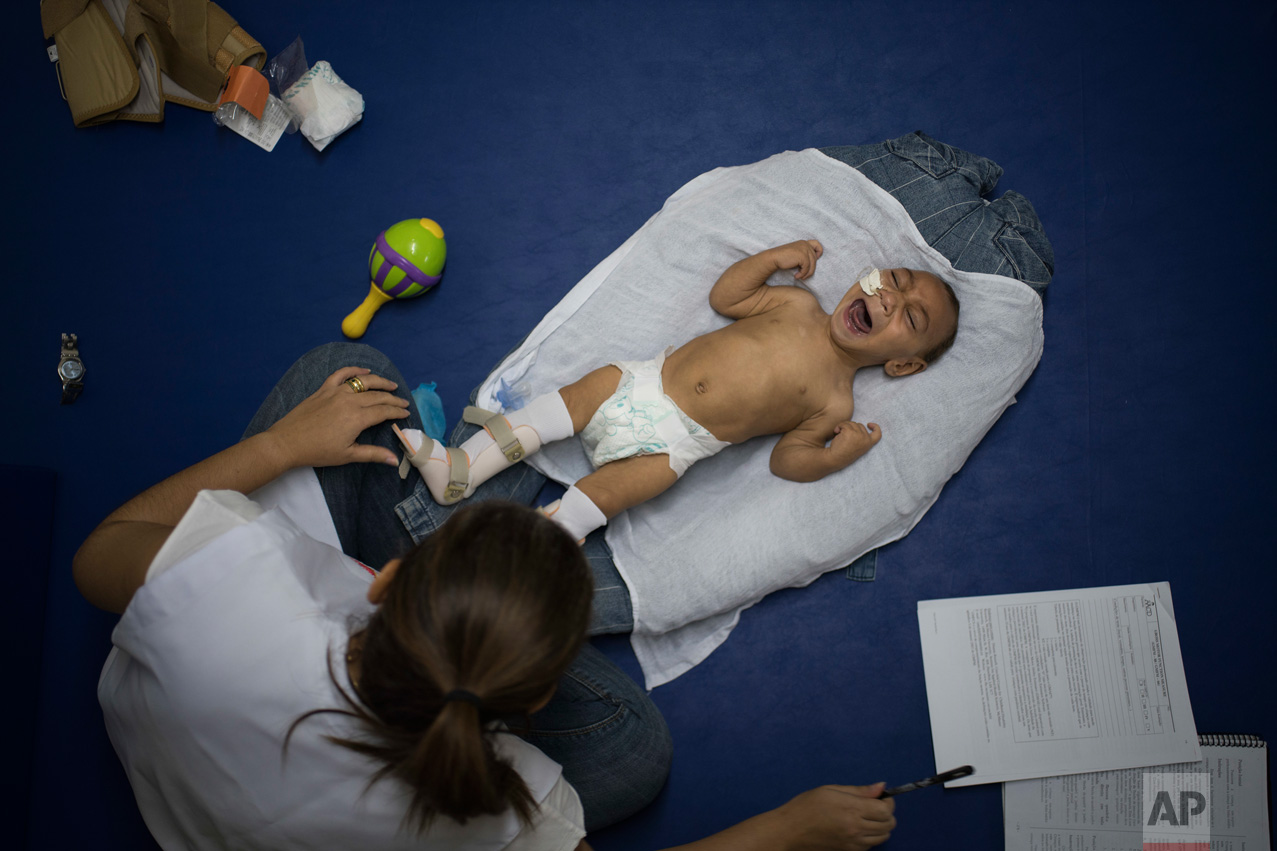
In this Sept. 30, 2016 photo, 1-year-old Jose Wesley Campos, who was born with microcephaly, cries during his physical therapy session at the AACD rehabilitation center in Recife, Brazil. Jose is like a newborn. He is slow to follow objects with his crossed eyes. His head is unsteady when he tries to hold it up, and he weighs less than 13 pounds, far below the 22 pounds that is average for a baby his age. (AP Photo/Felipe Dana)
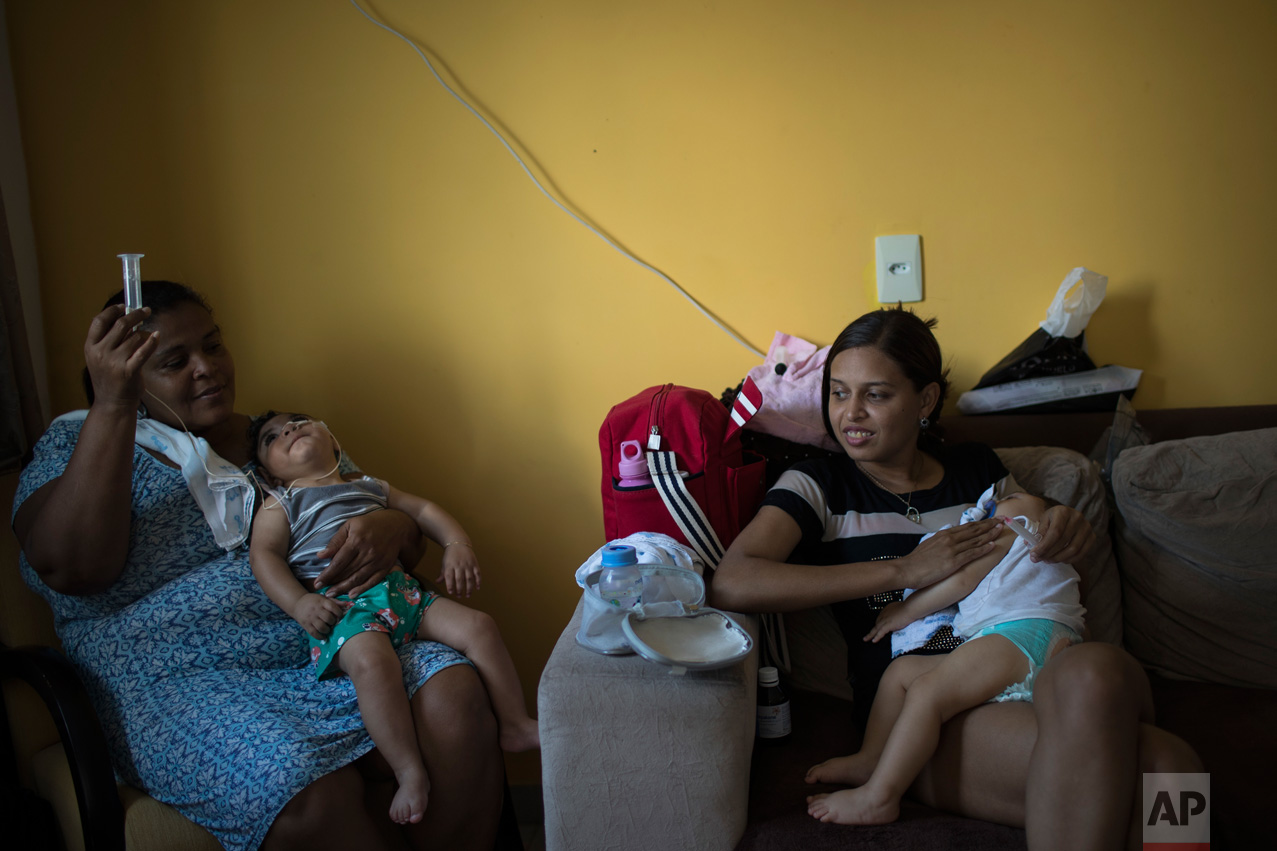
In this Oct. 1, 2016 photo, Daniele Ferreira dos Santos and her son Juan Pedro, right, sit next to Heloisa Dias who feeds her grandson Arthur Conceicao during his one-year birthday party in Recife, Pernambuco state, Brazil. Arthur, who was born with microcephaly, has started taking high-calorie formula through a tube after he appeared to choke during meals. (AP Photo/Felipe Dana)
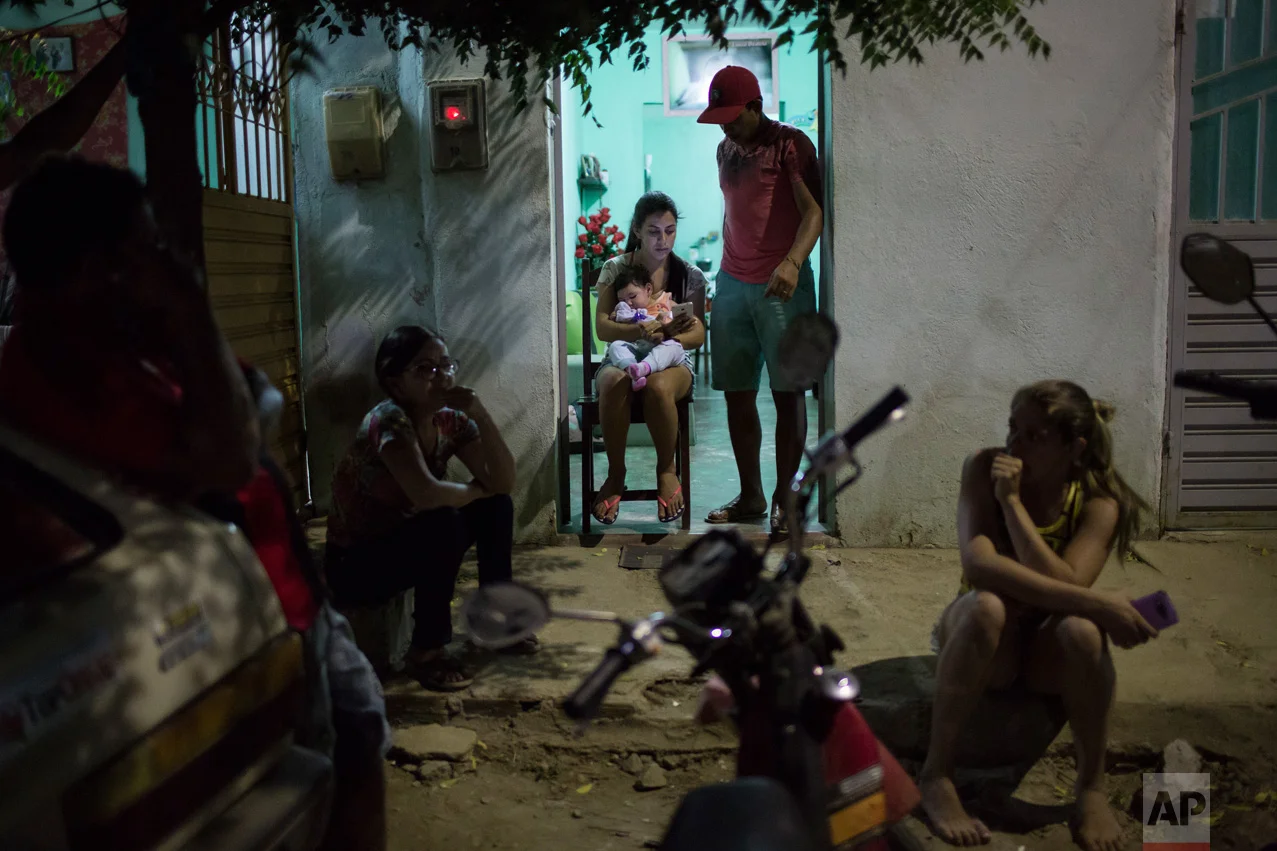
In this Sept. 26, 2016 photo, Angelica Pereira holds her daughter Luiza, who was born with microcephaly, as her husband Dejailson Arruda stands by at their home in Santa Cruz do Capibaribe, Pernambuco state, Brazil. Pereira says it’s a victory just for her daughter Luiza to reach her first birthday. Despite Luiza’s suffering from daily seizures and breathing problems, Pereira is hopeful her health and motor skills will improve with time. (AP Photo/Felipe Dana)
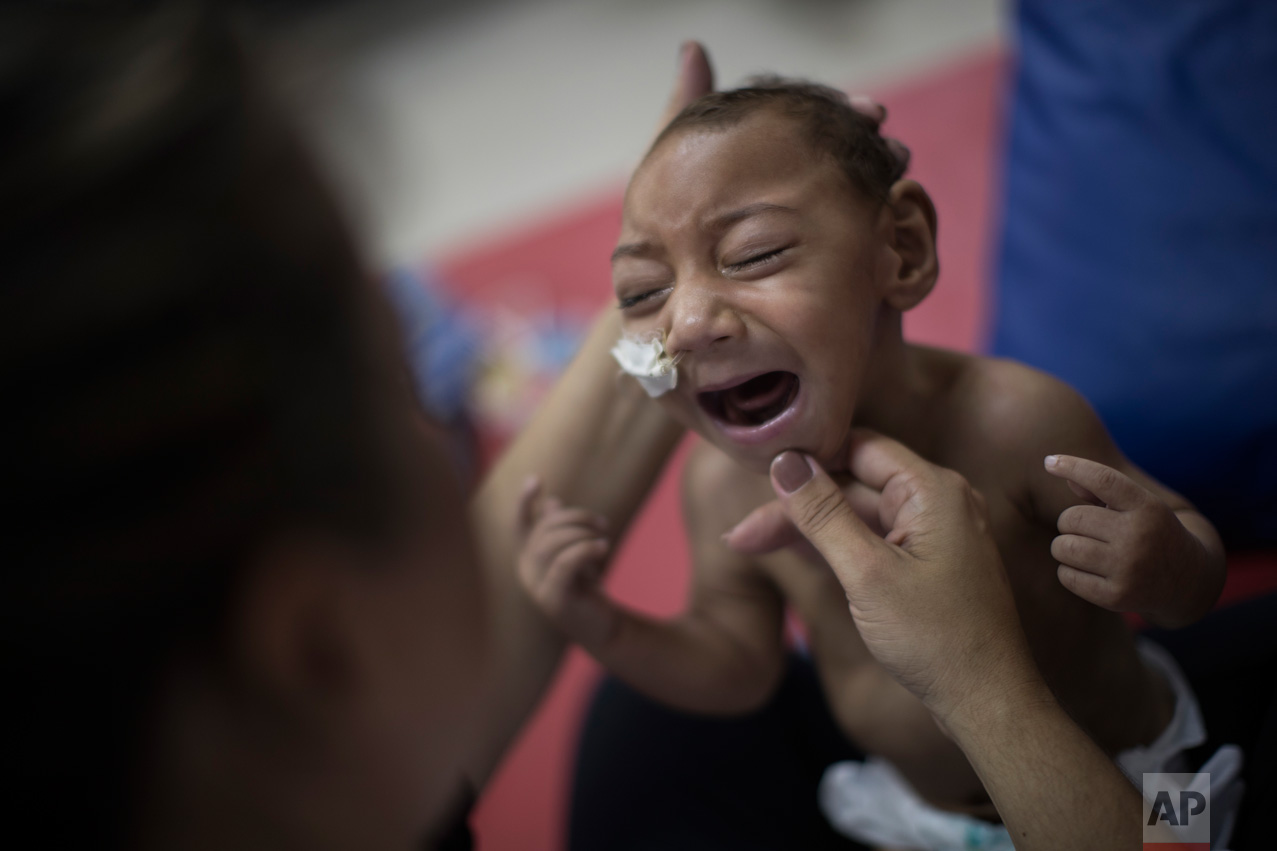
In this Sept. 28, 2016 photo, one-year-old Jose Wesley Campos, who was born with microcephaly, cries during a physical therapy session at the AACD rehabilitation center in Recife, Brazil. Breathing problems make his cries sound like gargling, and his legs stiffen when he is picked up. (AP Photo/Felipe Dana)
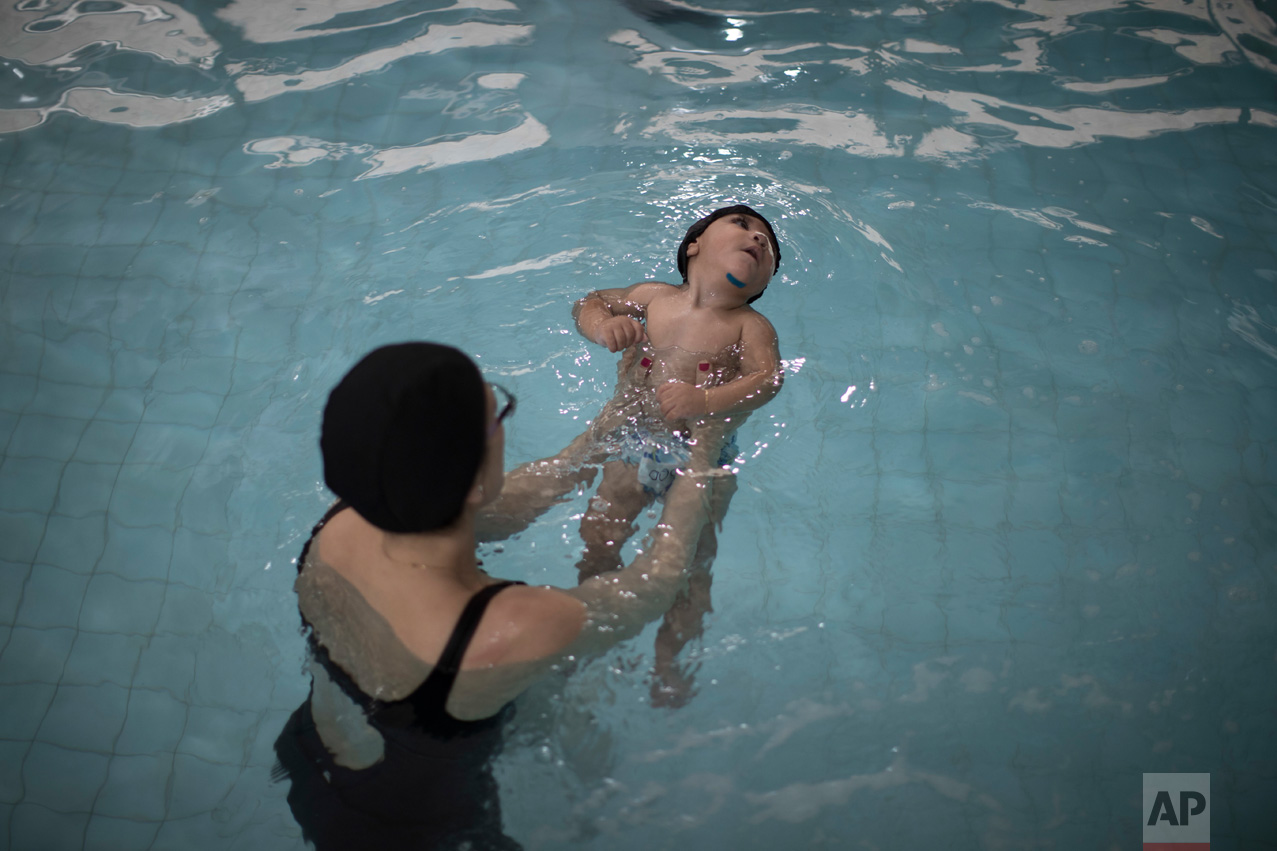
This Sept. 28, 2016 photo shows one-year-old Arthur Conceicao, who was born with microcephaly, during his swimming pool physical therapy session at AACD rehabilitation center in Recife, Brazil. While scientists probe how Zika attacks fetuses in the womb, babies like Arthur born with brain damage caused by the virus are suffering numerous health problems such as trouble swallowing, worsening epileptic seizures and difficulty breathing. (AP Photo/Felipe Dana)
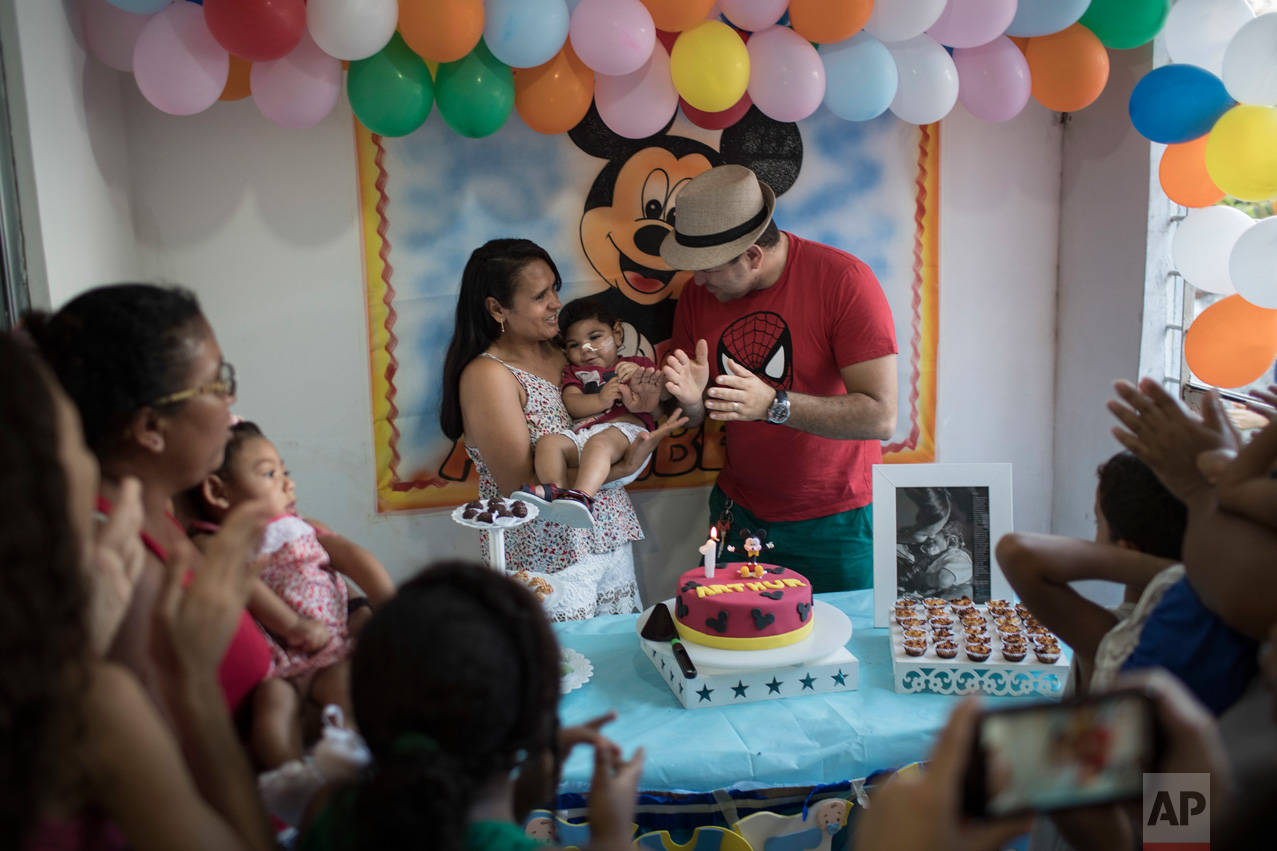
In this Oct. 1, 2016 photo, Rozilene Ferreira and her husband Elias Rodrigo celebrate the one-year birthday of their son Arthur, who was born with microcephaly, in Recife, Pernambuco state, Brazil. Arthur has started taking high-calorie formula through a tube after he appeared to choke during meals. “It’s every mom’s dream to see their child open his mouth and eat well,” said his mother, adding that each day seems to bring new problems. (AP Photo/Felipe Dana)







"The zika virus one year later story was the clear choice for first place." - NPPA Judges
Judges: Ken McGagh/MetroWest Daily News, Art Illman/MetroWest Daily News, Allan Jung/MetroWest Daily News
New York | International | November 2016 | 2nd Place Photo Story | Essay
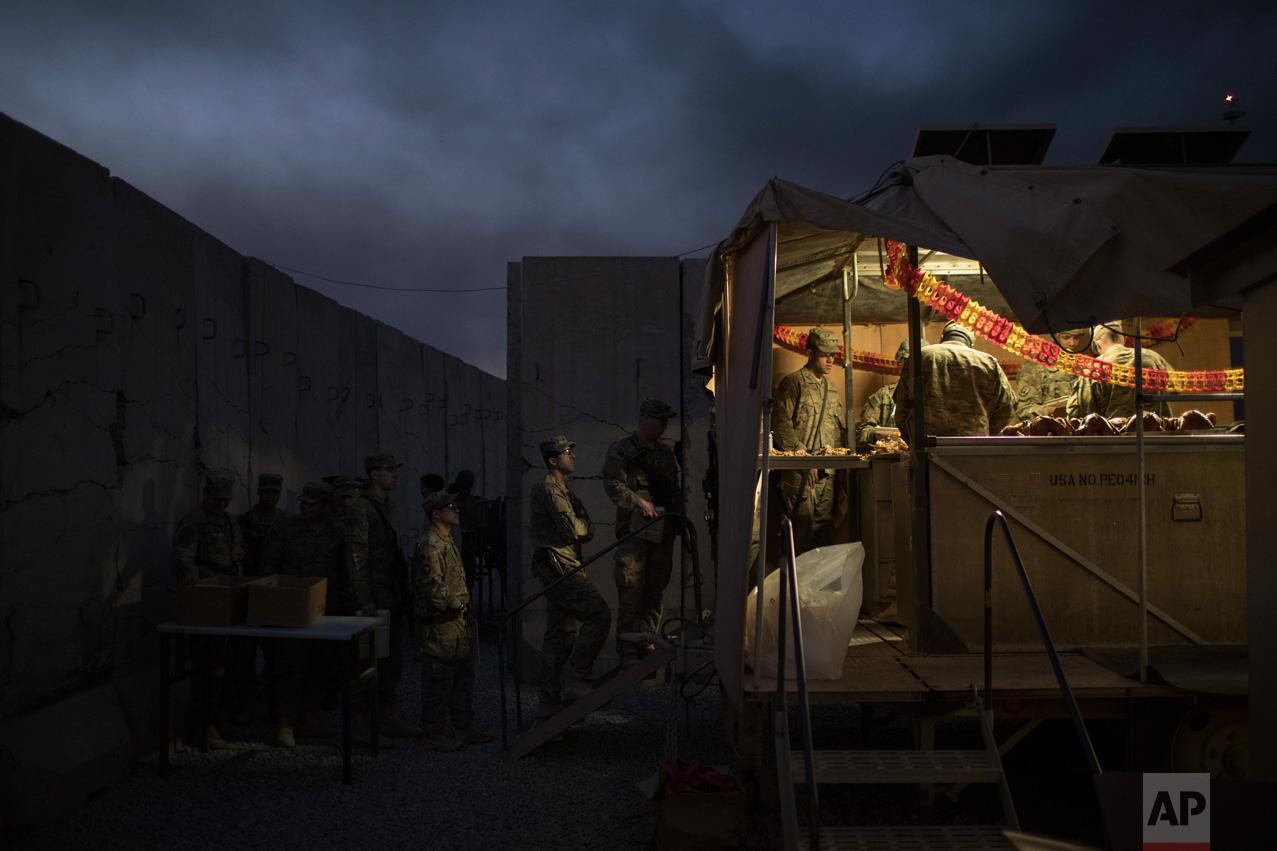
U.S. military personnel wait in line for Thanksgiving dinner at a coalition air base in Qayara south of Mosul, Iraq, Thursday, Nov. 24, 2016. (AP Photo/Felipe Dana)
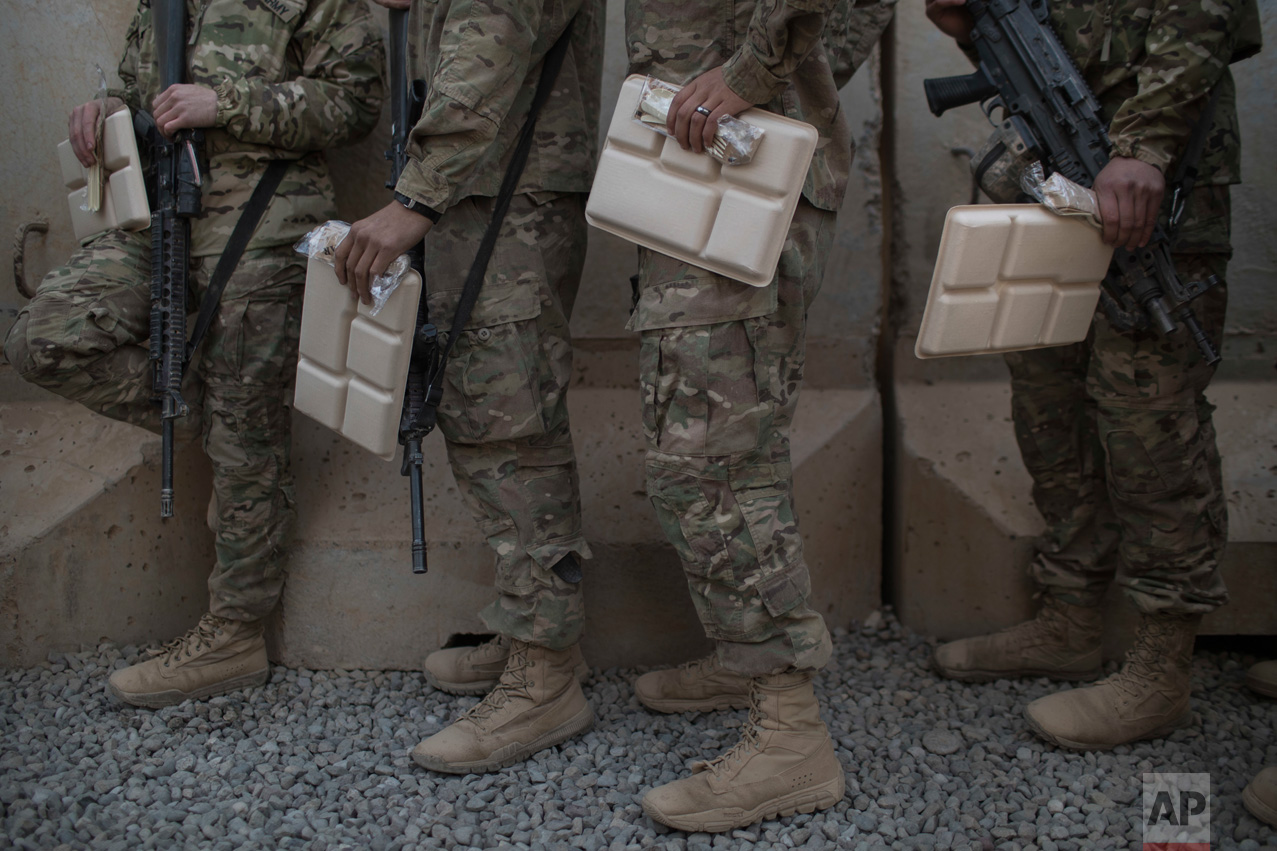
U.S. military personnel wait in line for Thanksgiving dinner at a coalition air base in Qayara south of Mosul, Iraq, Thursday, Nov. 24, 2016. (AP Photo/Felipe Dana)
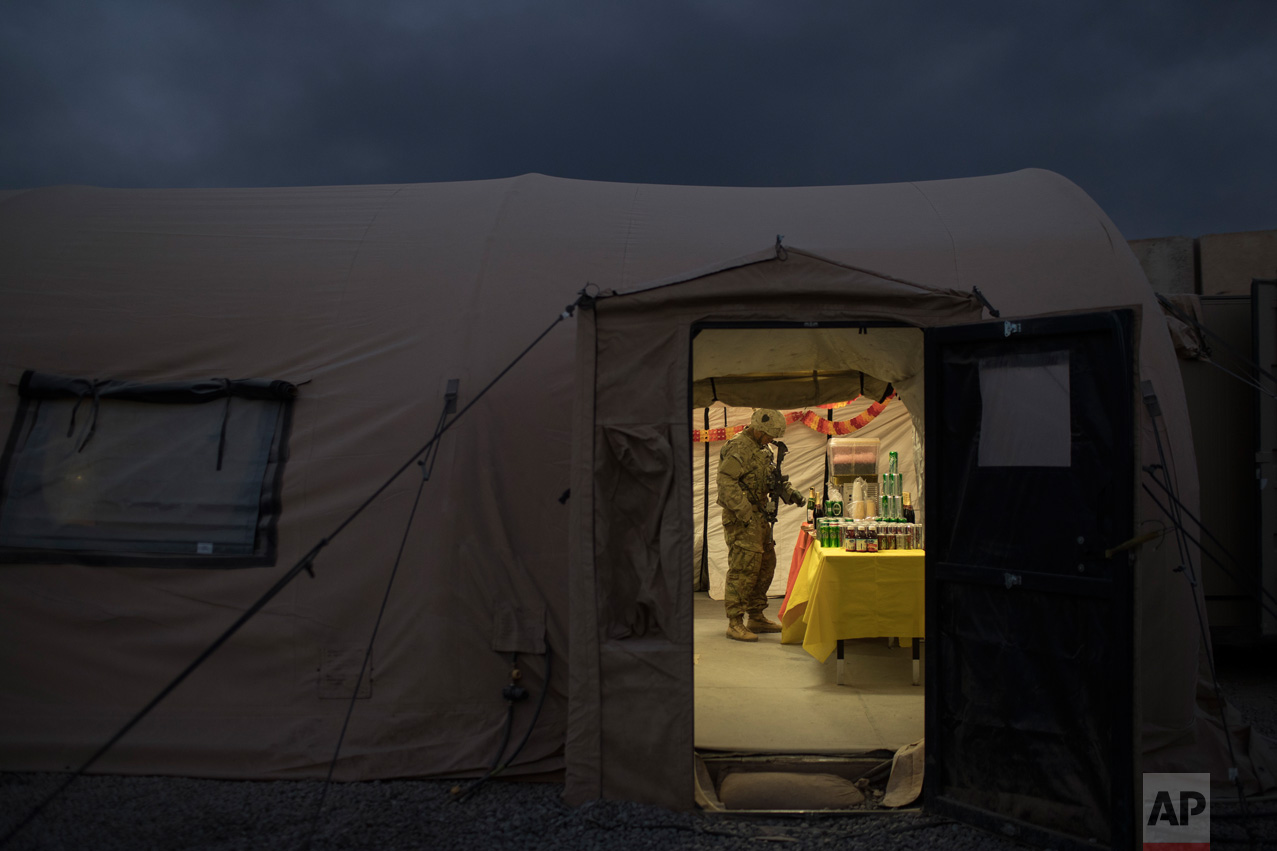
A U.S. military service member grabs a drink during Thanksgiving dinner at a coalition air base in Qayara south of Mosul, Iraq, Thursday, Nov. 24, 2016. (AP Photo/Felipe Dana)
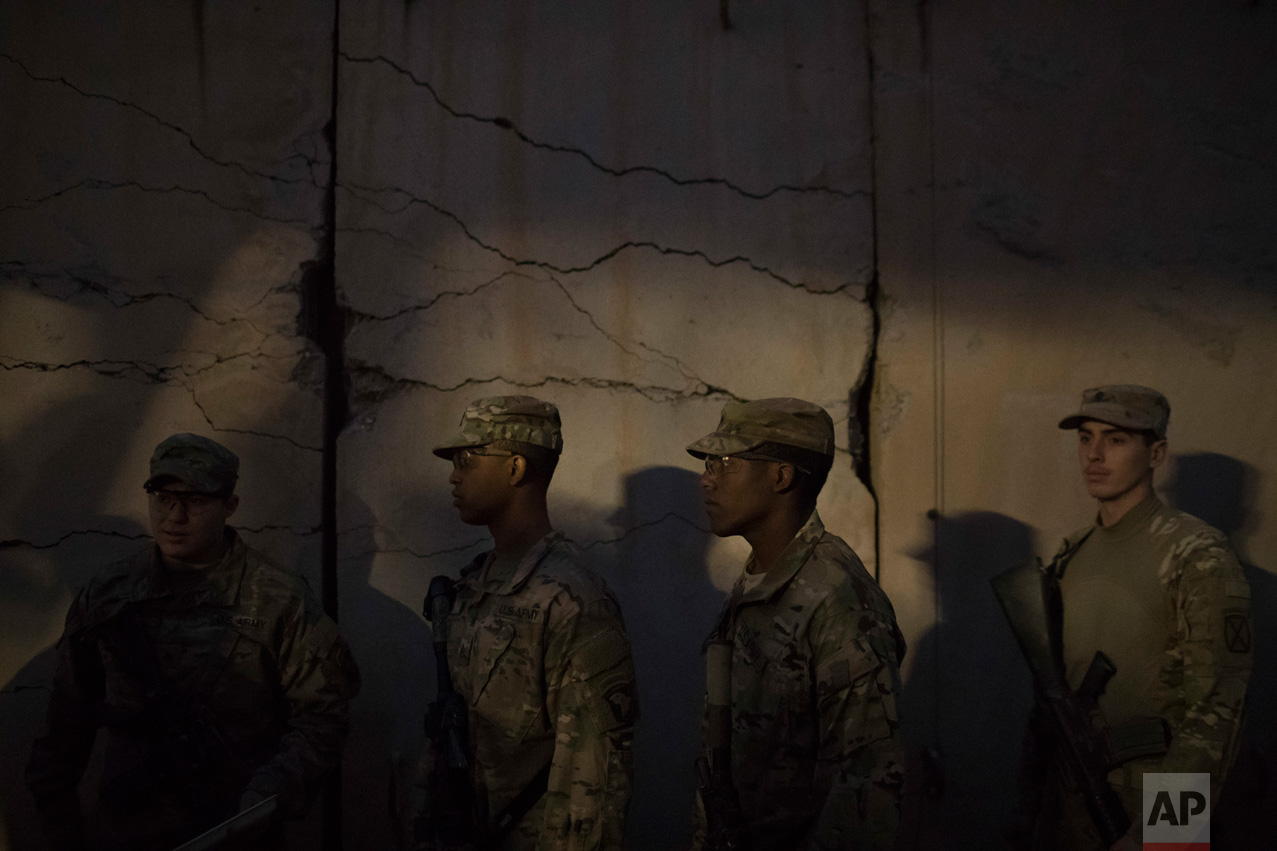
U.S. military personnel wait in line for Thanksgiving dinner at a coalition air base in Qayara south of Mosul, Iraq, Thursday, Nov. 24, 2016. (AP Photo/Felipe Dana)
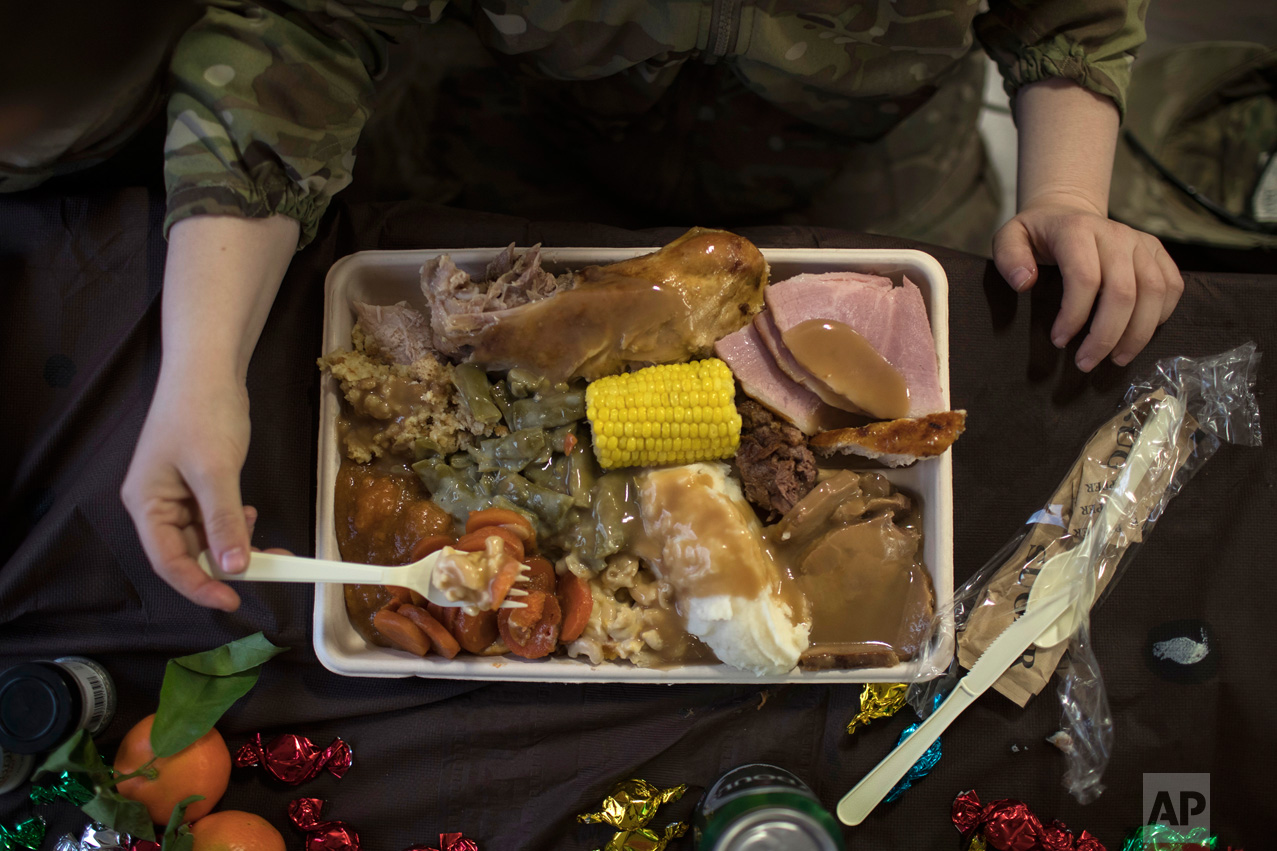
An U.S. Army soldier eats Thanksgiving dinner at a coalition air base in Qayara south of Mosul, Iraq, Thursday, Nov. 24, 2016. (AP Photo/Felipe Dana)
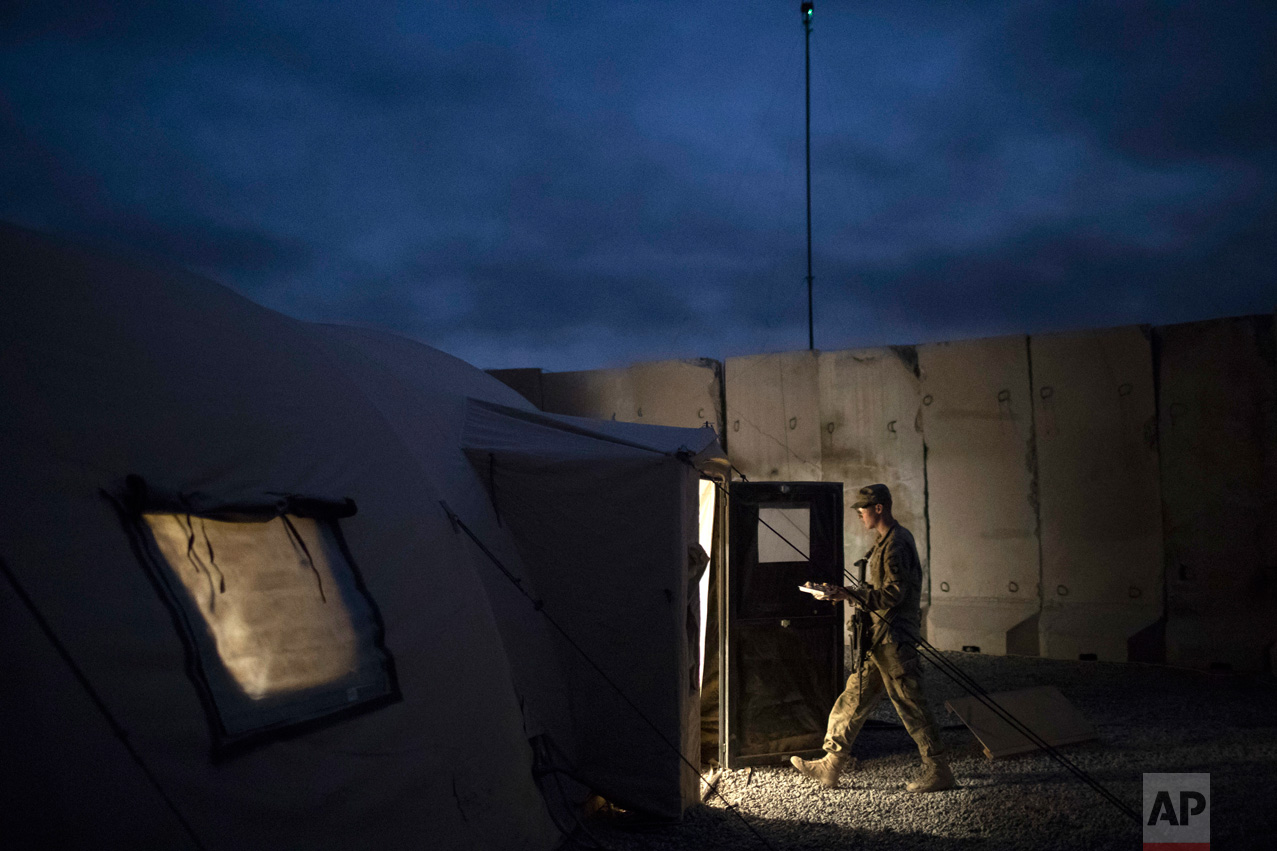
A U.S. Army soldier walks to a tent with his Thanksgiving dinner at a coalition air base in Qayara south of Mosul, Iraq, Thursday, Nov. 24, 2016. (AP Photo/Felipe Dana)






"2nd place has a some effective images but more variety would have made the package stronger." - NPPA Judges
Judges: Dean Guernsey/The Bulletin, Ryan Brennecke/The Bulletin, Andy Tullis/The Bulletin, Joe Kline/The Bulletin, Jarod Opperman/The Bulletin
New York International | November 2016 | 1st Place General News
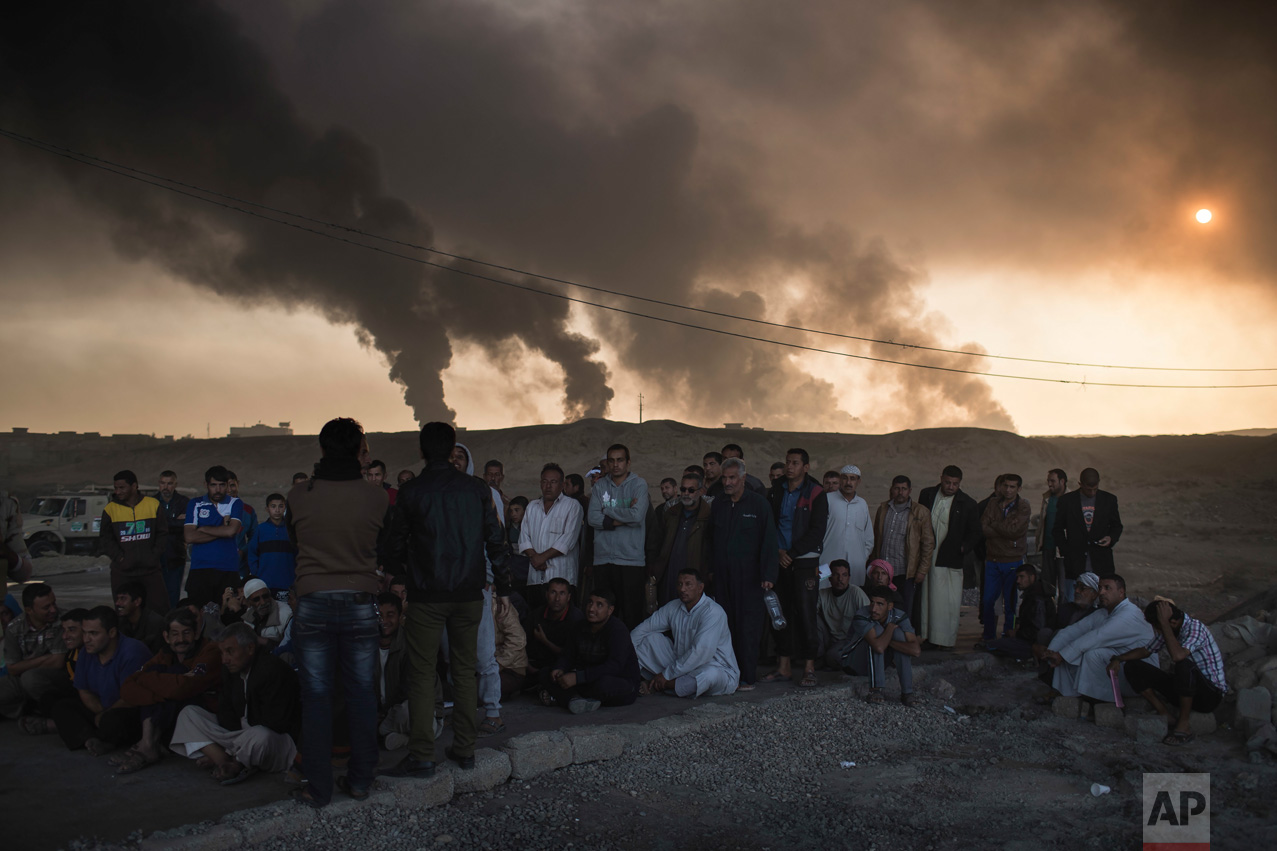
Men are held by Iraqi national security agents, to be interrogated at a checkpoint, as oil fields burn in Qayara, south of Mosul, Iraq, Saturday, Nov. 5, 2016. Islamic State fighters launch counterattacks in the thin strip of territory Iraqi special forces have recaptured in eastern Mosul, highlighting the challenges ahead as the battle moves into more densely populated neighborhoods where coalition air power must be used more selectively. (AP Photo/Felipe Dana)
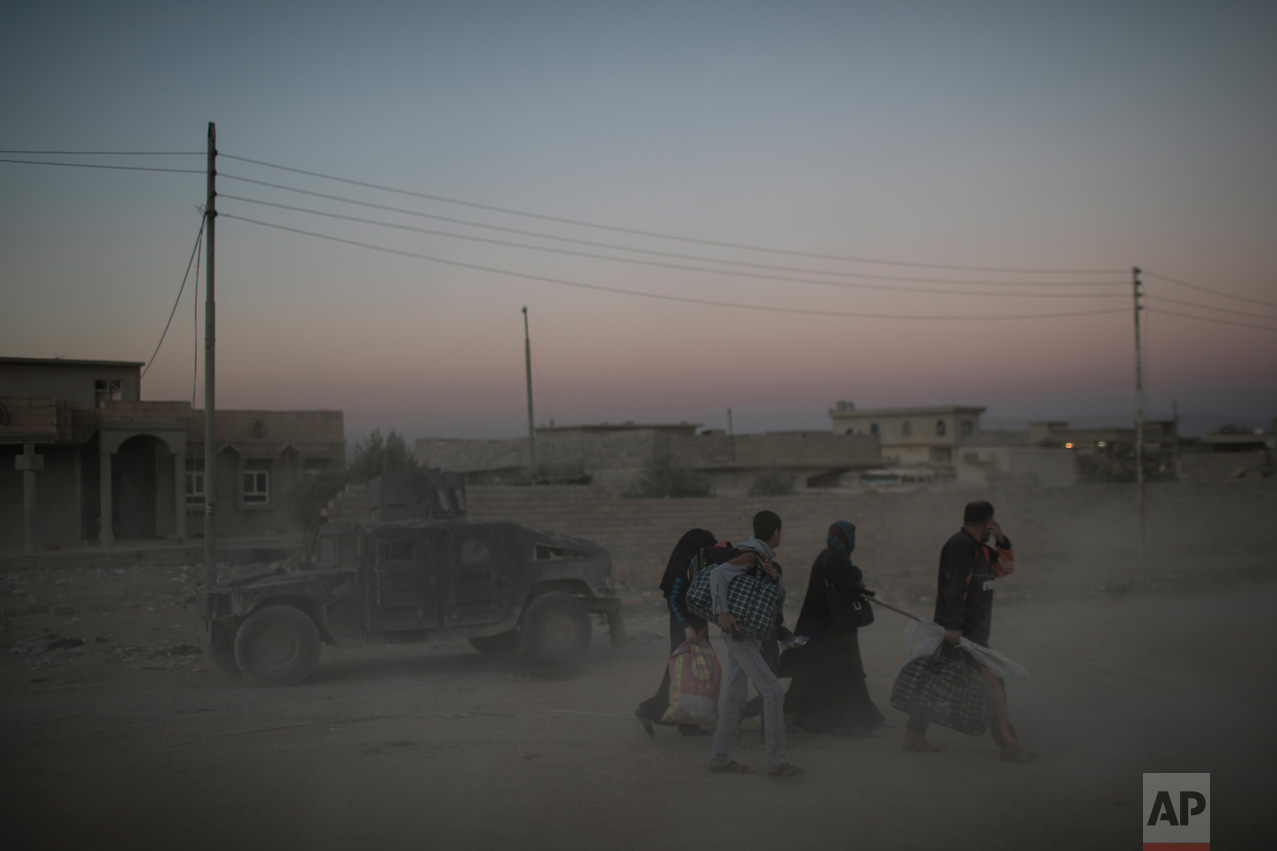
Iraqis flee fighting between Iraqi forces and Islamic State militants on a road in eastern Mosul, Iraq, Friday, Nov. 25, 2016. (AP Photo/Felipe Dana)
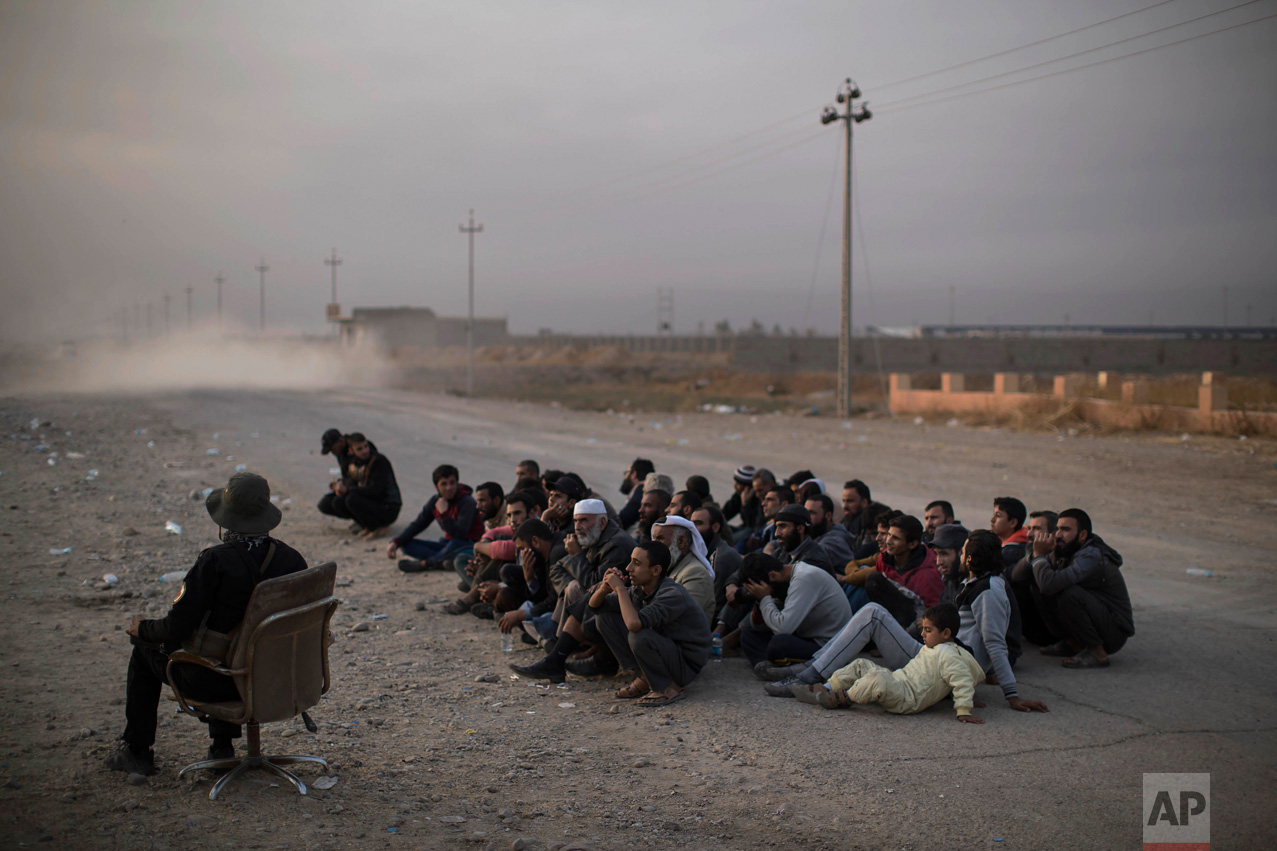
Internally displaced men sit as they wait for their documents to be checked after fleeing fighting between the Iraqi forces and Islamic State, at a checkpoint near Bartella, east of Mosul, Iraq, Monday, Nov. 14, 2016. (AP Photo/Felipe Dana)
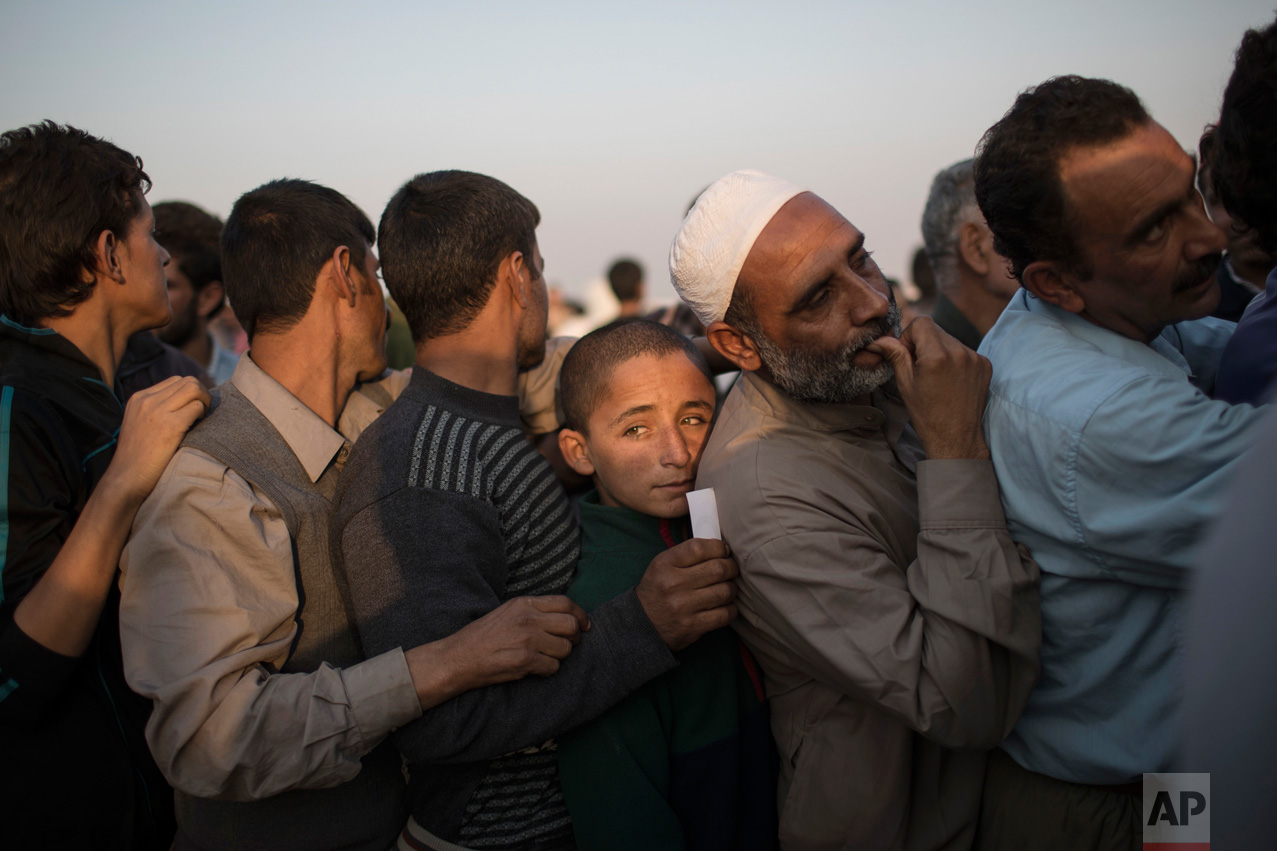
In this Tuesday, Nov. 8, 2016 photo, Iraqis displaced by fighting in Mosul line up for food distribution at a camp for internally displaced people in Hassan Sham, Iraq. As the operation to retake Mosul enters its second month Iraqi forces are preparing for prolonged, grueling urban combat as they slow the tempo of their operation, advancing just a few hundred meters at a time. The individual tactics employed by IS mirror past fights with the group, but the sheer scale of IS defenses and counterattacks in Mosul has overwhelmed Iraq’s military.(AP Photo/Felipe Dana)
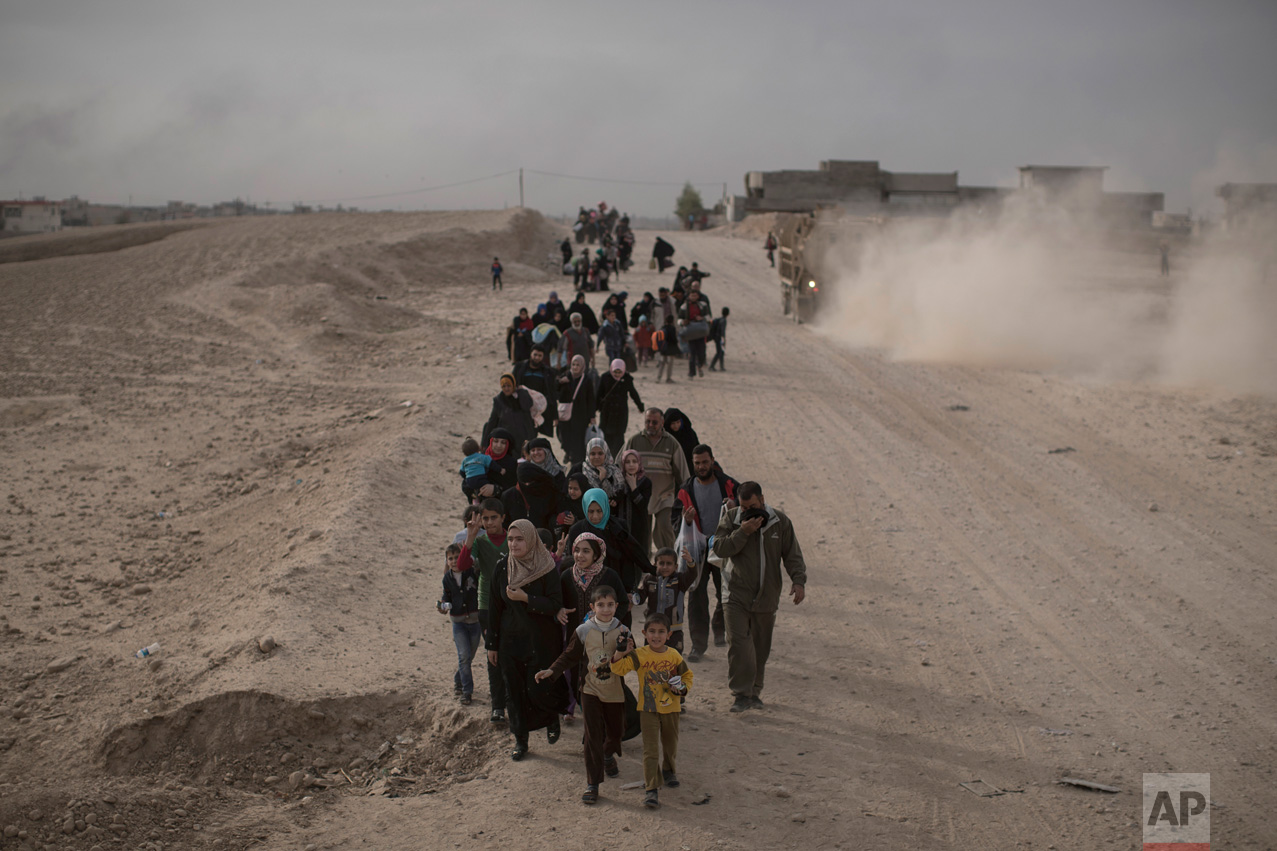
In this Nov. 15, 2016 photo, internally displaced people flee fighting between Iraqi forces and Islamic State militants on a road in eastern Mosul, Iraq. Six weeks into the battle for Mosul, the Iraqi government's 50,000-strong expedition is a long way from finishing the job. The Islamic State is tenaciously defending its last major foothold in Iraq. A million civilians remain inside the city, preventing the use of overwhelming firepower. Iraqi commanders are alarmed that the progress has been lopsided. The battle-seasoned special forces are slowly advancing inside Mosul while other military outfits remain bogged down outside the city. (AP Photo/Felipe Dana)
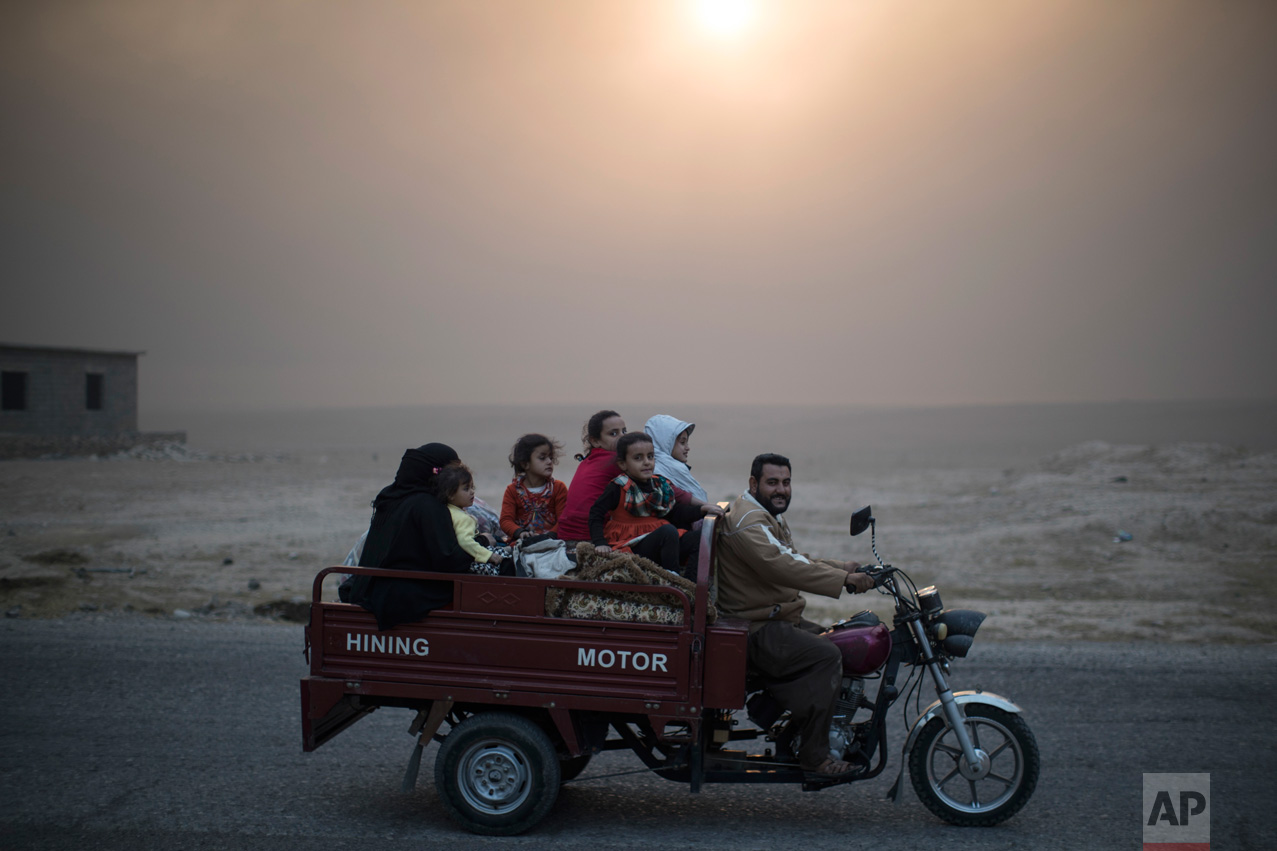
A displaced Iraqi family rides back to their home at the outskirts of Qayara, south of Mosul, Iraq, Thursday, Nov. 3, 2016. A senior military commander says more than 5,000 civilians have been evacuated from newly-retaken eastern parts of the Islamic State group-held city of Mosul and taken to camps. (AP Photo/Felipe Dana)
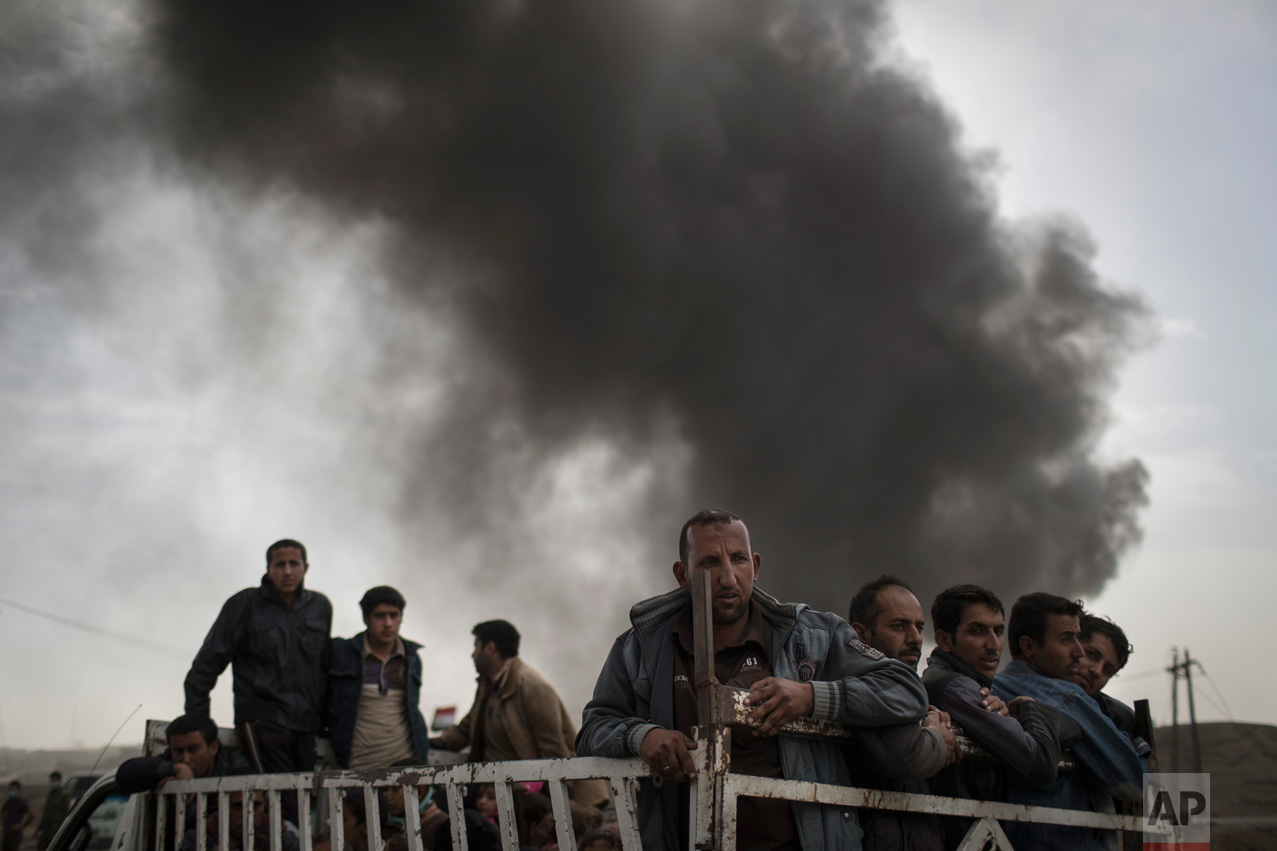
In this Tuesday, Nov. 1, 2016 photo, displaced people stand on the back of a truck at a checkpoint near Qayara, south of Mosul, Iraq. As the operation to retake Mosul enters its second month Iraqi forces are preparing for prolonged, grueling urban combat as they slow the tempo of their operation, advancing just a few hundred meters at a time. The individual tactics employed by IS mirror past fights with the group, but the sheer scale of IS defenses and counterattacks in Mosul has overwhelmed Iraq’s military. (AP Photo/Felipe Dana)
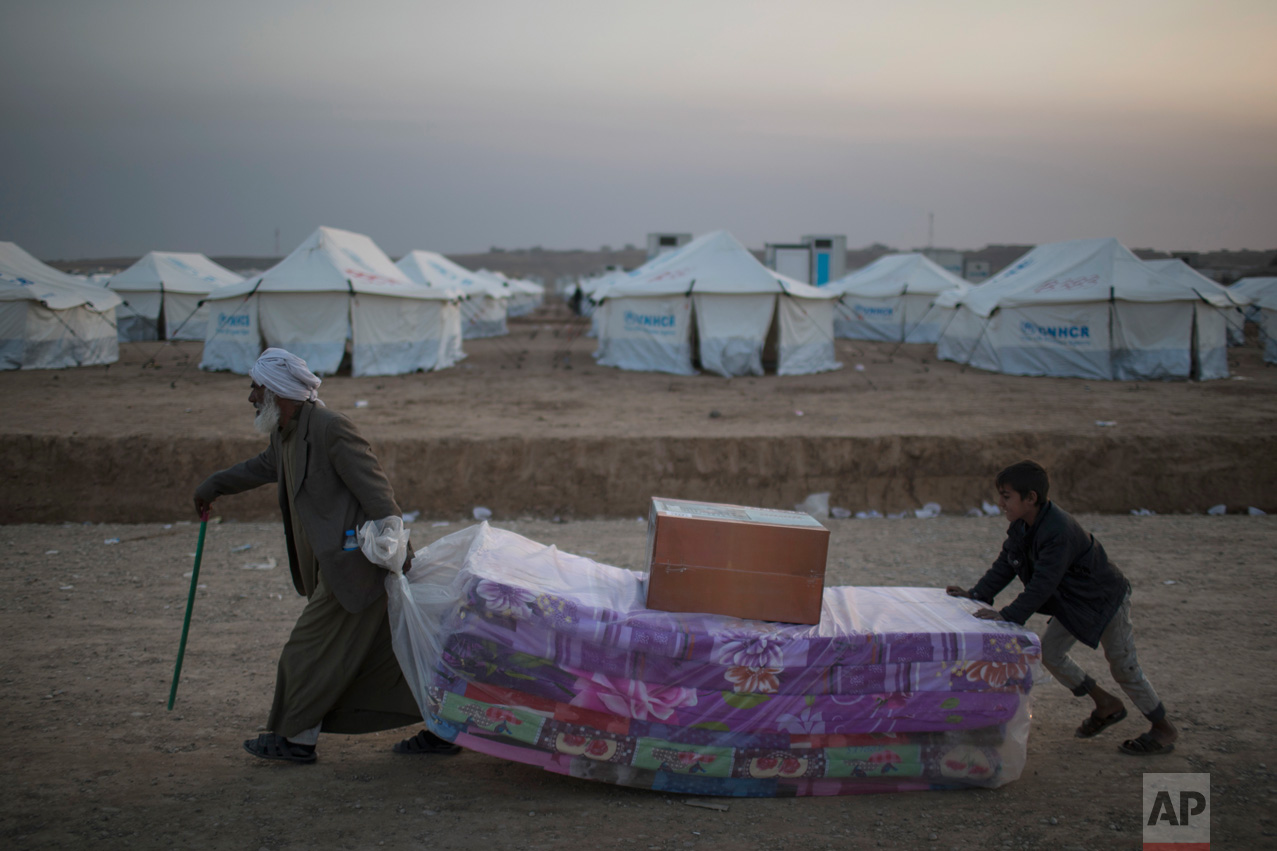
Iraqis displaced by fighting in Mosul carry mattresses at a camp for internally displaced people in Hassan Sham, Iraq, on Tuesday, Nov. 8, 2016. The United Nations says over 34,000 people have been displaced from Mosul, with about three quarters settled in camps and the rest in host communities. (AP Photo/Felipe Dana)
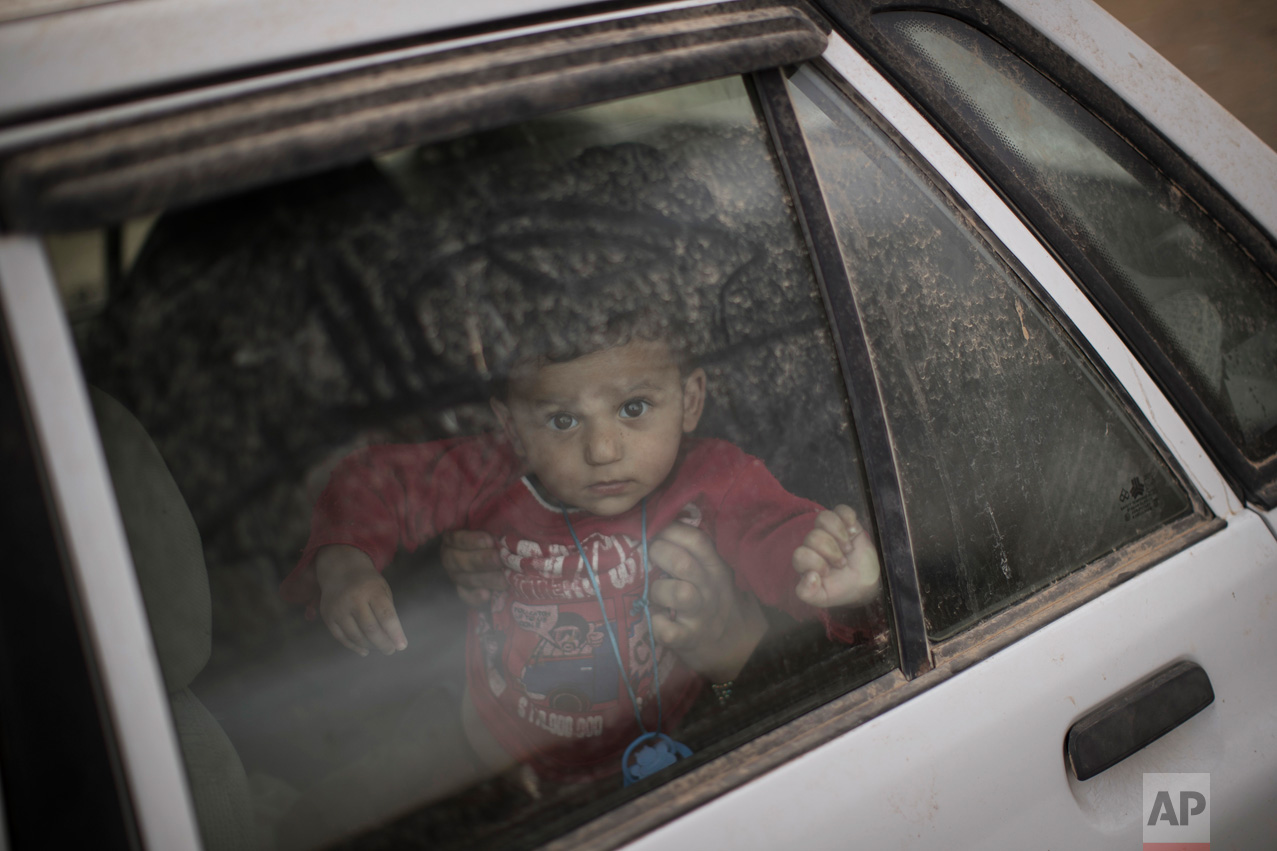
A boy looks out from a car window at a checkpoint near Qayara, south of Mosul, Iraq, Tuesday, Nov. 1, 2016. The U.N. human rights office is lauding efforts by the U.S.-led coalition in the battle against the Islamic State group in Mosul. The office in Geneva says coalition flights over Iraq have largely succeeded in preventing IS from bringing in 25,000 more civilians to the city center, where the militant group has been using people as human shields as Iraqi forces advance on Mosul. (AP Photo/Felipe Dana)
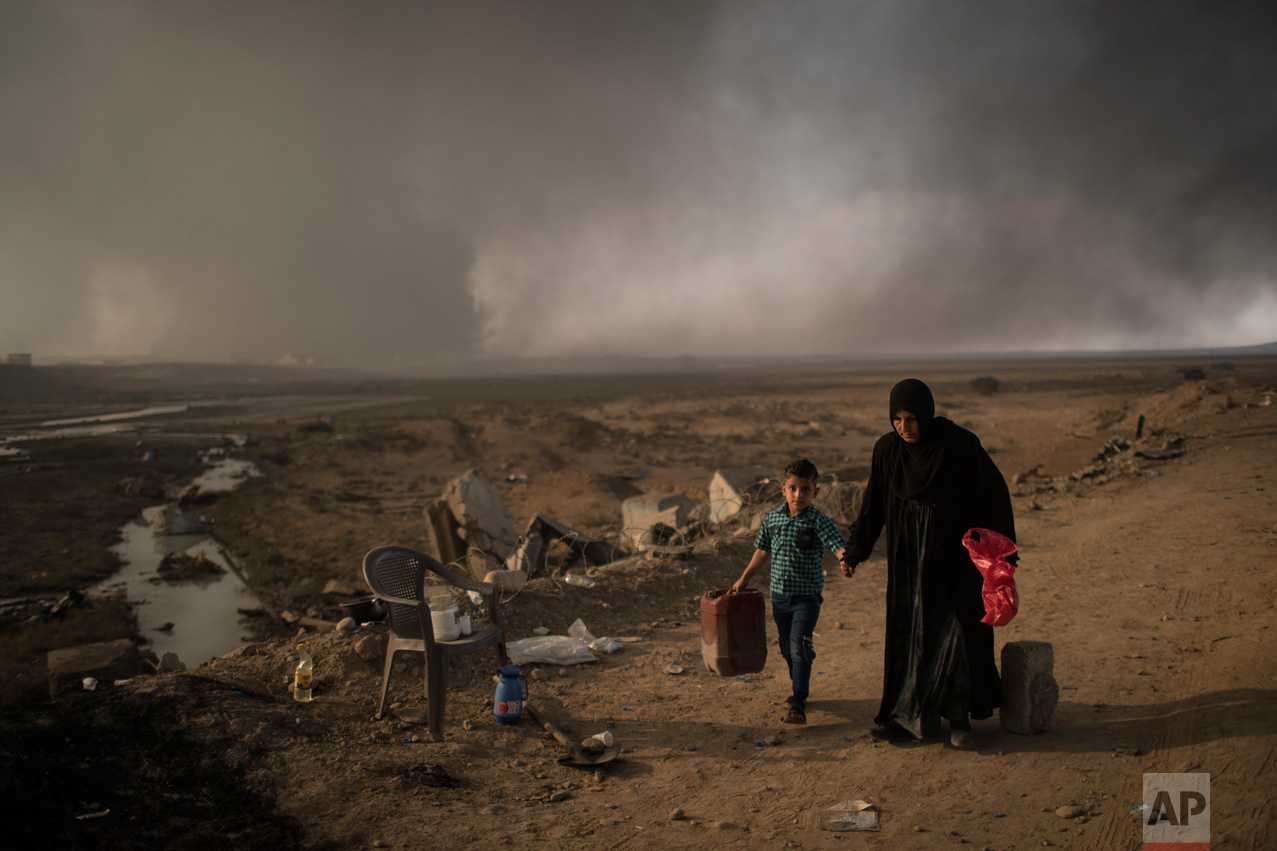
In this Sunday, Nov. 6, 2016 photo, displaced people walk past a checkpoint near Qayara, south of Mosul, Iraq. As the operation to retake Mosul enters its second month Iraqi forces are preparing for prolonged, grueling urban combat as they slow the tempo of their operation, advancing just a few hundred meters at a time. The individual tactics employed by IS mirror past fights with the group, but the sheer scale of IS defenses and counterattacks in Mosul has overwhelmed Iraq’s military. (AP Photo/Felipe Dana)










"2nd place has a some effective images but more variety would have made the package stronger." - NPPA Judges
Judges: Dean Guernsey/The Bulletin, Ryan Brennecke/The Bulletin, Andy Tullis/The Bulletin, Joe Kline/The Bulletin, Jarod Opperman/The Bulletin
New York | International | November 2016 | 3rd Place General News
"3rd place provides the viewer with a unique inside look at the reality of war." - NPPA Judges
Judges: Dean Guernsey/The Bulletin, Ryan Brennecke/The Bulletin, Andy Tullis/The Bulletin, Joe Kline/The Bulletin, Jarod Opperman/The Bulletin
Photos by Felipe Dana
Follow Felipe Dana on Instagram
Follow AP photographers on Twitter
Written content on this site is not created by the editorial department of AP, unless otherwise noted.

